Apr 29, 2015 | Non categorizzato, Word of
With the tenderness of mercy our love can give witness to the reality of God’s love. We experience what we share with others. When the Lord God appeared to Moses on Mount Sinai he declared his identity as: ‘The Lord, a God merciful and gracious, slow to anger, and abounding in steadfast love and faithfulness’ (Ex 34:6). To indicate the nature of this merciful love, the Hebrew Bible uses a word (raḥămîm) that recalls a mother’s womb, the place where life begins. By making himself known as ‘merciful’, God shows that for each thing he has made he is concerned as a mother is for her child. He cares, is near, protects, looks after his creature. The Bible uses a further term (ḥesed) to express other aspects of this love which is mercy: faithfulness, benevolence, goodness, solidarity. Mary in her Magnificat too sings of the Almighty’s mercy that is from generation to generation (see Lk 1:50). Jesus himself spoke to us of God’s love, revealing him as a ‘Father’ close and attentive to our every necessity, keen to pardon, to give all we need: ‘he makes his sun rise on the evil and on the good, and sends rain on the righteous and on the unrighteous’ (Mt 5:45). His love is truly ‘rich’ and ‘great’, as is said in the letter to the Ephesians that give us our Word of Life: ‘But God, who is rich in mercy, out of the great love with which he loved us even when we were dead through our trespasses, made us alive together with Christ.’ What Paul says here is almost a cry of joy born of the contemplation of the extraordinary thing God has done for us. We were dead and he revived us, giving us a new life. The words begin with ‘but’, indicating a contrast with what Paul pointed out earlier. This was the tragic condition of humanity crushed beneath its wrongdoing and sins, prisoner of selfish and wicked desires, under the influence of the powers of evil, in open rebellion against God. In this situation it would have deserved God’s wrath (see Eph 2:1-3). In contrast God, instead of punishing – hence Paul’s utter amazement – gives humanity life again. God does not let himself be governed by wrath, but by mercy and by love. Jesus had already suggested that God acts like this when he told the parable of the Prodigal Son, the younger brother who was welcomed back by his father with open arms after he had sunk into an inhuman life. It was the same with the parable of the Good Shepherd who goes in search for the lost sheep and puts it on his shoulders to bring it back home. And the same can be seen in the Good Samaritan who cares for the wounds of the man who had fallen into the hands of robbers (see Lk 15:11-32; 3-7; 10:30-37). God, a merciful father, symbolized in the parables, has not only forgiven us, but he has given us life itself in his son Jesus, that is, given us the fullness of divine life. And this leads to a hymn of gratitude: ‘But God, who is rich in mercy, out of the great love with which he loved us even when we were dead through our trespasses, made us alive together with Christ.’ This Word of Life ought to make us feel the same joy and gratitude as Paul and the first Christian community. To each one of us, too, God shows himself ‘rich in mercy’ and of ‘great love’, ready to forgive and grant trust again. There is no situation of sin, of suffering, of solitude, where he does not make himself present, does not come alongside us to go with us on our way, does not grant us trust, the possibility of rising up and the strength to start again. At his first ‘Angelus’, on 17 March two years ago, Pope Francis started speaking about the mercy of God, a theme that has become characteristic for him. At that time he said, ‘God’s face is the face of a merciful father who is always patient… he understands us, he waits for us, he does not tire of forgiving us.’ He ended that first brief greeting with the words, ‘He is the loving Father who always pardons, who has that heart of mercy for us all. And let us too learn to be merciful to everyone.’ This points to a practical way to live the Word of Life. If God for us is rich in mercy and of great love, we too are called to be merciful towards others. If he loves those who are bad, who are his enemies, we too ought to learn how to love those who are not ‘lovable’, even our enemies. Did not Jesus tell us, ‘Blessed are the merciful, for they will receive mercy’ (Mt 5:7)? Did he not ask us to be ‘merciful, just as your Father is merciful’ (Lk 6:36)? Paul too invites his communities, chosen and loved by God, to clothe themselves ‘with compassion, kindness, humility, meekness, and patience’ (Col 3:12). If we have believed in God’s love, we too can love in our turn with that love which makes us draw close to every situation of pain and need, that forgives all things, that protects, that knows how to look after the other person. Living in this way we will be able to give witness to God’s love and help those we meet discover that also for them God is rich in mercy and of great love. Fabio Ciardi
![PRESET Eco-sustainability Project in Argentina]()
Apr 28, 2015 | Focolare Worldwide
 Forty-two professionals of eight different countries in Europe and Latin America accepted the invitation. The event which was held in the Focolare’s Lia town at the outskirts of Buenos Aires, not only hosted the seminar (9-21 March) financed by the European Union, but was also subjected to the study for the creation of a sustainable management and development model of a sustainable place to live in. To coincide with these times when we feel the urgency of questioning ourselves on the environment and promoting the quest for new technologies – with the planet’s survival at stake – the initiative was joined by the group, “Dialogue in Architecture,” a network of scholars and experts of the sector, inspired by the spirituality of the Focolare, given the actuality of the theme.
Forty-two professionals of eight different countries in Europe and Latin America accepted the invitation. The event which was held in the Focolare’s Lia town at the outskirts of Buenos Aires, not only hosted the seminar (9-21 March) financed by the European Union, but was also subjected to the study for the creation of a sustainable management and development model of a sustainable place to live in. To coincide with these times when we feel the urgency of questioning ourselves on the environment and promoting the quest for new technologies – with the planet’s survival at stake – the initiative was joined by the group, “Dialogue in Architecture,” a network of scholars and experts of the sector, inspired by the spirituality of the Focolare, given the actuality of the theme.
By immersing themselves in the discovery of the territory and its structures, the youth started by studying the PRESET (“Participation, Resilience and Employability through Sustainability, Entrepreneurship and Training”), a study project promoted by the association Starkmacher – on the sustainability of the towns of the Focolare – and other partners such as the Fazenda da Esperança (Brazil), Fundación Unisol (Bolivia), New Humanity ((an NGO with Special Consultative Status within the Economic & Social Council of the United Nations) and Economy for tomorrow (Slovenia), and to work specifically on an integral eco-sustainable proposal for the town of Lia.
The youth participated in five thematic workshops guided by the value of fraternity as a lifestyle, and reached an integral eco-sustainable proposal (Ecocity Mariapolis) in which they involved all the inhabitants of the town, and also the youth of the district who attended for an afternoon to recount and speak of the environment.
 The EcoCity Mariapolis that will implement the proposal while respecting the history of the town and carrying out concrete dialogues with its inhabitants, created during the seminar, a biogas system for one of the houses of the town, and explained the procedure to make compost, a study for the installation of a photovoltaic system, for the insulation of the constructions in order to save energy and for the replacement of bulbs with Led lights and many more. This seemed to be a step by step growth in the education on the environment. A set of didactic handouts will be prepared for the inhabitants and the visitors of the Mariapolis, to be diffused also in schools through the Web.
The EcoCity Mariapolis that will implement the proposal while respecting the history of the town and carrying out concrete dialogues with its inhabitants, created during the seminar, a biogas system for one of the houses of the town, and explained the procedure to make compost, a study for the installation of a photovoltaic system, for the insulation of the constructions in order to save energy and for the replacement of bulbs with Led lights and many more. This seemed to be a step by step growth in the education on the environment. A set of didactic handouts will be prepared for the inhabitants and the visitors of the Mariapolis, to be diffused also in schools through the Web.
Also art was utilised for the efficacy of the proposal through the creation of a line of products (hair, hats, etc.) decorated with ethnic motifs and produced with ecologic material, and with a theatre performance connected to the theme.
A pleasant coincidence in those days was that the Dean of Sophia University Institute of Loppiano, Prof. Piero Coda, happened to be visiting the town and said: «I think this is not just a coincidence. Perhaps it is God’s design that is leading to something new, and creating a network of communion, work for solidarity and justice.»
Francesco from Udine gave a significant testimonial: «I work as an architect and am doing a Master’s in almost zero energy buildings. What I found most interesting in this workshop is the fact that people with diverse potentials and specializations are working together, and not only architects like us. I think this is the most enriching part for everyone: starting off with different potentials to reach a common objective which is that of sustainability, not only from the environmental but also from the economic and social points of view.»
Likewise Riccardo, an Italian architect, is convinced of the importance of working together: «I firmly believe that what I can do is but a small part, while together we could reach the objectives that will allow the entire society to exploit the resources well, and create satisfactory wellbeing for everyone including professionals. »
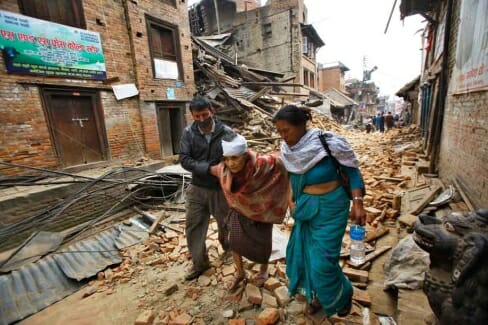
Apr 27, 2015 | Focolare Worldwide
 Some of our Nepalese friends wrote:«The situation is really bad. I myself am alive, but we have lived without a roof above our heads for days and nights. Many have died and others are dying, and many are wounded. Besides the rising number of victims according to the UNICEF estimates, 940 thousand children are at risk, and urgently need healthcare. The Focolare Movement joins the prayers for the people struck, their families, in their requests for consolation in this immense tragedy, and is making the move to gather funds. From Mumbai, where the youth of the Focolare have gathered to prepare for the United World Week – and among which there are three from Nepal – the group has launched an appeal to the Youth for a United World worldwide, to start up a support action for all the people struck by the calamity: «The United World Week – they wrote – may be an immediate occasion to concretely express our support.» Pope Francis, after praying during the Angelus for the victims of the earthquake, urging all to “give their fraternal support,” expressed in a message sent to the Apostolic Nunzio in Nepal, his own personal prayer and support for the Nepalese population. Caritas Nepal, in the meantime, has started up an action plan to face the emergency, but it needs a lot of backup. Tents and food are being distributed: the main problem at the moment is to offer a refuge, to protect the people from the cold and the rain.
Some of our Nepalese friends wrote:«The situation is really bad. I myself am alive, but we have lived without a roof above our heads for days and nights. Many have died and others are dying, and many are wounded. Besides the rising number of victims according to the UNICEF estimates, 940 thousand children are at risk, and urgently need healthcare. The Focolare Movement joins the prayers for the people struck, their families, in their requests for consolation in this immense tragedy, and is making the move to gather funds. From Mumbai, where the youth of the Focolare have gathered to prepare for the United World Week – and among which there are three from Nepal – the group has launched an appeal to the Youth for a United World worldwide, to start up a support action for all the people struck by the calamity: «The United World Week – they wrote – may be an immediate occasion to concretely express our support.» Pope Francis, after praying during the Angelus for the victims of the earthquake, urging all to “give their fraternal support,” expressed in a message sent to the Apostolic Nunzio in Nepal, his own personal prayer and support for the Nepalese population. Caritas Nepal, in the meantime, has started up an action plan to face the emergency, but it needs a lot of backup. Tents and food are being distributed: the main problem at the moment is to offer a refuge, to protect the people from the cold and the rain.
Funds can be deposited directly in the Youth for a United World special bank account: SAVINGS ACCOUNT OF THE CENTRAL SECRETARIAT OF THE YOUTH FOR A UNITED WORLD (GMU) Description: EMERGENCY NEPAL ACCOUNT NAME: PIA ASSOCIAZIONE MASCHILE OPERA DI MARIA Via Frascati 306, Rocca di Papa, 00040 Rome, Italy BANK NAME: BANCA PROSSIMA Piazza Paolo Ferrari 10 20121 Milan Italy IBAN CODE FOR NATIONAL AND INTERNATIONAL TRANSFERS: IBAN IT62 W033 5901 6001 0000 0113 348 BIC BCITITMX
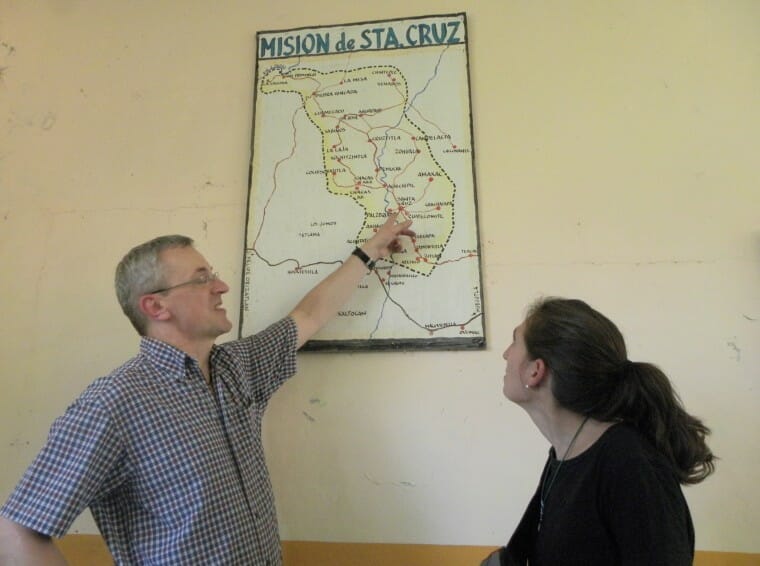
Apr 27, 2015 | Focolare Worldwide
 First time visitors to Santa Cruz de la Sierra are met by an unexpected scene: the exuberant and inviting natural environment, an unfamiliar language, the quite diverse local culture, the poverty, simplicity and endless generosity of the people.
First time visitors to Santa Cruz de la Sierra are met by an unexpected scene: the exuberant and inviting natural environment, an unfamiliar language, the quite diverse local culture, the poverty, simplicity and endless generosity of the people.
One group of young people and families from the Focolare decided to spend Holy Week in Santa Cruz with their friends from the Nahua. Due to the great pastoral need, the local Church gave permission to certain prepared laypeople to act as extraordinary ministers at the discretion of the pastors. They share what happened:
“The sun has just appeared over the horizon and the bus clambers along the mountain roads of east Sierra Madre, carrying 43 young people and families from the Focolare. The journey promises to be long and exciting; the tiredness goes unnoticed because of the great joy. At the road’s end there are brothers and sisters from 33 families of the Nahuas community ready to celebrate Holy Week with us.
Eight hours away from the City of Mexico we are welcomed into Santa Cruz by a generous and humble folk living in the heart of the huasteca hidalgeuense (unfading flower): a humid region with high temperatures, covered with cedar, ebony and mahogany wood trees.
At one of the mission parishes we split up into seven groups and go out to be with the people, to help with the liturgical services in seven communities where the seed of the spirituality of the Focolare has been growing for several years.
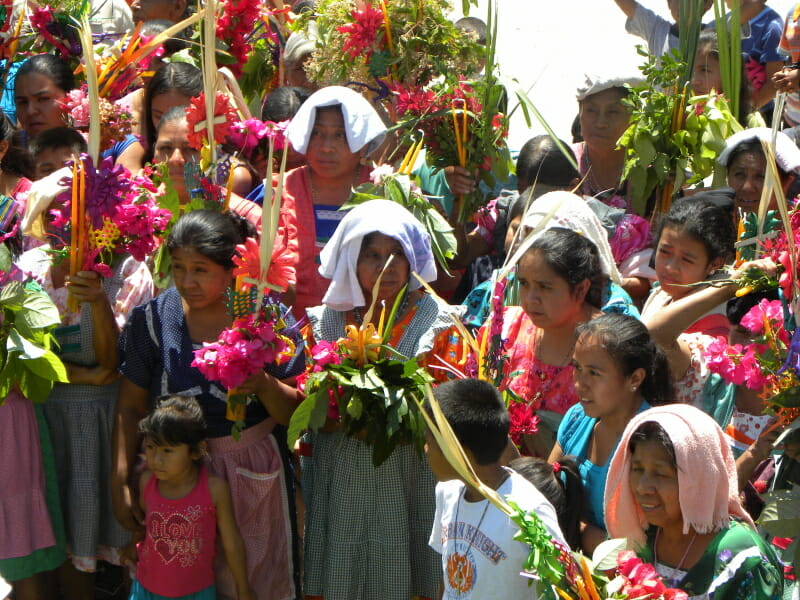 The encounter is overwhelming as the life, faith and bread begin to be shared. Several testimonies of Gospel life are shared, as well as small gift items. After the celebration of the washing of the feet, one of the young people exclaims: “It’s so fantastic to feel like a Christian!” One teenager said she had attended many missions, but “with Jesus among us it’s different; indeed, He’s the one who draws people and that’s why we wanted to attend the meetings and the liturgical celebrations.”
The encounter is overwhelming as the life, faith and bread begin to be shared. Several testimonies of Gospel life are shared, as well as small gift items. After the celebration of the washing of the feet, one of the young people exclaims: “It’s so fantastic to feel like a Christian!” One teenager said she had attended many missions, but “with Jesus among us it’s different; indeed, He’s the one who draws people and that’s why we wanted to attend the meetings and the liturgical celebrations.”
Amongst the many personal encounters, one particularly touched us: We visit an alone and elderly man, who has been immobile for a long time. The state of his hygiene is extremely poor. We bathe him and clean his tiny room; help him to prepare for receiving Jesus in the Eucharist, and give him Holy Communion. The next day, he dies.
Following a Holy Week of intense living and after having experienced mutual giving and receiving in simplicity and generosity, the moment arrives when we must return to Mexico City. During the return trip, many of us remember the words spoken by Chiara Lubich in the Basilica of Guadalupe in 1997: “Inculturation requires an exchange of gifts.”
Seeing the enthusiasm of the young misioneros and the members of the communities we visited, there is new hope that the Misión in Santa Cruz will not remain an isolated event, but the sign of a new beginning of a process of increased giving by the Focolare in Mexico.”
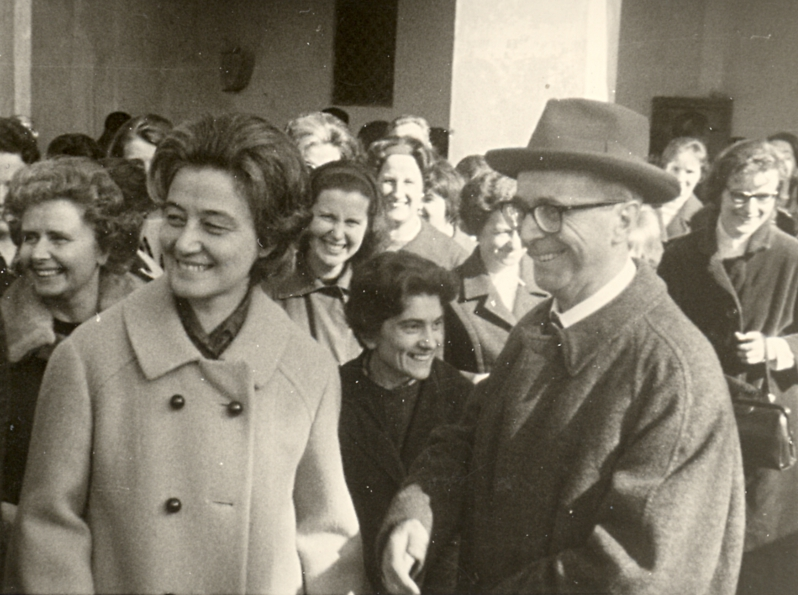
Apr 26, 2015 | Non categorizzato
 “This event, like all things of God, began from a humble seed. Silvia Lubich was the daughter of a wine merchant who the economic crisis of the Second World War had reduced to being a modest city worker. He was the husband of a housewife from Trent who, as a young woman, had worked in the print shop of Cesare Battisti. They were a Catholic couple like many others from Trent: simple and direct, without a lot of pretensions. They brought four children into the world, a boy, the firstborn, and three girls. The eldest daughter, Silvia, was born on January 22, 1920. They raised them all in the Catholic faith which since her infancy had shaped Silvia in a straightforward piety. It was straightforward in the sense that it did not allow any compromises: it didn’t allow her to divide her desire between God and the world; to think about good and evil; to show one thing while hiding another. There was God, and God was everything: so one had to belong totally to Him; to do His will like a ray of sun that leaped down from heaven to rest upon earth.” So begins the Story of Light, the story of Chiara Lubich written by one of the main protagonists of the events it describes: Igino Giordani, an eminent figure in Italian politics and culture, and also co-founder of the Focolare Movement. “It is never easy for a work to become a masterpiece,” Director of the Igino Giordani Centre, Alberto Lo Presti writes in the introduction to the first installment. “What then of a book that would contend for this position with a hundred other books written by Giordani? But Story of Light never saw the light. Not only that: it remained unknown even to those who have preserved it over the years. Giordani himself had asked them to wait – whereas most authors would have preferred the opposite; that is, to be recognized especially for their best works.” “Story of Light is not based on historiographic research. It could be described as a recounting of the miraculous intervention brought about by the Holy Spirit – visible in the person and actions of Chiara Lubich – in twentieth century history. In other words, it is comprised of a series of narrative portraits in which Chiara’s biographical sketch is intertwined with God’s plan for humankind, whose ideals had been afflicted and social systems divided and devastated by world wars. This is why, in the subtle interweaving of events in Story of Light, we recognize some of the basic elements in Giordani’s own complex personality. He experienced first-hand all the main dramatic events of the twentieth century, having been wounded in the war, having undergone exclusion because of his ideas, and having had to accept exclusion from civil society. He was a man of faith who worked both in Church and culture, aware that the radical evil would be defeated by a new Christian spirit that he set out to discover. He met Chiara Lubich in September 1948 and found in her the light he had been looking for. He followed her, placing at the disposal of the Focolare founder all of his intelligence and will. He never had doubts about the strength and pre-eminence of the figure of Chiara for the Church, society, current history, and the future. Therefore, even had he have wanted to, Giordani could never have written a complete, objective, methodologically flawless story of Chiara Lubich. His human and spiritual involvement could not allow him that.” “The author had written many volumes on great spiritual figures: Catherine of Siena, Ignatius of Loyola, Magdalene of Canossa, Contardo Ferrini, Francis of Paola, Vincent de Paul, Francis de Sales, Francis of Assisi, to mention a few of his works. They formed a gallery of extraordinary people from diverse times and backgrounds. The place of honor in this rich array was assigned to Chiara Lubich, whose story Giordani called his “masterpiece.” At the age of fifty four when history called him to meet Chiara, he did not enter into the relationship without a spiritual preparation. He knew how to measure the religious greatness of an ideal, just as he had the tools for testing the spiritual size and strength of a mystical intuition. For this reason . . .it is likely that Giordani felt a paramount duty of attesting to who Chiara really was. Moreover, he took on this particular role from the first moments of his visits with Chiara and the first small group of focolarine. With his learning, he was well able to reveal the importance and newness of the figure of Chiara to the young men and women who were her followers.” “Giordani lived through difficult moments during which Chiara Lubich and the Focolare were under the magnifying glass of the Congregation of the Holy Office. From that period – the 1950s – and for many years to come, a widespread attitude of prudent discretion was maintained around the figure of Chiara. It may have been necessary to hold back any sentiments of esteem and affection for Chiara, but for Giordani there was never any doubt that the truth about her had to be put in writing and handed on. Hence, Story of Light, his masterpiece.” Introduction to Story of Light (complete text) – Published by Nuova Umanità, gennaio-marzo 2015
“This event, like all things of God, began from a humble seed. Silvia Lubich was the daughter of a wine merchant who the economic crisis of the Second World War had reduced to being a modest city worker. He was the husband of a housewife from Trent who, as a young woman, had worked in the print shop of Cesare Battisti. They were a Catholic couple like many others from Trent: simple and direct, without a lot of pretensions. They brought four children into the world, a boy, the firstborn, and three girls. The eldest daughter, Silvia, was born on January 22, 1920. They raised them all in the Catholic faith which since her infancy had shaped Silvia in a straightforward piety. It was straightforward in the sense that it did not allow any compromises: it didn’t allow her to divide her desire between God and the world; to think about good and evil; to show one thing while hiding another. There was God, and God was everything: so one had to belong totally to Him; to do His will like a ray of sun that leaped down from heaven to rest upon earth.” So begins the Story of Light, the story of Chiara Lubich written by one of the main protagonists of the events it describes: Igino Giordani, an eminent figure in Italian politics and culture, and also co-founder of the Focolare Movement. “It is never easy for a work to become a masterpiece,” Director of the Igino Giordani Centre, Alberto Lo Presti writes in the introduction to the first installment. “What then of a book that would contend for this position with a hundred other books written by Giordani? But Story of Light never saw the light. Not only that: it remained unknown even to those who have preserved it over the years. Giordani himself had asked them to wait – whereas most authors would have preferred the opposite; that is, to be recognized especially for their best works.” “Story of Light is not based on historiographic research. It could be described as a recounting of the miraculous intervention brought about by the Holy Spirit – visible in the person and actions of Chiara Lubich – in twentieth century history. In other words, it is comprised of a series of narrative portraits in which Chiara’s biographical sketch is intertwined with God’s plan for humankind, whose ideals had been afflicted and social systems divided and devastated by world wars. This is why, in the subtle interweaving of events in Story of Light, we recognize some of the basic elements in Giordani’s own complex personality. He experienced first-hand all the main dramatic events of the twentieth century, having been wounded in the war, having undergone exclusion because of his ideas, and having had to accept exclusion from civil society. He was a man of faith who worked both in Church and culture, aware that the radical evil would be defeated by a new Christian spirit that he set out to discover. He met Chiara Lubich in September 1948 and found in her the light he had been looking for. He followed her, placing at the disposal of the Focolare founder all of his intelligence and will. He never had doubts about the strength and pre-eminence of the figure of Chiara for the Church, society, current history, and the future. Therefore, even had he have wanted to, Giordani could never have written a complete, objective, methodologically flawless story of Chiara Lubich. His human and spiritual involvement could not allow him that.” “The author had written many volumes on great spiritual figures: Catherine of Siena, Ignatius of Loyola, Magdalene of Canossa, Contardo Ferrini, Francis of Paola, Vincent de Paul, Francis de Sales, Francis of Assisi, to mention a few of his works. They formed a gallery of extraordinary people from diverse times and backgrounds. The place of honor in this rich array was assigned to Chiara Lubich, whose story Giordani called his “masterpiece.” At the age of fifty four when history called him to meet Chiara, he did not enter into the relationship without a spiritual preparation. He knew how to measure the religious greatness of an ideal, just as he had the tools for testing the spiritual size and strength of a mystical intuition. For this reason . . .it is likely that Giordani felt a paramount duty of attesting to who Chiara really was. Moreover, he took on this particular role from the first moments of his visits with Chiara and the first small group of focolarine. With his learning, he was well able to reveal the importance and newness of the figure of Chiara to the young men and women who were her followers.” “Giordani lived through difficult moments during which Chiara Lubich and the Focolare were under the magnifying glass of the Congregation of the Holy Office. From that period – the 1950s – and for many years to come, a widespread attitude of prudent discretion was maintained around the figure of Chiara. It may have been necessary to hold back any sentiments of esteem and affection for Chiara, but for Giordani there was never any doubt that the truth about her had to be put in writing and handed on. Hence, Story of Light, his masterpiece.” Introduction to Story of Light (complete text) – Published by Nuova Umanità, gennaio-marzo 2015
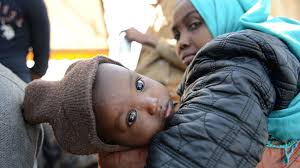
Apr 25, 2015 | Non categorizzato

Photo: Francesco Pecoraro/AP
![PRESET Eco-sustainability Project in Argentina]()
Apr 24, 2015 | Focolare Worldwide

Photo credit: WFP/Abeer Etefa
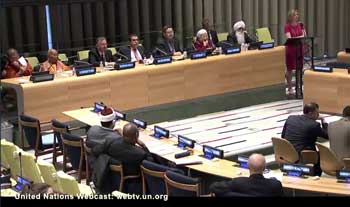
Apr 23, 2015 | Focolare Worldwide
Video of High-Level Thematic Debate
What are the religions in today’s world? Many see them as obstacles to peace, the residue of ages past that today are the cause of violent extremism. What would the world really be more peaceful without the religions? The High-Level Thematic Debate on Promoting Tolerance and Reconciliation suddenly became animated. The second day of the UN meeting offered some directives. During the opening address, Secretary General Ban Ki-moon proposed an advisory committee formed by the leaders of the world’s religions, to help the United Nations find solutions to the current conflicts, often between the followers of different religions. The plenary session that followed included testimonies from 15 religious leaders. All present agreed that religions should help to build peace, moving beyond mere tolerance to mutual acceptance, with the awareness that there are already people around the world who are already living like this in their daily lives. In her talk, Maria Voce recalled the long experience lived by the Focolare Movement: “The encounter between religions and cultures is an ongoing and fruitful experience that is not limited to tolerance, mere recognition of differences, and it goes beyond reconciliation, although that is fundamental, and it creates what could be called a new broader and shared common identity.” And this takes place in contexts that have been struck by serious crises, such as in Algeria, Syria, Iraq, Lebanon, the Democratic Republic of the Congo, Nigeria and the Philippines. 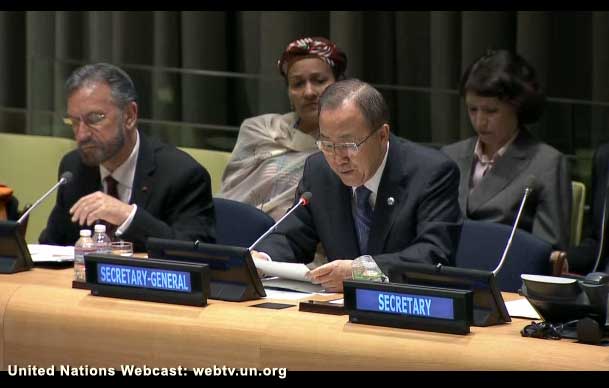 In response to the challenges and to the violence, she proposed an “extremism in dialogue,” that is, a dialogue requiring maximum engagement “that is risky, demanding, challenging, that aims at severing the roots of misunderstanding, fear and resentment.” Then she invited all to aim for a “a universal civilization that leads all peoples to consider themselves part of “civilization of alliance; a universal civilization which enables peoples to see themselves as part of a great happening, which is both varied and fascinating, that is humankind’s journey towards unity. She invited the UN to rethink its own calling, to reformulate its mission in order to be “an institution which truly works towards unity among nations, while respecting their strong identities.” According to Maria Voce, to say that religions are the cause of the tensions is to have a too restricted vision of the situation. What we are witnessing in many areas of the world, from the Middle East to Africa, has very little to do with religion, but has much to do with the structures marked by the culture war. From any point of view, in these cases we should not speak so much about wars of religion but more concretely, realistically and prosaically, about the religion of war. Everyone was in agreement: religions lead to peace, if not, they are instrumentalised for other ends. And so the vocation of religions is clearly stated: The Golden Rule, the foundational inspiration of all religions, which unites them, the idea of one universal human family.
In response to the challenges and to the violence, she proposed an “extremism in dialogue,” that is, a dialogue requiring maximum engagement “that is risky, demanding, challenging, that aims at severing the roots of misunderstanding, fear and resentment.” Then she invited all to aim for a “a universal civilization that leads all peoples to consider themselves part of “civilization of alliance; a universal civilization which enables peoples to see themselves as part of a great happening, which is both varied and fascinating, that is humankind’s journey towards unity. She invited the UN to rethink its own calling, to reformulate its mission in order to be “an institution which truly works towards unity among nations, while respecting their strong identities.” According to Maria Voce, to say that religions are the cause of the tensions is to have a too restricted vision of the situation. What we are witnessing in many areas of the world, from the Middle East to Africa, has very little to do with religion, but has much to do with the structures marked by the culture war. From any point of view, in these cases we should not speak so much about wars of religion but more concretely, realistically and prosaically, about the religion of war. Everyone was in agreement: religions lead to peace, if not, they are instrumentalised for other ends. And so the vocation of religions is clearly stated: The Golden Rule, the foundational inspiration of all religions, which unites them, the idea of one universal human family.  In the roundtable at the afternoon plenary, which was moderated by BBC’s, Laura Trevelyan, Rabbi David Rosen asked why so many young people feel drawn to extremism: “Perhaps because they are searching for their own identity, or for some meaning in life.” “You normally do not mention God at the United Nations,” Rabbi Arthur Schneier dared to remark: “How are we to deal with this problem – that the UN has to be neutral – when 5 of the 7 billion people on this earth belong to a religion?” For Bhai Sahib Mohinder Singh, Sikh from Birmingham: “God is omnipresent, in each one of us, therefore you cannot say that God is not here.” Maria Voce: “You speak of God when you speak of justice, sharing all the goods of the earth, sustainable development; you speak of God when you think of what we are preparing for the future generations. This is speaking of God. It is not necessary to speak of him in the abstract.” How can we preserve the integrity of interreligious dialogue? Are the religious leaders here renouncing something by coming here to the UN to talk about resolving conflicts? “I’m not renouncing anything,” affirmed Maria Voce. “I’ve come out of love, thinking about bringing my contribution of love to humanity. I’ve felt enriched by this possibility.” She concluded with a glance towards the new generations: “Returning home, what I will do will be to support the activities of the young and the very young, because I believe in their prophetic power.” Then she gave the floor to Ermanno Perotti, a young Italian had accompanied her on her visit to the United States. The twenty five year-old, with a Master’s Degree in Development Economics, used the occasion to present the l’Atlas of Universal Fraternity, a dossier of projects that promote universal fraternity in all corners of the world. Maria Voce added: “With the hope that one day even these ‘fragments of fraternity’ can be presented to the United Nations,” and that the United Nations will gather them. With this vision it becomes clear that religions have a great opportunity, but also a great task: to build peace and respond to the challenges with “extreme dialogue” rather than closing in on their own group. Susanne Janssen, New York
In the roundtable at the afternoon plenary, which was moderated by BBC’s, Laura Trevelyan, Rabbi David Rosen asked why so many young people feel drawn to extremism: “Perhaps because they are searching for their own identity, or for some meaning in life.” “You normally do not mention God at the United Nations,” Rabbi Arthur Schneier dared to remark: “How are we to deal with this problem – that the UN has to be neutral – when 5 of the 7 billion people on this earth belong to a religion?” For Bhai Sahib Mohinder Singh, Sikh from Birmingham: “God is omnipresent, in each one of us, therefore you cannot say that God is not here.” Maria Voce: “You speak of God when you speak of justice, sharing all the goods of the earth, sustainable development; you speak of God when you think of what we are preparing for the future generations. This is speaking of God. It is not necessary to speak of him in the abstract.” How can we preserve the integrity of interreligious dialogue? Are the religious leaders here renouncing something by coming here to the UN to talk about resolving conflicts? “I’m not renouncing anything,” affirmed Maria Voce. “I’ve come out of love, thinking about bringing my contribution of love to humanity. I’ve felt enriched by this possibility.” She concluded with a glance towards the new generations: “Returning home, what I will do will be to support the activities of the young and the very young, because I believe in their prophetic power.” Then she gave the floor to Ermanno Perotti, a young Italian had accompanied her on her visit to the United States. The twenty five year-old, with a Master’s Degree in Development Economics, used the occasion to present the l’Atlas of Universal Fraternity, a dossier of projects that promote universal fraternity in all corners of the world. Maria Voce added: “With the hope that one day even these ‘fragments of fraternity’ can be presented to the United Nations,” and that the United Nations will gather them. With this vision it becomes clear that religions have a great opportunity, but also a great task: to build peace and respond to the challenges with “extreme dialogue” rather than closing in on their own group. Susanne Janssen, New York
Video of Round Table Debate: http://webtv.un.org/high-level-thematic-debate Press Release Press Area
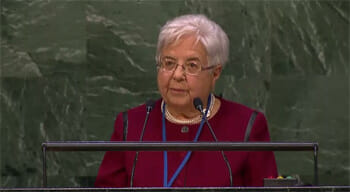
Apr 22, 2015 | Focolare Worldwide

To risk your own life so as to relieve the suffering of the poor. This was Maria Voce’s invitation as she spoke of the last terrible phase of the Second World War, when in 1943 “a group of young women got together in the small city of Trent in northern Italy. While their city was being bombed, those young people, who were guided by a young teacher named Chiara Lubich, and urged on by a new understanding of the radical nature of Gospel love, decided to risk their lives to relieve the suffering of the poor.”
A choice many people make today too, helping to regenerate the fabric of society: Maria Voce referred to the refugee camps in Lebanon, Syria, Jordan and Iraq; the slums surrounding some huge cities and the united strength of those who “introduce into the destructive cycle of conflict a commitment to regenerate the fabric of society, by doing – according to the vocabulary of this organization would say – peace-building action”. She affirmed: “Those young women decided to break the vicious circle of violence by responding with attitudes and actions which in the atmosphere of conflict might have seemed unrealistic or even irrelevant. However, they were not and they are not!”
“Today too we are experiencing very serious political, institutional, economic and social breakdown, which requires equally deep-seated responses, able to change the prevailing paradigm. It seems that conflict and violence prevail in many parts of the world, affecting innocent people, guilty only of being in disputed territory, or belonging to a particular ethnicity or adhering to a specific religion.”
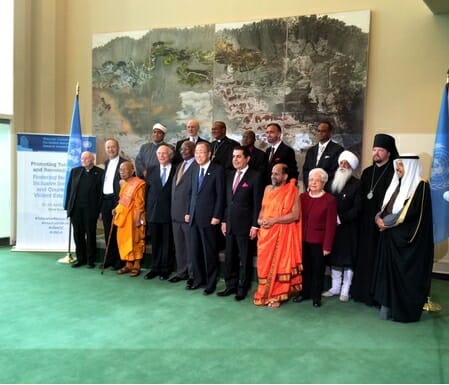 The encounter between cultures forms a new identity: “In the Focolare Movement, which I have the honour to represent – Maria Voce said – the encounter between cultures and religions (Christianity, Islam, Judaism, Buddhism, Hinduism and Traditional Religions) is an ongoing and fruitful experience not confined to tolerance or the mere recognition of diversity. It goes beyond reconciliation, essential as that is, to create, so to speak, a new identity, one that is broader, more general and shared. It is an effective dialogue which brings together people of very different beliefs, including non-religious beliefs. It spurs us to see what the real needs are and to respond together to the most difficult challenges in society, culture, economics and politics, as our commitment to a more united and socially inclusive world. This is happening in places which have been or are at present characterized by very serious crises, such as Algeria, Syria, Iraq, Lebanon, the Democratic Republic of Congo, Nigeria and the Philippines.”
The encounter between cultures forms a new identity: “In the Focolare Movement, which I have the honour to represent – Maria Voce said – the encounter between cultures and religions (Christianity, Islam, Judaism, Buddhism, Hinduism and Traditional Religions) is an ongoing and fruitful experience not confined to tolerance or the mere recognition of diversity. It goes beyond reconciliation, essential as that is, to create, so to speak, a new identity, one that is broader, more general and shared. It is an effective dialogue which brings together people of very different beliefs, including non-religious beliefs. It spurs us to see what the real needs are and to respond together to the most difficult challenges in society, culture, economics and politics, as our commitment to a more united and socially inclusive world. This is happening in places which have been or are at present characterized by very serious crises, such as Algeria, Syria, Iraq, Lebanon, the Democratic Republic of Congo, Nigeria and the Philippines.”
The Focolare President dispensed with half measures. “If violent extremism exists – she stated – (…) our response must be similarly radical, but one that is structurally different, by which I mean “extremism in dialogue”! A dialogue which requires the highest level of engagement, which is risky, demanding, challenging and which aims to sever the roots of incomprehension, fear and bitterness.”
The civilisation of alliance: referring to the United Nations “Alliance of Civilizations”, one of the promotors of this event, Maria Voce asked “whether, nowadays, we could get closer to the roots of this new outlook and focus not only on an alliance of civilizations but on what might be called the “civilization of alliance”; a universal civilization which enables peoples to see themselves as part of a great happening, which is both varied and fascinating, that is humankind’s journey towards unity. A civilization which makes dialogue the pathway to recognizing each other as brothers and sisters, as free and equal.”
Among the many organisations represented at the debate, she mentioned New Humanity, the NGO which represents the Focolare Movement at the UN; and regarding the United Nations Organization itself she posed the question:
“Shouldn’t the United Nations Organization perhaps reconsider its own vocation, and reformulate its own fundamental mission? What does being a “United Nations” organization mean today, if not an institution which truly works towards unity among nations, while respecting their strong identities? It is certainly essential to actively maintain international security but, although security is vital, it is not necessarily the same thing as peace.
Conflicts within nations and international conflicts; the deep divisions we are aware of at world level, together with the great local and global injustices, in fact require a true conversion in the actions and choices made in the field of global governance, to put into practice the motto formulated by Chiara Lubich, and launched in this very place in 1997, “love your neighbor’s country as your own” so as to build up universal fraternity.
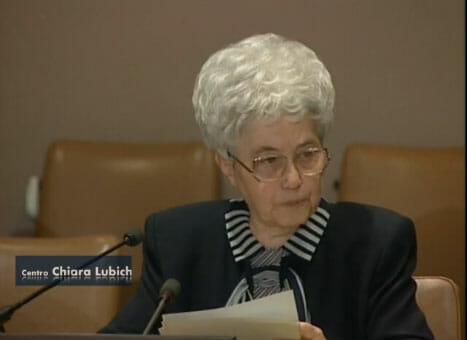
Chiara Lubich: “Toward a Unity of Nations and a Unity of Peoples” – United Nations Headquarters (New York), 28 May 1997
War is irreligion: “Lastly, we cannot give ground to those who attempt to describe current conflicts as “wars of religion” – Maria Voce went on. “War is by definition irreligion. Militarism, economic dominance and intolerance at all levels are causes of conflict, together with many other social and cultural factors among which religion is often only an unfortunate pretext. What we are witnessing in many areas of the world, from the Middle East to Africa, including the tragic deaths of hundreds of people fleeing wars who are shipwrecked in the Mediterranean, has very little to do with religion. From any point of view, in these cases we should not speak so much about wars of religion but more concretely, realistically and prosaically, about the religion of war.
What can be done? Quoting Chiara Lubich, Maria Voce invited the audience to have the courage to “invent peace”. “There are many signs that a new awareness may finally emerge, out of this serious international situation, of the need to work together for the common good, (…) and with the courage to ‘invent peace’. The time for ‘holy wars’ is over. War is never holy, it never has been. God does not want it. Only peace is truly holy because God himself is peace.”
She ended with reference to the Golden Rule which reflects the foundational inspiration of religions and unites them, so that they should “not [be] a tool used by other powers, even for the noblest aims; or precepts studied so as to resolve conflicts or crises, but rather a spiritual process which can be lived and becomes a community able to share and give meaning to the joys and sufferings of people today, channelling everything towards the realization of one universal human family.”
Read the full text
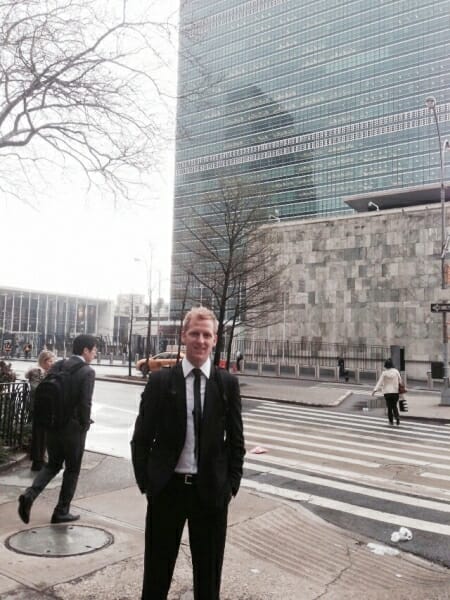
Apr 22, 2015 | Focolare Worldwide
 The UN headquarters with the thousands of people who work there, heads of state and other VIPs, going there would be a dream for many people. Ermanno Perotti, a 25-year-old student of economics and development is there now, but not as one of the many visitors who wander along the endless corridors with their guide. He was asked to accompany Maria Voce, President of the Focolare Movement who had been invited, as one of the religious leaders to speak during the High Level Debate on “Promoting Tolerance and Reconciliation: Fostering peaceful, Inclusive Societies and Countering Violent Extremism.”
The UN headquarters with the thousands of people who work there, heads of state and other VIPs, going there would be a dream for many people. Ermanno Perotti, a 25-year-old student of economics and development is there now, but not as one of the many visitors who wander along the endless corridors with their guide. He was asked to accompany Maria Voce, President of the Focolare Movement who had been invited, as one of the religious leaders to speak during the High Level Debate on “Promoting Tolerance and Reconciliation: Fostering peaceful, Inclusive Societies and Countering Violent Extremism.”
The impression of Perotti is shared by many: the representative of each nation gives his or her contribution, many beautiful words and positive initiatives – but they seem almost isolated and each one appears to see this meeting as a platform to promote their own ideas. But what I find a bit hard to digest is that they don’t really listen to one another. But what does attract me is to see their efforts to fill this emptiness with true listening and dialogue. With this vision that he learnt from the life of the young people of the Focolare, he understood the attraction of taking on a commitment in politics so as to bring about truer relationships.
However, on the subject of how to prevent violence and fanaticism, almost all the speakers were in agreement, that there is no other way but dialogue among cultures. “I would love to run a school on dialogue right here at the UN” says Perotti. In fact 90% of the speakers emphasised the need for education and many spoke of the need to give women a voice and to fight against poverty.
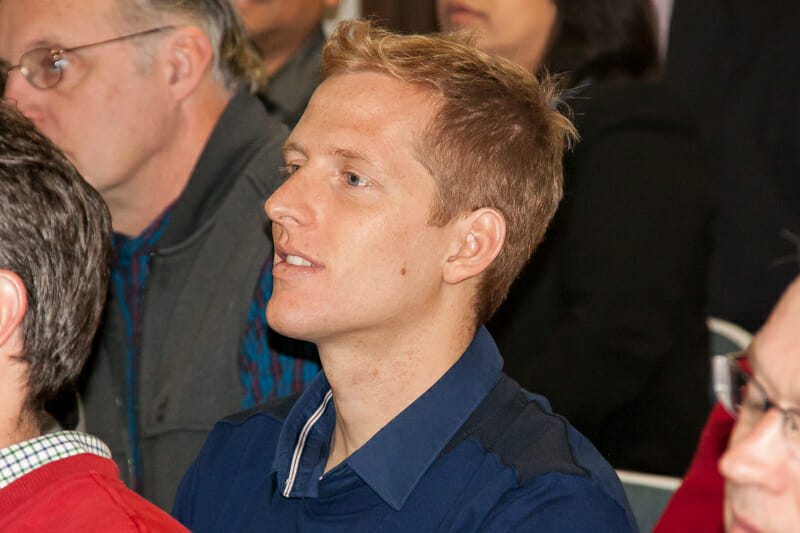
Ermanno Perotti
Many spoke of the hope they have in young people and we have to start there. Perotti wasn’t completely happy: “It’s always adults who speak about young people, where are the young people who speak about the young people?” He thinks his generation is already prepared for a multicultural future: “I grew up with this idea. In my class there are people of 10 different nationalities and 4 religions. We can show the world how we live in a spontaneous way in our daily lives.”
Today is the high point for him, to be part of a panel at the UN. Ermanno Perotti is not worried at all: “Speaking with Maria Voce we were saying that we wanted to live these days first of all as an experience of God. Today too at the UN will be an experience of God. As some of the speakers said today. In the end everything is summed up in the Golden Rule which means love of neighbor. So going there with the President, it’s simple because you go to love, to be one body with all the young people in the world”.
Susanne Janssen, New York
Live streaming at http://webtv.un.org/live/

Apr 21, 2015 | Focolare Worldwide
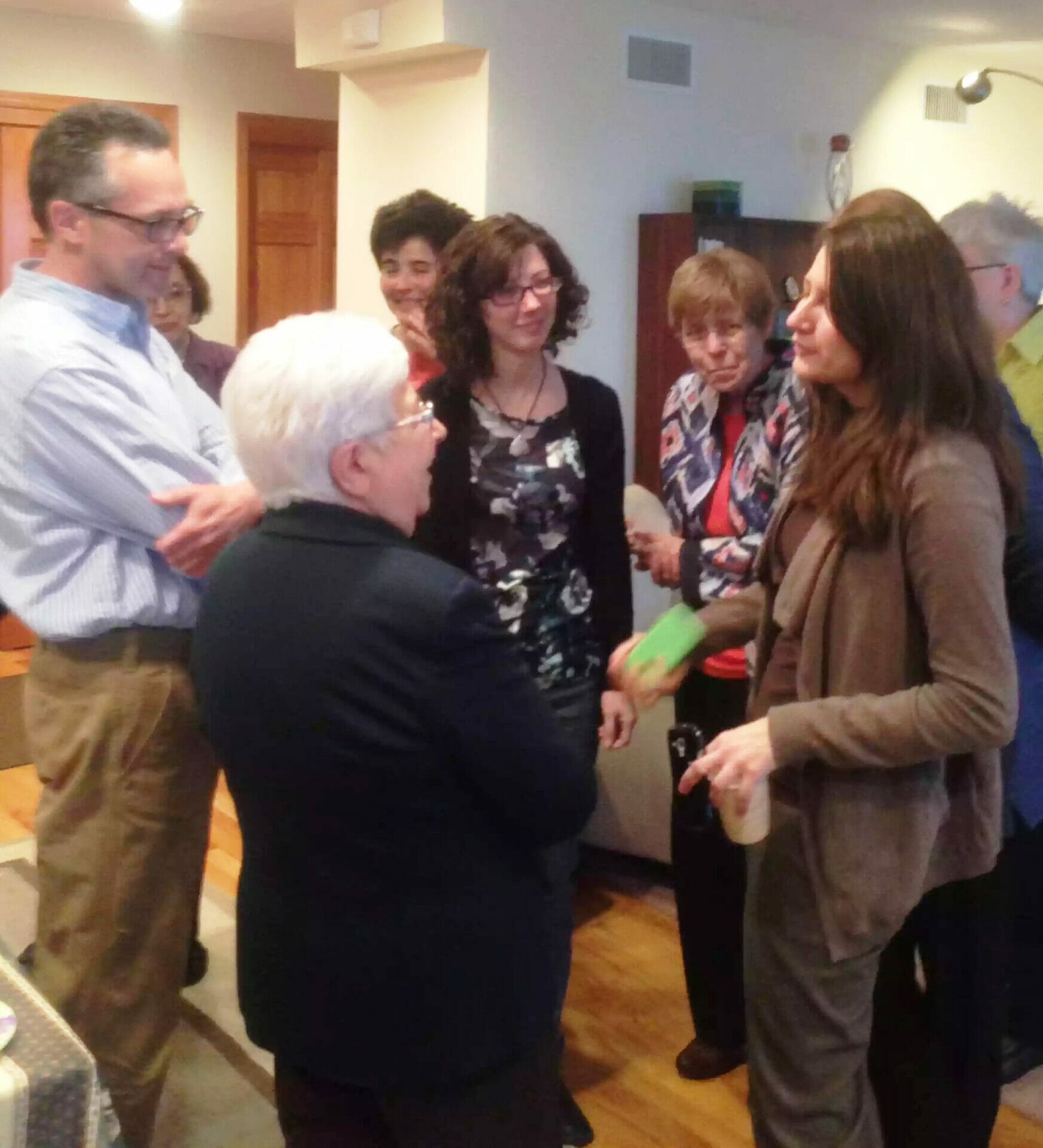 Today marks the beginning of the debate of the United Nations: “Promoting Tolerance and Reconciliation: Fostering peaceful, Inclusive Societies and Countering Violent Extremism”. Among the religious leaders invited to give their contribution is Maria Voce, President of the Focolare Movement. We asked her three questions before she entered the headquarters of the UN.
Today marks the beginning of the debate of the United Nations: “Promoting Tolerance and Reconciliation: Fostering peaceful, Inclusive Societies and Countering Violent Extremism”. Among the religious leaders invited to give their contribution is Maria Voce, President of the Focolare Movement. We asked her three questions before she entered the headquarters of the UN.
How do you feel before participating in this high level debate with representatives of 193 nations?
«I am quite at peace. What is often missing in these organizations is precisely the witness of what is already happening to bring about peace. My impression is that people often feel isolated and they need to be aware that someone else is out there with them, working for the same aims as they are. With such a great ideal as the one Chiara Lubich has given us, we do not work only for reconciliation or only for social justice but these are steps on the way towards unity».
If we look at the world today some might think that religions are the bearers more of division than of peace…
«Certainly religions are not supporters of war, none of them. The word religion means bond, it’s a bond between people, how can a religion make war? War is born in the hearts of people and people, whatever religion they belong to can be good or wicked. Instead religion is often exploited under the pretext of justifying a motivation that is anything but religious and is in fact inhuman, the desire for power, overthrowing the weak, selling one’s own merchandise including arms. The root of war certainly doesn’t lie in religion but in other motivations which are basically always egoistic».
When we look at today’s conflicts, for example in the Middle East or in Nigeria, are you still optimistic that peace is possible?
«I cannot help being an optimist because Jesus is peace. And since we follow Jesus we have to believe that peace is possible. It is true that Jesus said ‘I have come to bring the sword’ which means we have to take a stand too. I think that religions can help to reawaken the conscience of humanity: peace isn’t just one good among many but without peace all the other goods are useless. We can work for peace if we do it all together, both the rich and the poor, those who have power and those who do not, people who are religious as well as those who do not identify themselves with any religion. We have to commit ourselves to building these relationships of peace in the whole human family where we are all equal and therefore we should all witness to this equality».
The initiative for this high level debate at the United Nations in New York came from the President of the General Assembly, Sam Kutesa, the Secretary General Ban Ki Moon and the High Representative of the Alliance of Civilizations Nassir Abdulaziz Al-Nasser. Today’s topic is Strategies for fostering inclusive societies. Tomorrow, leaders representing various religions will be invited to give their witness to the role played by religions in building bridges of tolerance and reconciliation.
Susanne Janssen, New York
You can follow parts of the program on live streaming of the United Nations’s TV at http://webtv.un.org/live/
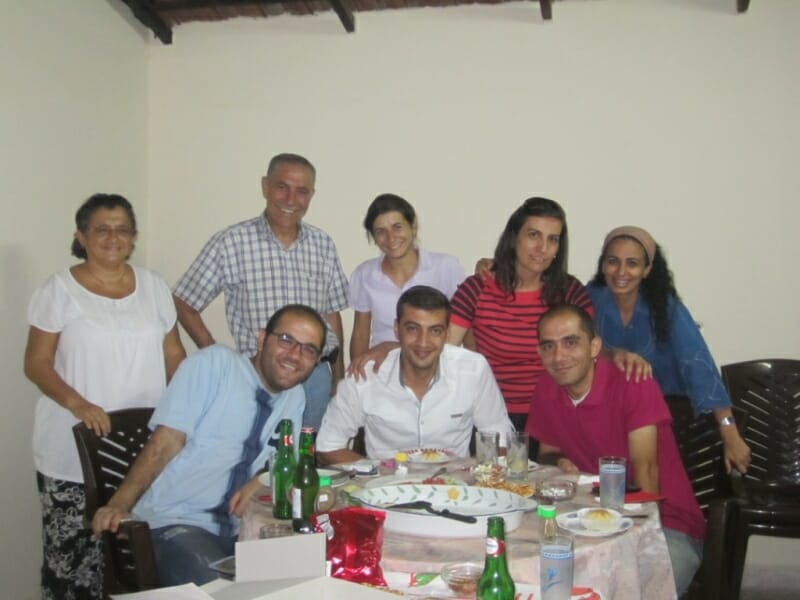
Apr 20, 2015 | Senza categoria
 With a lively gaze and gentle smile that veils some sadness, Ghada describes the tragic events taking place in the country she has chosen as her home. Ghada, what made you return to Syria?
With a lively gaze and gentle smile that veils some sadness, Ghada describes the tragic events taking place in the country she has chosen as her home. Ghada, what made you return to Syria?
At the age of tewenty I left my family and country to follow God. In September 2013 when I requested to return to Syria, I felt the same impetus as before. I was frightened by the thought that I might die, but what I felt more strongly was the attraction to go back and live alongside the people whom I had met years earlier, to help them feel that they were not abandoned. I was urged by a desire to share their life, their fears, their unstable daily lives, because the bombs rain down when you least expect it.
But isn’t there any warning before bombardments, so that you can take cover somewhere?
There are no sirens announcing the strikes, nor is there any strategy in place that would allow you to know when the rockets will hit. On the other hand, this is now the fifth year of war and one cannot stay barricaded forever. You can stop for a day, a month, but then even through the mortars thunder, life must go on: the children go to school and parents work to support their families. Everything goes on under absolute risk and uncertainty. I lived the same drama when I was in the focolare house in Lebanon, but here it is far worse, much more difficult. Here you breathe terror and violence on all sides.
You had already been to Syria in the past. Can you tell us about the changes you’ve seen?
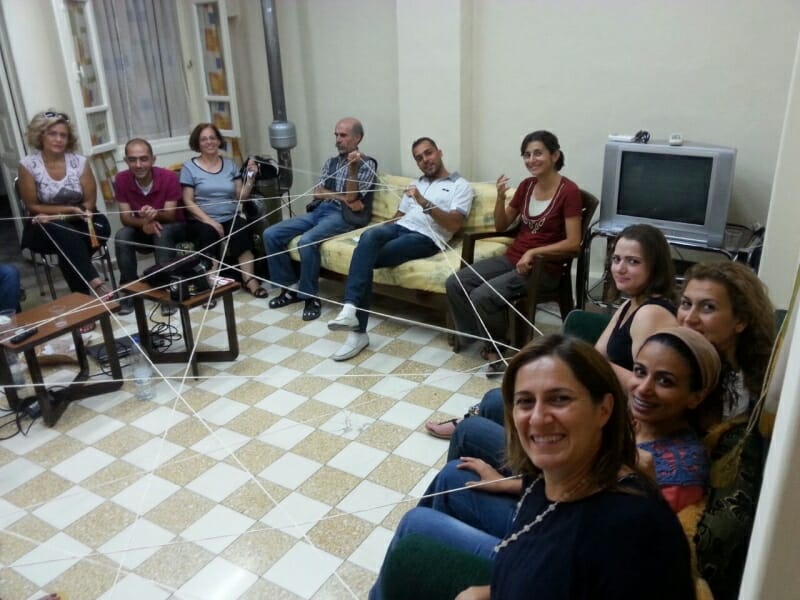 When I was in the focolar in Lebanon, I visited Aleppo, Homs and Damascus because there were still many people who wished to stay in contact with the Focolare. Because of the inner depth and sensitivity of the Syrian people, many meaningful relationships were created. We shared our Christian values that are so strongly felt in this place. Despite the plurality of Churches and rites, which is so typical of this land, there was still harmony amongst all. In 1994 when it was decided to open a focolare in Aleppo, two other focolarine and I were sent to open it. I was there for 9 years. Those were years of prosperity for Syria. The country didn’t have a public debt and the PIL was constantly rising. In the evenings we young women could go out and walk around freely.
When I was in the focolar in Lebanon, I visited Aleppo, Homs and Damascus because there were still many people who wished to stay in contact with the Focolare. Because of the inner depth and sensitivity of the Syrian people, many meaningful relationships were created. We shared our Christian values that are so strongly felt in this place. Despite the plurality of Churches and rites, which is so typical of this land, there was still harmony amongst all. In 1994 when it was decided to open a focolare in Aleppo, two other focolarine and I were sent to open it. I was there for 9 years. Those were years of prosperity for Syria. The country didn’t have a public debt and the PIL was constantly rising. In the evenings we young women could go out and walk around freely.
Now the storm has arrived. But the worst of it is the loss of any hope that this war can end. I return with the other focolarine, to say that we haven’t forgotten them, that Jesus has made us a family and this is why we want to take the same risks. Like everyone else, we go to work, to church, to market – without knowing whether or not we’ll return home again. We’re there because of the love that binds the community in Syria, and the community there knows that we’re ready to give our lives for them, just as they are ready to do for us. This reciprocity is truly exceptional. They compete in making sure we are well, sharing whatever they have.
You focolarine are in Damascus, such a fascinating place, with so much art and history. What is life like there today?
In the city, but also in the villages, every day is a deadly challenge. Transportation is always a mess, because of the lack of petro and constant road blocks. You know what time you leave, but you never know what time you’ll arrive. Homes are without electricity for hours, the same with water. You reach the point of exasperation. The exodus – for the people who are able to leave the country – is continually increasing. It is estimated that over six million people have migrated, in spite of the serious dangers. But religosity remains quite strong. On Good Friday all the Christians attended the Way of the Cross even though they were well aware that bombs could have exploded at any moment, and they also had their children with them. Recently, one of our youth groups spoke had a Skype call with some of their peers in Portugal. The Portuguese wanted to send things to them and were asking our young people what they needed. Even though they are in need of so many material things, they only repeated: “Pray for us, pray for peace, pray that this tailspin of hatred stops.”
Your choice to remain in Syria is a powerful and courageous one. . .
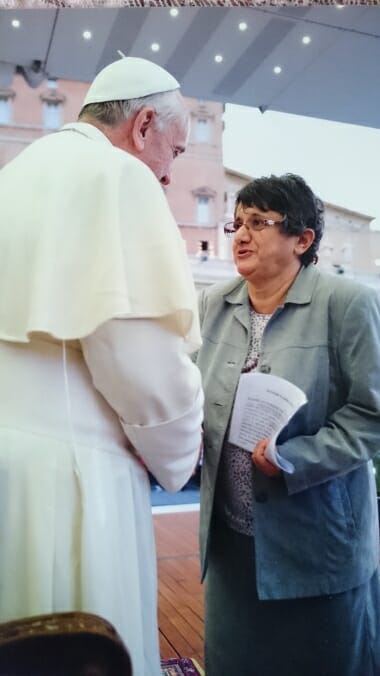 We don’t feel at all like heroes, because we are not here for personal motives. Before leaving I was able to meet Pope Francis: his encouraging words made me feel the love of the Church that draws near to this people that is undergoing such a hard trial. We also feel supported by the love of the Focolare Movement throughout the world. We need that support in order to not lose hope, powerless as we are in front of the supremecy of economic interests, and the international proliferation of weapons on the global market. We celebrate anniversaries; we create recreational moments for children and adults, in order to relieve the stress. We organise moments of spirituality; we pray together for peace. At Christmas our young people organised a concert. Three hundred people attended, including Muslims. Recently we celebrated a wedding. Two children were killed in that family and, because of mourning customs, that young woman couldn’t leave the house dressed as a bride. Therefore, she left from the focolare house, accompanied by all of us. We try to be involved in local Church projects and those of other ecclesial groups, so that we can help to wipe away a bit of suffering and deprivation amongst the people. We continue together to hope and believe, as we support every effort for the coming of peace.
We don’t feel at all like heroes, because we are not here for personal motives. Before leaving I was able to meet Pope Francis: his encouraging words made me feel the love of the Church that draws near to this people that is undergoing such a hard trial. We also feel supported by the love of the Focolare Movement throughout the world. We need that support in order to not lose hope, powerless as we are in front of the supremecy of economic interests, and the international proliferation of weapons on the global market. We celebrate anniversaries; we create recreational moments for children and adults, in order to relieve the stress. We organise moments of spirituality; we pray together for peace. At Christmas our young people organised a concert. Three hundred people attended, including Muslims. Recently we celebrated a wedding. Two children were killed in that family and, because of mourning customs, that young woman couldn’t leave the house dressed as a bride. Therefore, she left from the focolare house, accompanied by all of us. We try to be involved in local Church projects and those of other ecclesial groups, so that we can help to wipe away a bit of suffering and deprivation amongst the people. We continue together to hope and believe, as we support every effort for the coming of peace.
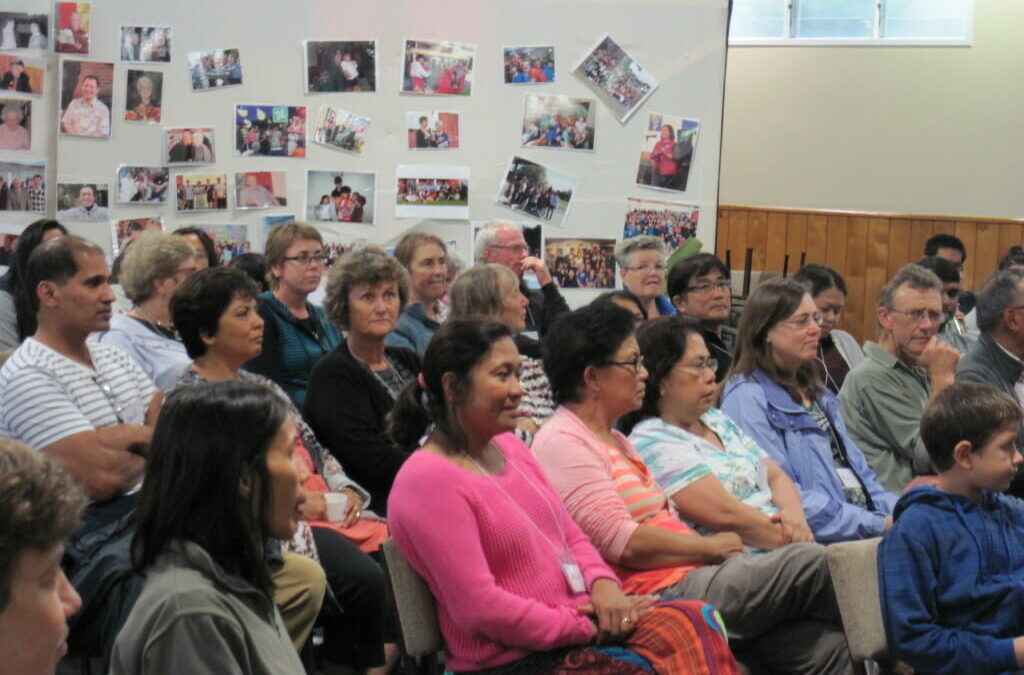
Apr 20, 2015 | Focolare Worldwide
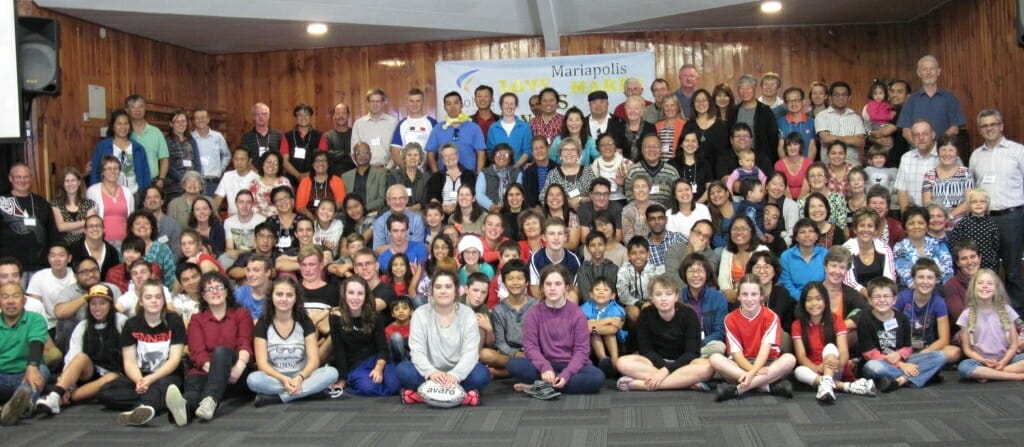 In the district of Rotorua (New Zealand) the earth’s crust is only 4 km thick. Here, one can admire the magnificent spouts of geysers right in the heart of the city, steamy puddles with bubbles gushing out of the surface. The ground emits a heat that even reaches 120°C. This is where the English colonisers had tried to install Roman baths. Still today thermal activity is at the centre of the touristic prospects of Rotorua, a city immersed in the greens and surrounded by hills. On the banks of the lake with the same name, rises the Keswick Christian Camp, a summer facility. This is the where, the Focolare scheduled to meet, about 156 people from the various cities of New Zealand’s two main islands. The objective was to spend three days together, away from the daily routing, to go deeper into the spirituality of unity.
In the district of Rotorua (New Zealand) the earth’s crust is only 4 km thick. Here, one can admire the magnificent spouts of geysers right in the heart of the city, steamy puddles with bubbles gushing out of the surface. The ground emits a heat that even reaches 120°C. This is where the English colonisers had tried to install Roman baths. Still today thermal activity is at the centre of the touristic prospects of Rotorua, a city immersed in the greens and surrounded by hills. On the banks of the lake with the same name, rises the Keswick Christian Camp, a summer facility. This is the where, the Focolare scheduled to meet, about 156 people from the various cities of New Zealand’s two main islands. The objective was to spend three days together, away from the daily routing, to go deeper into the spirituality of unity. 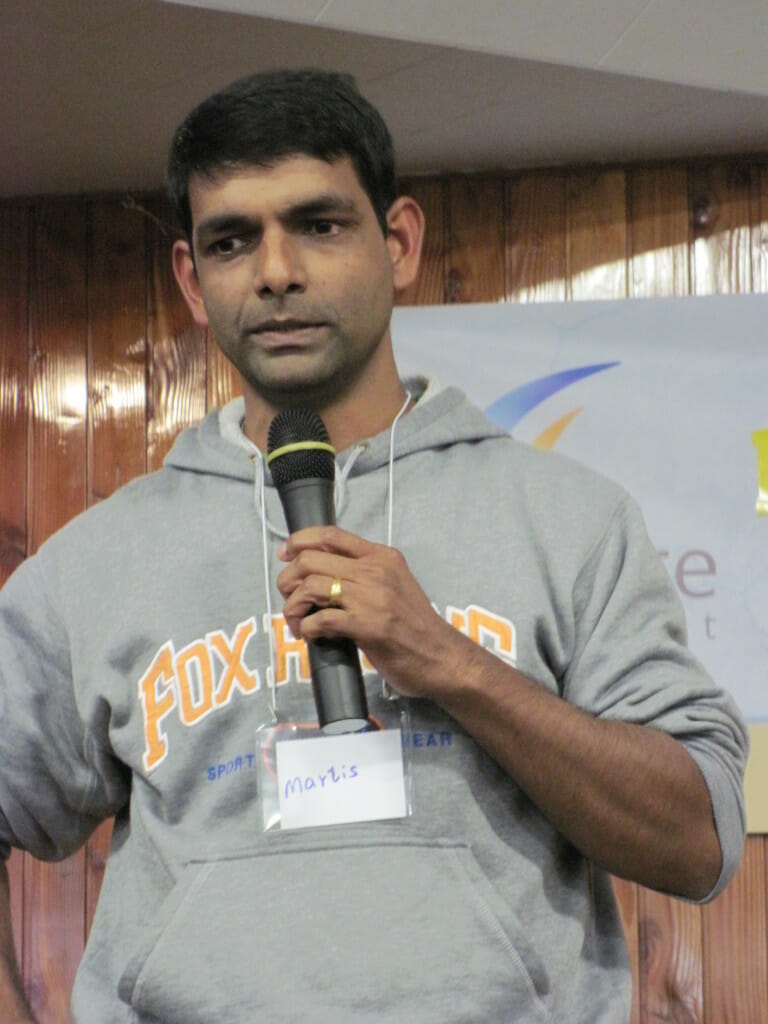 Maori, Filipinos, Chinese, Koreans, Dutch, Anglo-Saxons, Italians, Maltese, Singaporeans, Taiwanese, French, Tokelauans, Indians, Pakistanis…: an overwhelming variety of ethnic groups in a unique model of humanity. Despite such diversity, there was a family atmosphere from the start. Besides moments of spirituality and recreational activities, the programme dedicated a lot of time to getting to know one another and exchanging of experiences. The Pitcaithly family from Chistchurch, the country’s second city recounted a very moving experience of when the city was devastated by two big earthquakes. A tragedy that united the population in a sole slogan of solidarity “Kia kaha, stay strong Christchurch!” that also stood for the Focolare’s effort to gather funds offered by people from various parts of the world. The group from Gisborne, the city that has the privilege of being the first on this earth to see the sun rise, presented the “Fish & Chips Club” project. One its aims was to gather funds for the educational activities of young people, which has been fostered for many years now by people from the various Christian Church, together with others of non-religious beliefs. Together they were able to do something useful for others. Despite the multi-features of the youth and adults, they meet once a month to reflect on the Gospel and share experiences on how they try to put it into practice. A really significant way of growing as a persons and draw strength to bring ahead the various handicraft and sports activities of a club where everyone can be oneself and where people try not to stress the differences but the values all can share
Maori, Filipinos, Chinese, Koreans, Dutch, Anglo-Saxons, Italians, Maltese, Singaporeans, Taiwanese, French, Tokelauans, Indians, Pakistanis…: an overwhelming variety of ethnic groups in a unique model of humanity. Despite such diversity, there was a family atmosphere from the start. Besides moments of spirituality and recreational activities, the programme dedicated a lot of time to getting to know one another and exchanging of experiences. The Pitcaithly family from Chistchurch, the country’s second city recounted a very moving experience of when the city was devastated by two big earthquakes. A tragedy that united the population in a sole slogan of solidarity “Kia kaha, stay strong Christchurch!” that also stood for the Focolare’s effort to gather funds offered by people from various parts of the world. The group from Gisborne, the city that has the privilege of being the first on this earth to see the sun rise, presented the “Fish & Chips Club” project. One its aims was to gather funds for the educational activities of young people, which has been fostered for many years now by people from the various Christian Church, together with others of non-religious beliefs. Together they were able to do something useful for others. Despite the multi-features of the youth and adults, they meet once a month to reflect on the Gospel and share experiences on how they try to put it into practice. A really significant way of growing as a persons and draw strength to bring ahead the various handicraft and sports activities of a club where everyone can be oneself and where people try not to stress the differences but the values all can share 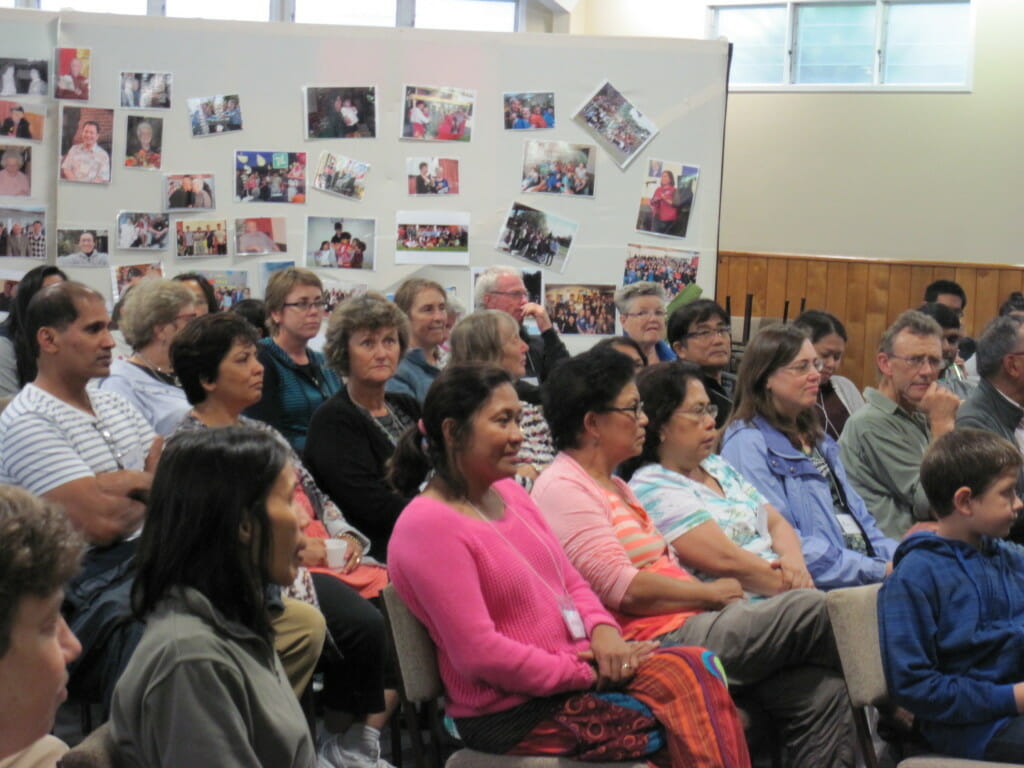 . Even if New Zealand seems to be a wealth land, an Indian-Pakistani family recounted their difficulties in integrating with society. Martis, father of two kids, was working in a home for the aged and his wife Antoneta in a small butchering company. All of a sudden they both lost their jobs. The quest for a new one went on without any results, so much so that they had decided to return to their homeland. Just ten days before the expiry of their visa, from a nearby town someone managed to arrange for a job interview for Martins who thus could renew his stay permit. It was an immense joy for this family that had given a strong testimonial of God’s love which manifests itself also through the community. Theresa, on summarising the wish of the youth present said: «What we experienced these days has given us a big boost to return to our respective cities and start all over again.» Anne, an elderly Maori lady, held in high esteem by her tribe, concluded: «Aroha te mea nui o te ao Katoa»; which in her language means: «Love is the biggest gift in the world.»
. Even if New Zealand seems to be a wealth land, an Indian-Pakistani family recounted their difficulties in integrating with society. Martis, father of two kids, was working in a home for the aged and his wife Antoneta in a small butchering company. All of a sudden they both lost their jobs. The quest for a new one went on without any results, so much so that they had decided to return to their homeland. Just ten days before the expiry of their visa, from a nearby town someone managed to arrange for a job interview for Martins who thus could renew his stay permit. It was an immense joy for this family that had given a strong testimonial of God’s love which manifests itself also through the community. Theresa, on summarising the wish of the youth present said: «What we experienced these days has given us a big boost to return to our respective cities and start all over again.» Anne, an elderly Maori lady, held in high esteem by her tribe, concluded: «Aroha te mea nui o te ao Katoa»; which in her language means: «Love is the biggest gift in the world.»
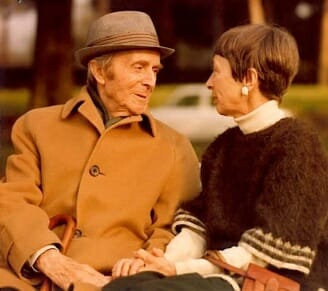
Apr 18, 2015 | Non categorizzato
 “It is nearly impossible to put into words what Igino Giordani was for the Focolare Movement. He was a co-founder of the Movement. Being co-founder of a Work that the Church recognises as its own involves a multiple and complex activity of grace, true and varied impulses from the Holy Spirit, as well as actions on the part of the individual that are determining for the Work. These graces often come in the form of penetrating and prolonged suffering, often as light, graces and love that are not ordinary. It is better left to the history of the Church and the spiritual movements that embellish it through the centuries, to speak about such people.
“It is nearly impossible to put into words what Igino Giordani was for the Focolare Movement. He was a co-founder of the Movement. Being co-founder of a Work that the Church recognises as its own involves a multiple and complex activity of grace, true and varied impulses from the Holy Spirit, as well as actions on the part of the individual that are determining for the Work. These graces often come in the form of penetrating and prolonged suffering, often as light, graces and love that are not ordinary. It is better left to the history of the Church and the spiritual movements that embellish it through the centuries, to speak about such people.
A focolarino prays, works, and suffers in order to reach a goal: the perfection of love. Therefore, we feel it is our duty to confirm that Giordani reached this goal. In our judgement he reached the perfection of love.
He personified the name by which he was known in the Movement: “Fire” (Foco), that is, love towards God and towards neighbour, the supernatural and natural love which lies at the roots and is the summit of Christian life. He contributed in a unique way to keeping alive in our midst the reality of the Word of Life given to him when he entered the Movement: “Love one another as I have loved you.”
Those who knew Igino Giordani well are all in agreement that he had lived the Beatitudes. Exceptionally ‘pure of heart,’ he offered married people from around the world the possibility of a unique consecration to God while remaining in the matrimonial state, through spiritual virginity, the effect of burning charity. This purity refined and heightened his holiest sentiments.
He was ‘poor in spirit’ with complete detachment from his possessions, but above all from himself. He was full of mercy. In his company even the most miserable sinner felt forgiven, and the poorest pauper felt like a king. One of the most remarkable characteristics was that of being a ‘peacemaker,’ especially in his life as a politician.
He came to possess that meekness that leads to possessing the earth. He won over everyone who drew near to him. Everyone felt at ease with him, even the young were able to establish a relationship with him. Especially during his last years he seemed to radiate something supernatural when he spoke.
He “hungered and thirsted for justice” and fought for it all his life. Almost immediately he was persecuted for the sake of God’s name. So many sentences of the Gospel make us think of him.
From Giordani one learns the significance of that conversion which Jesus asks for when he says that we must become like little children. He was a fine Christian apologist and apostle. When it seemed to him that he had found a font of clear water flowing from the Church, he “sold everything’ to follow Jesus and to satisfy his thirst with that water.
He suffered because of the marginalization of the laity, and he aspired with that big heart of his to bring down the dividing walls between the people living in the state of perfection and the others – whom he would jokingly add – were living in the state of imperfection. In other words, he was very sensitive to the signs of the times; indeed, he himself was a sign of the times, of these times in which the Holy Spirit calls the entire People of God to holiness.”
(Taken from: Chiara Lubich, Igino Giordani focolarino, «Città Nuova»n. 9-10 – May 1980)
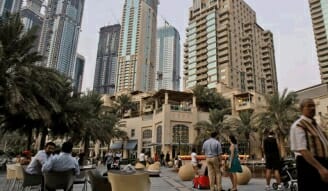
Apr 17, 2015 | Focolare Worldwide
 “In 2014 the company I was working for – Rosette recounts – assigned me to the region of Iraqi Kurdistan (KRI). To facilitate the job placement of my husband, Eric, who also had an excellent CV, we decided to settle in Dubai, in the rich United Arab Emirates where life is pleasant and comfortable. Due to all this wealth many foreigners come to Dubai in pursuit of a better life for themselves and their families, even if this entails leaving one’s own loved ones in their homelands. During one of my trips to Kurdistan, though I was two hours early for my flight, my name was removed from the list of passengers. I was nervous because this meant that I had to take a smaller plane which was scheduled to leave only at one o’clock at night. There was still a lot of time before boarding, but I went to the terminal just the same since we never can tell. Strangely however, there were a lot of people, and many were sleeping on the floor. I asked them how long we had to wait. A woman said: “It depends: we could leave immediately but also within a few days.” In fact, she had been there for two days due to a spelling mistake on her visa. And they would not allow her to leave. Just to start a conversation I asked her if she had something to eat: “Yes, I still have some crackers and a bit of water.” I invited her to have a meal with me and after a lot of insistence, she finally accepted. While we were chatting, her boss called her to check on her and to know if she had enough money to stay there. She had no money. She had sent her entire salary to her son so he could pay his university fees. After the phone call she told me her story: she was separated from her husband, and her two sons lived with their grandparents in her homeland. She had come to Dubai because her daughter was finishing high school and needed money for university. After a while I heard the announcement of my flight. I wondered how long more she would have to wait. I encouraged her take the money I was offering. And I promised I would pray for her family. Her story was just one of the many of how the immigrants live. Some families are in Dubai because of the wars in their countries (Palestinians, Syrians, Iraqis): Dubai is like a safe haven where people can live a normal life. For them, work is everything, the start and the end, since without work they would not have a visa and would not be able to stay in Dubai. Especially for those who are here alone, with the passing of time the physical distance and solitude in a foreign country often obscure their good intentions. We know of people who have extra-marital affairs, destroying in this manner the very family for which they had come here, limiting themselves to just furnishing money to their loved ones. Unfortunately most of these people accept these solutions as unavoidable facts, even if the price to pay is immense. And in the end, also we were asked to pay this same ‘price’. My frequent trips to Dubai led me to spend less and less time with Eric. So we decided to move to Kurdistan, even if this meant renouncing the good job Eric had in Dubai. Initially my company had accepted but during my talks and some violent events in Kurdistan, we were told that the company could not guarantee Eric’s safety and that he, therefore, could not move there. One of my bosses had said: ‘…with time you will get used to being separated …’. In the face of this perspective we immediately decided to resign. We were not going to be separated in any way, even if this meant giving up a well paid job and a career we had studied so much for. I must confess that it was not an easy choice at all. But in our hearts we both knew we were making the right choice. My last working day was 31 December 2014. Last January the Pope came to the Philippines, and in the meeting with families he strongly affirmed the value of the family: “We must be strong in saying “no” to any intent for ideological colonization that can destroy the family.” It seemed as if he was precisely speaking to us, and confirmed the counter current decision we had made.”
“In 2014 the company I was working for – Rosette recounts – assigned me to the region of Iraqi Kurdistan (KRI). To facilitate the job placement of my husband, Eric, who also had an excellent CV, we decided to settle in Dubai, in the rich United Arab Emirates where life is pleasant and comfortable. Due to all this wealth many foreigners come to Dubai in pursuit of a better life for themselves and their families, even if this entails leaving one’s own loved ones in their homelands. During one of my trips to Kurdistan, though I was two hours early for my flight, my name was removed from the list of passengers. I was nervous because this meant that I had to take a smaller plane which was scheduled to leave only at one o’clock at night. There was still a lot of time before boarding, but I went to the terminal just the same since we never can tell. Strangely however, there were a lot of people, and many were sleeping on the floor. I asked them how long we had to wait. A woman said: “It depends: we could leave immediately but also within a few days.” In fact, she had been there for two days due to a spelling mistake on her visa. And they would not allow her to leave. Just to start a conversation I asked her if she had something to eat: “Yes, I still have some crackers and a bit of water.” I invited her to have a meal with me and after a lot of insistence, she finally accepted. While we were chatting, her boss called her to check on her and to know if she had enough money to stay there. She had no money. She had sent her entire salary to her son so he could pay his university fees. After the phone call she told me her story: she was separated from her husband, and her two sons lived with their grandparents in her homeland. She had come to Dubai because her daughter was finishing high school and needed money for university. After a while I heard the announcement of my flight. I wondered how long more she would have to wait. I encouraged her take the money I was offering. And I promised I would pray for her family. Her story was just one of the many of how the immigrants live. Some families are in Dubai because of the wars in their countries (Palestinians, Syrians, Iraqis): Dubai is like a safe haven where people can live a normal life. For them, work is everything, the start and the end, since without work they would not have a visa and would not be able to stay in Dubai. Especially for those who are here alone, with the passing of time the physical distance and solitude in a foreign country often obscure their good intentions. We know of people who have extra-marital affairs, destroying in this manner the very family for which they had come here, limiting themselves to just furnishing money to their loved ones. Unfortunately most of these people accept these solutions as unavoidable facts, even if the price to pay is immense. And in the end, also we were asked to pay this same ‘price’. My frequent trips to Dubai led me to spend less and less time with Eric. So we decided to move to Kurdistan, even if this meant renouncing the good job Eric had in Dubai. Initially my company had accepted but during my talks and some violent events in Kurdistan, we were told that the company could not guarantee Eric’s safety and that he, therefore, could not move there. One of my bosses had said: ‘…with time you will get used to being separated …’. In the face of this perspective we immediately decided to resign. We were not going to be separated in any way, even if this meant giving up a well paid job and a career we had studied so much for. I must confess that it was not an easy choice at all. But in our hearts we both knew we were making the right choice. My last working day was 31 December 2014. Last January the Pope came to the Philippines, and in the meeting with families he strongly affirmed the value of the family: “We must be strong in saying “no” to any intent for ideological colonization that can destroy the family.” It seemed as if he was precisely speaking to us, and confirmed the counter current decision we had made.”
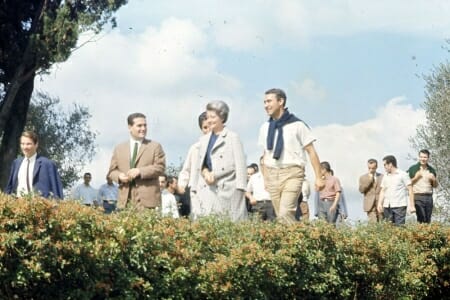
Apr 16, 2015 | Non categorizzato

In carrying out his extraordinary mission, the Apostle Paul conducted his life in a particular way: he strove to become all things to all people. In fact, he tried to understand everyone, enter into the mentality of each person: to be a Jew with the Jews, and with the non-Jews – those without a law revealed by God – to be as one without the law.
Paul followed the Jewish customs whenever this served to remove barriers or to reconcile souls; but when he worked in the Gre¬ek-Roman world, he adopted the culture and way of life of that world. He wrote:
“To the weak I became weak. I have become all things to all people, that I might by all means save some”
He saw before him the unlimited horizon of freedom from sin, from death, from the law, from the reign of Satan, from the barriers imposed by nationality, class and sex, from every form of domination by others, from the taboos of food and customs, and so on.
Paul himself lived this freedom, and with the Gospel he offered it to the communities he founded.
And yet in the liberating reality of Christianity that he announced, Paul recognized the need – or rather, the imperative – to become the slave of someone: of his brothers and sisters, of each neighbor.
He understood this essential duty from the example of Christ, who let himself be crucified in order to reach every person whatever his or her situation, in order to become the servant of everyone.
By becoming man, God drew close to every human being, but on the cross, he proved his solidarity with each of us sinners, with our weaknesses, our sufferings, our anguish, our ignorance, our questions, our burdens, our moments of feeling abandoned.
Paul, too, wanted to live this way, and he declared:
“To the weak I became weak. I have become all things to all people, that I might by all means save some”
The purpose of your life and of each new day is to reach God – and not alone, but with your brothers and sisters. In fact, you also, as a Christian, have received a call from God similar to the one received by Paul. Like the Apostle, you too must “save” someone, must “save some at any cost.”
There are those who are next to you all day long, and those you meet on the street; those with whom you speak on the phone, and those for whom you work. They may be rich or poor, men or women, fellow citizens or foreigners.
Love them all.
But this time, prefer the weakest. Make yourself weak with those who are weak in order to save them. Reach out to those who are weak in faith, indifferent or far from God, to those who profess to be atheists or who belittle religion.
If you make yourself one with them, even in their “weaknesses,” you will find that Paul’s apostolic method always works: you will conquer them!
Do you have a spouse who does not like the Church at all, and who enjoys spending hours watch¬ing TV? Keep him or her company whenever you can, as much as you can, taking a lively interest in what he or she likes to watch most.
Do you have a son who has made sports the center of his life, so much so that he is not interested in anything else, and has even forgotten how to pray? Be¬come a more avid sports fan than he is himself.
Do you have friends who love to travel, to read, to study and who have thrown to the wind all religious principles? Try to understand them by understanding their preferences and their needs and if you can, help them to find what they are seeking.
Make yourself one – with everyone, in everything, as much as you can, except in sin. In the case of anything sinful, dissociate yourself.
You will see that making yourself one with your neighbors is not time lost; it is all time gained.
One day, in the not-too-distant future, they will want to know what interests you.
And then, gratefully, they will discover, adore and love that God who has been the impetus for your Chris¬tian behavior.
Chiara Lubich
Audio in italian
Source: www.centrochiaralubich.org
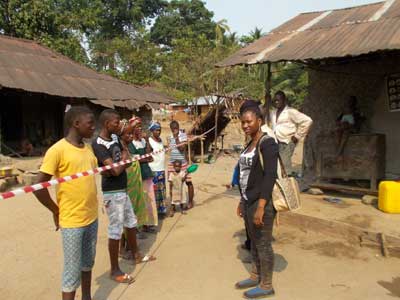
Apr 16, 2015 | Non categorizzato

Antonette, a young woman who volunteers for an NGO, in a village named Rosanda
More days of quarantine in Sierra Leone. From March 27-29 several regions of the capital Freetown and other points in the north of the country were once again isolated, following more registered cases of Ebola in previous days. Trained groups went house to house in the most at risk areas, educating and identifying the infected and possibly infected people.
“There was hope of arriving at zero cases by the end of February,” writes Father Carlo from Sierra Leone, “The schools were ready to open, but that was then postponed to the middle of April. So there is uncertainty, the people want to begin normal life, but the virus is still lurking.”
“At the beginning of the epidemic I was in Makeni for my studies,” says Antonette, a young woman who volunteers for an NGO. “The crisis appeared serious from the start, and that’s how I thought of returning to my home town where I would be safe from the virus. But then I decided to stay on as a volunteer helping the people who were infected. I was assigned to a village named Rosanda,” where there are 54 registered cases and 42 deceased. “It was sad during that first period. Around 15 people died every day. I had to inform the families and, even though I tried to put as much love into it as I could, it wasn’t an easy experience. Two children continued to ask me when their parents would return. I just couldn’t bring myself to tell them the truth. I tried my best to console them with my presence and some small gifts.” “Every day, for one month, I went all the way to that village,” Antonette continues, “learning to expand my heart to those who were in need, even if they were not members of my family or circle of friends. Now Rosanda has finished its 21 days of quarantine. There have been no new cases and I am thankful to God that I was able to be an instrument of His love which I received each day in the Eucharist, for all those people.
Like Antonette others have also given of themselves to fight this great cause of so much suffering and pain. Families have adopted children who were left orphaned, priests and religious held nothing back. Amongst these is Father Peter who worked in several villages. Thanks to his stormy intervention it was possible to block the contagion and reduce the number of victims.
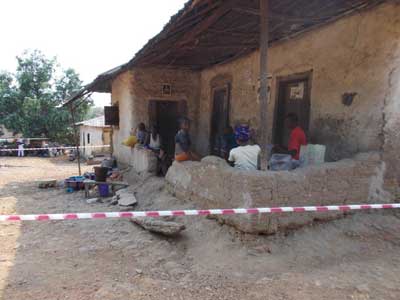 His story is connected to Small Bumbuna, a village in the Diocese of Makeni, 200 miles from Kailahum where the epidemic began. “The illness spread like the fire in dry season, in Sierra Leone. With the first victims we thought of cholera, evil spirits or other superstitions. The response from the medical team was slow: it took weeks to confirm that we were dealing with Ebola. We would have wanted to visit the people from our parish in another village, but the fear was too strong. The district medical team was not able to monitor the situation and send supplies. It was difficult to access roads.” Faced with so many difficulties, Father Peter, followed by his parishioners, made: “a radical decision that brought us face to face with the Ebola,” he recounts. “We found the city deserted when we arrived. The village chief described the terrible situation. The loss of hope was clear on his face, along with impossibility of doing anything.” From there we stepped into non-stop action that involved the highest levels of authority. Father Peter was invited as “guide” to deal with the population, explaining how to stem the spreading and allow themselves to receive medical treatment. “I took on these risks,” Father Peter concluded, “because these people are my community. How could I desert them in such a moment of painful suffering? This question helped me to identify with them, to bring the problem before the authorities, and to offer myself as a guide. I learned that nothing is too small to be offered, nor too heavy to be taken up. Let us continue to pray that the epidemic may be totally eradicated and we can return to normal life.” In the course of two weeks, the danger came under control and people were able to return to their farming activities.
His story is connected to Small Bumbuna, a village in the Diocese of Makeni, 200 miles from Kailahum where the epidemic began. “The illness spread like the fire in dry season, in Sierra Leone. With the first victims we thought of cholera, evil spirits or other superstitions. The response from the medical team was slow: it took weeks to confirm that we were dealing with Ebola. We would have wanted to visit the people from our parish in another village, but the fear was too strong. The district medical team was not able to monitor the situation and send supplies. It was difficult to access roads.” Faced with so many difficulties, Father Peter, followed by his parishioners, made: “a radical decision that brought us face to face with the Ebola,” he recounts. “We found the city deserted when we arrived. The village chief described the terrible situation. The loss of hope was clear on his face, along with impossibility of doing anything.” From there we stepped into non-stop action that involved the highest levels of authority. Father Peter was invited as “guide” to deal with the population, explaining how to stem the spreading and allow themselves to receive medical treatment. “I took on these risks,” Father Peter concluded, “because these people are my community. How could I desert them in such a moment of painful suffering? This question helped me to identify with them, to bring the problem before the authorities, and to offer myself as a guide. I learned that nothing is too small to be offered, nor too heavy to be taken up. Let us continue to pray that the epidemic may be totally eradicated and we can return to normal life.” In the course of two weeks, the danger came under control and people were able to return to their farming activities.
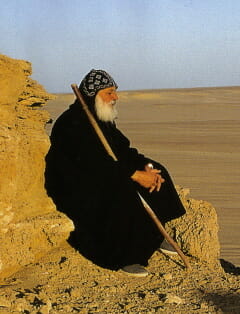
Apr 15, 2015 | Focolare Worldwide
 «Many have tried to explain the roots and reasons behind the start of monastic life, but the sayings and experiences of the Fathers show that the monks are “living martyrs,” and that they “abandoned the world to embrace the sole reality worth living for – God.” It is as if they wanted to respond to God’s love, which is fully described in a verse of the Coptic Mass we call the Divine Liturgy, which addresses God saying: “Of all the words said, there is nothing that can describe Your love for mankind.” St. Jerome says that their asceticism and life as hermits proclaim, “we have been struck by the darts of Divine love,” and each one repeats: “I have found what my soul longs for; I will hold on to it tightly and never leave it.” These monks, therefore, only wishing to give themselves completely to this love and to consecrate themselves to Him, had no choice but to leave the cities.
«Many have tried to explain the roots and reasons behind the start of monastic life, but the sayings and experiences of the Fathers show that the monks are “living martyrs,” and that they “abandoned the world to embrace the sole reality worth living for – God.” It is as if they wanted to respond to God’s love, which is fully described in a verse of the Coptic Mass we call the Divine Liturgy, which addresses God saying: “Of all the words said, there is nothing that can describe Your love for mankind.” St. Jerome says that their asceticism and life as hermits proclaim, “we have been struck by the darts of Divine love,” and each one repeats: “I have found what my soul longs for; I will hold on to it tightly and never leave it.” These monks, therefore, only wishing to give themselves completely to this love and to consecrate themselves to Him, had no choice but to leave the cities.
St. Basil clearly announced: “Whoever loves God leaves all and goes towards Him.” And it is said that St. Tawadros, disciple of St. Pachomius, “had only one interest in the world – to love God with all his heart by following the command of Jesus Christ.” We can sense that the root of ascetic life is to resemble Christ: completely stripping oneself of all things, and following the Father’s will which is virginity, in continual contact with God the Father through prayer. Fr. Matta El Meskin explained it thoroughly: “The warranty of our consecration (as monks) lies in our holding on to Christ personally, and following the Bible’s teachings. In this way, with Christ and the Bible, we will be able to pursue our path in continuous growth, to the very end.”
The choice of the consecrated person is to follow Jesus, the “Way, the Truth and the Life.” This means living for Christ and for him alone and following him in his lifestyle. He chose poverty, virginity and obedience. The monk, therefore, does not choose poverty, but Christ the poor one. The choice is the person of Jesus himself, and so, of what Christ lived, and the how and why he lived in this way. As for the communitarian aspect in the ascetic life of the desert monks, let us recall how – for example in the monasteries that followed after St. Pachomius – the life of communion became the extension of the primitive Church during the time of the apostles. Looking at the life of the Fathers, we can trace some communitarian characteristics: mutual love (St. Pachomius always exhorted his disciples to love one another, and that it was due to the charity among the monks that this life spread and continued up to today), and life together (the dominant feature of these first Christian communities was the “sharing of all they had” in all the aspects of the monks community life).
The teachings of the Desert Fathers remind me about the meditation of Chiara Lubich, “The great attraction of modern times,” which fully expresses what I feel: “To penetrate to the highest contemplation, while mingling with everyone.” It is a contemplation that actualises the life of the Fathers in this century, but in the midst of the world.
T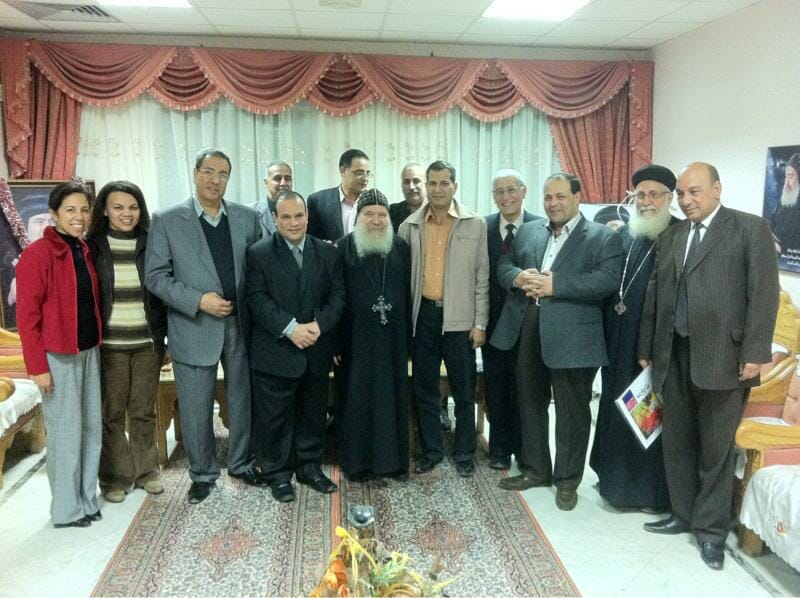 he spiritual presence of Jesus in our midst with the Catholic focolarine with whom I live in the Focolare Centre in Sohag, and the commitment to love each other, have made us like real sisters and caused us to experiment the joy of the Risen Lord, beyond all our differences. In our daily life we share everything we have: we pray, work, rejoice and share the moments of suffering of the people around us. We try to bear witness through our lives, that God is love.
he spiritual presence of Jesus in our midst with the Catholic focolarine with whom I live in the Focolare Centre in Sohag, and the commitment to love each other, have made us like real sisters and caused us to experiment the joy of the Risen Lord, beyond all our differences. In our daily life we share everything we have: we pray, work, rejoice and share the moments of suffering of the people around us. We try to bear witness through our lives, that God is love.
Living for the fullness of unity in Christ’s Church “that all may be one,” fascinates me more and more. I rejoice about the beauty and variety of the gifts of God I find in the various Churches, and the aspiration and emotion of seeing that we are united in Christ in our midst and in the future of the Church in God’s design.
My country also testifies to this with the big and small steps taken along the ecumenical journey. For example, there is now an ecumenical commission which was formed some years ago, with people of every Christian confession existing in Sohag. We meet in a different Church every time: this year it will be in the Coptic Orthodox Church. On 5 March almost all the local heads of the churches were present. The main theme was “the victory over evil,” starting from the persecution of Christians in Libya, which traces the steps of the people of Israel on their departure from Egypt. «The flag that flies above us is that of God’s love,» affirmed the Coptic Orthodox Bishop Bakhoum, who wished that all those present «will always meet in Love.»
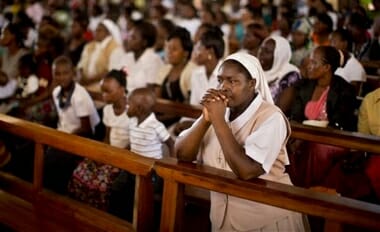
Apr 15, 2015 | Focolare Worldwide, Senza categoria
”The slaughter in Garissa took place on Good Friday. 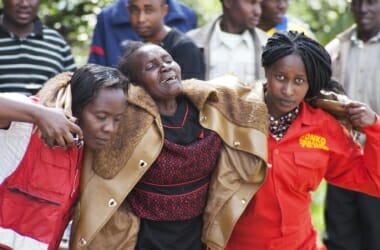 I went to the morgue where they were taking the bodies of the students for identification, not far from my home in Nairobi. I took my camera along. It was impossible not to hear the sirens. I found the parents of the murdered students fainting on one side. . . and on ther other my colleagues with news cameras. I could certainly have shot a few interviews, but I just couldn’t do it; I found myself weeping with the families. There was strong pressure from all sides, opinions from the public who were anxious for news. But I needed time to digest the painful situation in order to be able to say something that would be constructive. I felt my task was to remain quiet with this pain and resist the pressure.”
I went to the morgue where they were taking the bodies of the students for identification, not far from my home in Nairobi. I took my camera along. It was impossible not to hear the sirens. I found the parents of the murdered students fainting on one side. . . and on ther other my colleagues with news cameras. I could certainly have shot a few interviews, but I just couldn’t do it; I found myself weeping with the families. There was strong pressure from all sides, opinions from the public who were anxious for news. But I needed time to digest the painful situation in order to be able to say something that would be constructive. I felt my task was to remain quiet with this pain and resist the pressure.” 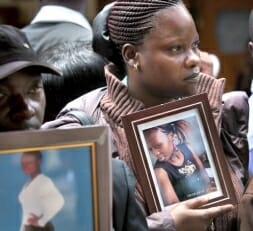 There were over 150 victims of the attack by Somali extremists at the Garissa University College in North East Kenya. The terrorists began their attack on April 3rd, targeting the Christian students. It was only a day-long front attack by government forces that prevented an even worse slaughter. But the general fear of new attacks remains so high that any incident is enough to unleash panic with very serious consequences as happened on April 12th in another university college at Uthiru, near Nairobi. An electrical transfomer caught fire on the fourth and fifth floor, causing an explosion that was similar to that of the bomb. The number of the dead reached 150 with several others seriously wounded. “From the first days of the attack, many of us from our community were in the morgue where 148 bodies of murdered students were taken, in order to console the people who had lost children,” Charles Besigye from the local Focolare community recounts. “Today, on April 11th, we and some of our young people spent the afternoon at the morgue. It was so heartbreaking! People in total suspense who, a week later have not yet found their children. Some bodies have already been identified and they are carrying them back to their villages for burial. The suffering is huge. . . the relatives a desperate sight.We stayed with them to share their suffering, and to help them carry this heavy cross. To weep with those who are still able to, because there are some who have no more tears to shed. One of us offered to help prepare the bodies of the deceased students before their relatives saw them. It was a powerful experience! There’s much solidarity on the part of several associations and the Kenyan people. They bring bread, milk, beverages, and so on. . . The sacred atmosphere that we breathe is overwhelming. There are people who offer comfort, others who pray to God.”
There were over 150 victims of the attack by Somali extremists at the Garissa University College in North East Kenya. The terrorists began their attack on April 3rd, targeting the Christian students. It was only a day-long front attack by government forces that prevented an even worse slaughter. But the general fear of new attacks remains so high that any incident is enough to unleash panic with very serious consequences as happened on April 12th in another university college at Uthiru, near Nairobi. An electrical transfomer caught fire on the fourth and fifth floor, causing an explosion that was similar to that of the bomb. The number of the dead reached 150 with several others seriously wounded. “From the first days of the attack, many of us from our community were in the morgue where 148 bodies of murdered students were taken, in order to console the people who had lost children,” Charles Besigye from the local Focolare community recounts. “Today, on April 11th, we and some of our young people spent the afternoon at the morgue. It was so heartbreaking! People in total suspense who, a week later have not yet found their children. Some bodies have already been identified and they are carrying them back to their villages for burial. The suffering is huge. . . the relatives a desperate sight.We stayed with them to share their suffering, and to help them carry this heavy cross. To weep with those who are still able to, because there are some who have no more tears to shed. One of us offered to help prepare the bodies of the deceased students before their relatives saw them. It was a powerful experience! There’s much solidarity on the part of several associations and the Kenyan people. They bring bread, milk, beverages, and so on. . . The sacred atmosphere that we breathe is overwhelming. There are people who offer comfort, others who pray to God.” During the Way of the Cross at the Roman Colosseum on the evening of Good Friday, the Pope used harsh words: “The thirst of Your Merciful Father,” said Pope Francis, “which in You wished to embrace, forgive and save humanity, makes us think of the thirst of our persecuted brothers and sisters, beheaded and crucified for their faith in You, right beneath our eyes, or often with our complicit silence.” It is a strong warning that urges us not to remain silent.
During the Way of the Cross at the Roman Colosseum on the evening of Good Friday, the Pope used harsh words: “The thirst of Your Merciful Father,” said Pope Francis, “which in You wished to embrace, forgive and save humanity, makes us think of the thirst of our persecuted brothers and sisters, beheaded and crucified for their faith in You, right beneath our eyes, or often with our complicit silence.” It is a strong warning that urges us not to remain silent.
Apr 14, 2015 | Focolare Worldwide
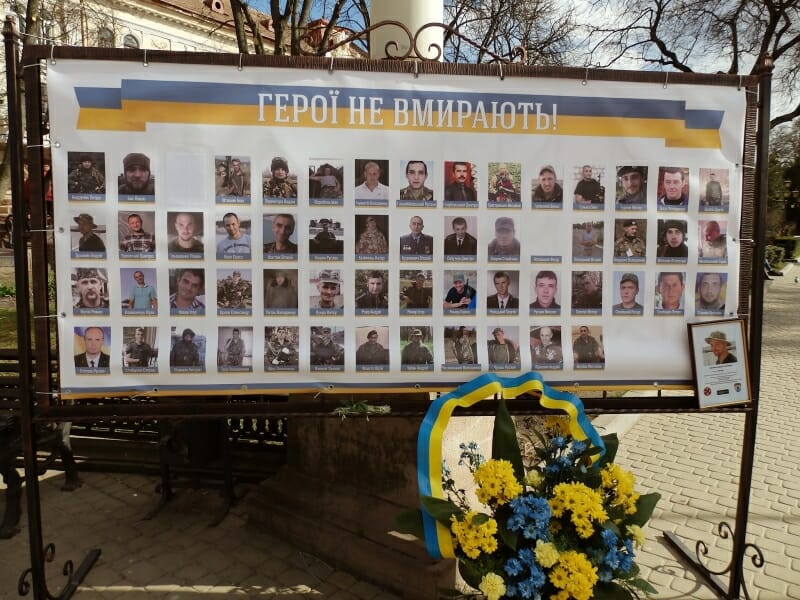
Apr 13, 2015 | Focolare Worldwide
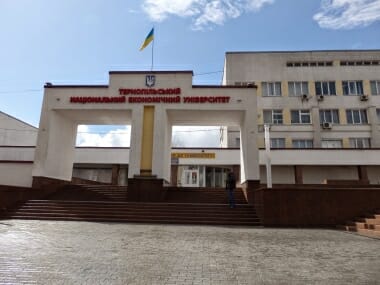 In his heartfelt plea for our many brothers and sisters in the world who “unjustly suffer the consequences of present violence and war,” the Pope also prayed for “the beloved Ukraine” that “it might find peace and hope thanks to the commitment of all interested parties.” Yes, because the war in Ukraine even now continues in its absurdity and violence. We are talking with Roberto Catalano who has been invited to hold conferences on the topic of dialogue, at the Universties of Leopoli, Ivanova Franziksva and Ternopil. It is significant that in the midst of the ‘crisis,’ the young people (and their tutor), rather than becoming entrenched in their private worlds, are out working for deeper dialogue as the only resource that directs their every effort. Roberto, what was the general feeling among the people you met?
In his heartfelt plea for our many brothers and sisters in the world who “unjustly suffer the consequences of present violence and war,” the Pope also prayed for “the beloved Ukraine” that “it might find peace and hope thanks to the commitment of all interested parties.” Yes, because the war in Ukraine even now continues in its absurdity and violence. We are talking with Roberto Catalano who has been invited to hold conferences on the topic of dialogue, at the Universties of Leopoli, Ivanova Franziksva and Ternopil. It is significant that in the midst of the ‘crisis,’ the young people (and their tutor), rather than becoming entrenched in their private worlds, are out working for deeper dialogue as the only resource that directs their every effort. Roberto, what was the general feeling among the people you met? 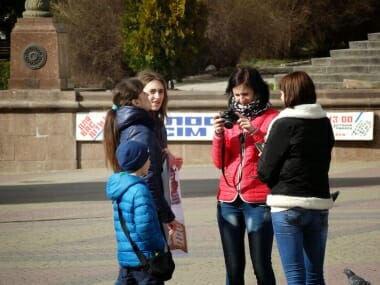 “At the end of one conference, one of my scholastic colleagues showed me three photos of some ex-students of the University who had been killed in the conflict in the south of the country. With eyes filled with tears, he told me that every evening after lessons, a group of students gathers in the cafeteria of the university to cook Ukrainian dishes, which are then frozen and delivered to soldiers. Annother woman told me about her six year-old son who draws cartoons and sends them to soldiers, as a sign of thanks for defending his country. Unfortunately, unlike last year, the news is no longer reporting on what is taking place in Ukraine. Yet, there is actually a war underway in East Ukraine.” There seems to be no way out of the situation that is generating suffering and suspense in the hearts of the people. . . “I had living proof of this deep suffering during every moment of my stay in Ukraine. Students and professors asked me what I thought about the situation in the country and, above all, what the rest of Europe was saying. I didn’t have the nerve to express judgements. Faced with their fear and suffering I preferred to listen and stay silent. I was impressed by the strength and dignity of that people, but it also frightened me that the rest of Europe and of the world have abandoned them to their fate, aggravated also by the growing nationalism, another phenomenon that could be hiding large dangers for the future.”
“At the end of one conference, one of my scholastic colleagues showed me three photos of some ex-students of the University who had been killed in the conflict in the south of the country. With eyes filled with tears, he told me that every evening after lessons, a group of students gathers in the cafeteria of the university to cook Ukrainian dishes, which are then frozen and delivered to soldiers. Annother woman told me about her six year-old son who draws cartoons and sends them to soldiers, as a sign of thanks for defending his country. Unfortunately, unlike last year, the news is no longer reporting on what is taking place in Ukraine. Yet, there is actually a war underway in East Ukraine.” There seems to be no way out of the situation that is generating suffering and suspense in the hearts of the people. . . “I had living proof of this deep suffering during every moment of my stay in Ukraine. Students and professors asked me what I thought about the situation in the country and, above all, what the rest of Europe was saying. I didn’t have the nerve to express judgements. Faced with their fear and suffering I preferred to listen and stay silent. I was impressed by the strength and dignity of that people, but it also frightened me that the rest of Europe and of the world have abandoned them to their fate, aggravated also by the growing nationalism, another phenomenon that could be hiding large dangers for the future.”  Exactly as the Pope said when he talked about the slaughter of the students in Kenya. In the face of these atrocities, it seems like the international community turns its eyes the other way. And yet, the Ukrainian people are also our brothers and sisters, because of our common humanity and our common Christian faith that inspires them. “I visited a large church where the liturgy was being celebrated according to the Eastern Rite. The beautiful and very modern iconostasis was quite striking, but more surprising was the religiosity of the people who were so attentive and wrapt in prayer. I was struck by the long queue of people waiting for Confession. Seventy years of Marxism didn’t wipe out the faith of the people.” In your opinion, is there any hope there will be peace? “I only visited one half of Ukraine and wasn’t able to hear the other side, but they also have their suffering that is perhaps more difficult to understand. And it’s another story over here with its own twists and turns, but also with its present problems that are dictated by international interests in gas and oil. There is the risk of silence that covers up the suffering of millions of people. As the Pope suggested, there is a need for commitment from all the interersted parties. This is the only way an enduring peace will be able to be reached.
Exactly as the Pope said when he talked about the slaughter of the students in Kenya. In the face of these atrocities, it seems like the international community turns its eyes the other way. And yet, the Ukrainian people are also our brothers and sisters, because of our common humanity and our common Christian faith that inspires them. “I visited a large church where the liturgy was being celebrated according to the Eastern Rite. The beautiful and very modern iconostasis was quite striking, but more surprising was the religiosity of the people who were so attentive and wrapt in prayer. I was struck by the long queue of people waiting for Confession. Seventy years of Marxism didn’t wipe out the faith of the people.” In your opinion, is there any hope there will be peace? “I only visited one half of Ukraine and wasn’t able to hear the other side, but they also have their suffering that is perhaps more difficult to understand. And it’s another story over here with its own twists and turns, but also with its present problems that are dictated by international interests in gas and oil. There is the risk of silence that covers up the suffering of millions of people. As the Pope suggested, there is a need for commitment from all the interersted parties. This is the only way an enduring peace will be able to be reached.
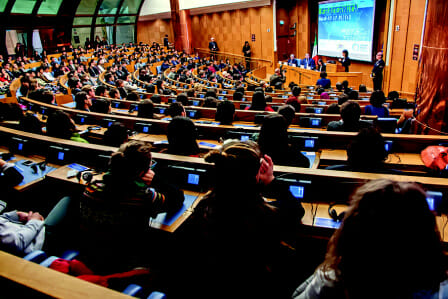
Apr 12, 2015 | Non categorizzato
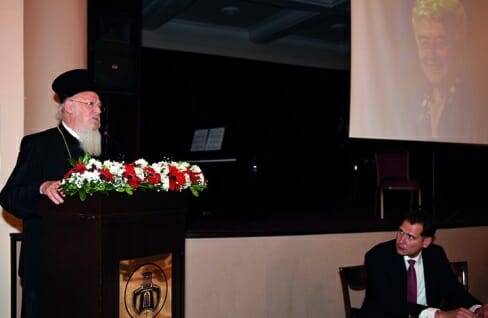
Patriarch Bartholomew
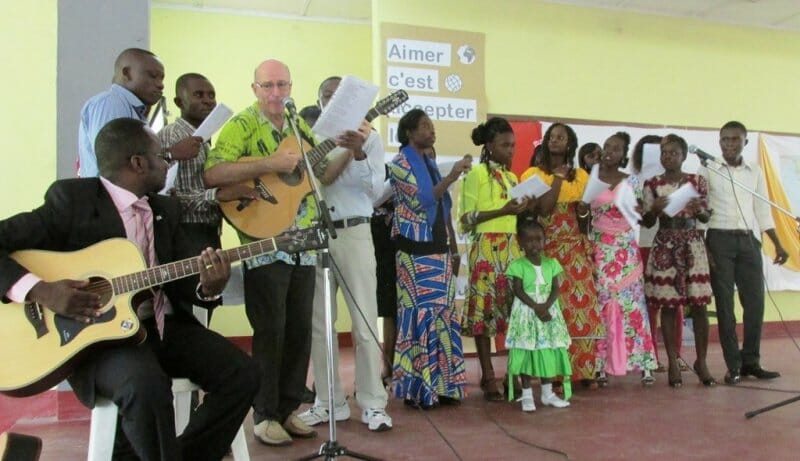 Within crisis situations – An answer to the political crisis going on in Congo appeared as the theme of two meetings held in that land. In Lubumbashi 370 people came forward, both Christian and Muslim. Young people from the Focolare presented an artistic rendition of Chiara’s love for the poor; her encounter with Igino Giordani; and her ‘dream’ for the unity of the human family. The Mass was animated by over fifty seminarians. Four hundred people attended the event in Goma, including a large group of politicians from the province of North-Kivu and representatives from civil society. Following the event, RTNC broadcasted the event in four local languages. Some events were held in a few of the world’s hotspots. In Nigeria, for example, there were several events: in Yola to where many refugees have fled. The bishop celebrated Mass for Chiara, praying for peace. In Abuja and Lagos young people held a two-day preperation event for other young people. In Onitsha there was a meeting with more than 300 adults, young people and children. In Jos, where it was not possible to hold a large gathering because of an explosion a few days earlier, the Focolare groups paid a visit to a Penal Institute for Minors. Peace was also the main topic at a day-long event organised in Bujumbura, Burundi, with over a thousand people. The programme included many testimonies that highlighted the possibility of living in harmony with others and building peace in places where that is not easily done. The Archbishop Evariste Ngoyagoye attended the morning portion of the programme. In Central America, politics is a hot topic. From Honduras they write: “tired of corrupt politics and bombarded by violent news that generates discouragement in the popultiaon, we organised this event in order to share what the charism of unity has to offer both in testimony and in thought.” In Salvador that awaits the Beatification of Oscar Romero, we asked how unity could be lived in the midst of violence. Amongst the testimonies was that of Francesco, who was assaulted by a pair of armed youngsters. He was able to dialogue with them and speak to them about God. The boys were completely blown away; putting down their weapons they walked away. In Pakistan, in Karachi, Lahore, Rawalpindi, Dalwal, over a thousand people held four celebrations, with hopeful expectancy following the tragic events of March 15 in Yohannabad.
Within crisis situations – An answer to the political crisis going on in Congo appeared as the theme of two meetings held in that land. In Lubumbashi 370 people came forward, both Christian and Muslim. Young people from the Focolare presented an artistic rendition of Chiara’s love for the poor; her encounter with Igino Giordani; and her ‘dream’ for the unity of the human family. The Mass was animated by over fifty seminarians. Four hundred people attended the event in Goma, including a large group of politicians from the province of North-Kivu and representatives from civil society. Following the event, RTNC broadcasted the event in four local languages. Some events were held in a few of the world’s hotspots. In Nigeria, for example, there were several events: in Yola to where many refugees have fled. The bishop celebrated Mass for Chiara, praying for peace. In Abuja and Lagos young people held a two-day preperation event for other young people. In Onitsha there was a meeting with more than 300 adults, young people and children. In Jos, where it was not possible to hold a large gathering because of an explosion a few days earlier, the Focolare groups paid a visit to a Penal Institute for Minors. Peace was also the main topic at a day-long event organised in Bujumbura, Burundi, with over a thousand people. The programme included many testimonies that highlighted the possibility of living in harmony with others and building peace in places where that is not easily done. The Archbishop Evariste Ngoyagoye attended the morning portion of the programme. In Central America, politics is a hot topic. From Honduras they write: “tired of corrupt politics and bombarded by violent news that generates discouragement in the popultiaon, we organised this event in order to share what the charism of unity has to offer both in testimony and in thought.” In Salvador that awaits the Beatification of Oscar Romero, we asked how unity could be lived in the midst of violence. Amongst the testimonies was that of Francesco, who was assaulted by a pair of armed youngsters. He was able to dialogue with them and speak to them about God. The boys were completely blown away; putting down their weapons they walked away. In Pakistan, in Karachi, Lahore, Rawalpindi, Dalwal, over a thousand people held four celebrations, with hopeful expectancy following the tragic events of March 15 in Yohannabad.  In institutional fora – In Seoul numerous deputies and people working in public adminstration met at the Parliament to take stock of the journey begun ten years ago towards a politics of brotherhood. In Madrid it was the Seat of the European Parliament to host a seminar on “One world, many peoples embracing diversity;” whereas, in Strasbourg, France, Seats of European Institutes hosted three-day events on the theme of fraternity as a political category. In Rome, a meeting titled “Chiara Lubich: Unity and Politics” was held at the Hall of the Palace of Parliamentary Groups of the Chamber of Deputies. Several politicians gave presentations at the roundtable organised in Toronto, Canada, which focused on Chiara’s vision of politics. In Solingen, Germany, the central theme of the event was the culture of fraternity in three specific areas: refugees, peace, and dialogue with other cultures. Over a hudred people attended from various confessions, religions and nationalities. “The political thought and action of Chiara Lubich” was the main theme of another project that was dedicated to Chiara at an event dedicated to her: the conference of Curitiba, Brazil, where commemorative postal stamps was also printed in her honour. The Parliament of the Province of Córdoba, Argentina, remembered Chiara by approving the decree of posthumous recognition of her work. Other political events were held in Italy, Hungary, Czech Republic, Portugal, Sweden, USA, Honduras, Mexico, Colombia, Tanzania, and Kenya. In other environments – Politics is not the only thing that was discussed on Chiara’s anniversary. Culture and the arts were at the centre of many quite original events. In Durban, South African Republic, the third edition of the “Chiara Lubich Memorial Lecture” was held with the participation of the niece of Mahatma Gandhi, Ela Gandhi. In Maracaibo, Venezuela, the Catholic University Cecilio Acosta (UNICA) held the Fourth Biannual Chiara Lubich Art Contest. It provided professional artists, art students and art lovers with the opportunity of displaying their work at the nations Republicj Square. In other countries March 14th events were opportunities to come together. One such event took place in Cuba at L’Avana with more than 200 people, and in Santiago de Cuba with 150 people. The local Focolare communities prepared the events and presented the Focolare Movement with their own testimonies and the impact of the spirituality of unity in many areas of their personal life and in society.In Cochabamba, Bolivia, there were 120 people. In Mexico City and in the territoryof Nezahualcoyotl Chiara was remembered during the Mariapolis. In Vietnam, both in Ho Chi Minh City to the south, and in the tiny village of Ngo Khe, Ha Noi in the north, people gathered around the altar to renew “before God and before Chiara, our commitment to be forever faithful to her legacy.” In Myanmar, at Yangon, where the majority of Focolare members never knew Chiara personally, they feel very drawn by her charism. Also in Thailand, both in Bangkok and in Chiang Mai, the Focolare Family gathered to celebrate. Six hundred people in the Slovack Republic, from Kosice and Bratislava. They write: “The testimonies from people of other Churches and from people with no religous reference, made us see how Chiara belongs to everyone. The Rector of the University of Trnava, Dr Peter Blaho, who in 2003 had conferred upon Chiara the honorary doctorate in Theology, shared his memory of meeting her. In Fontem, Cameroon, 500 people from all the surrounding villages joined with Fontem to remember “Mafua Ndem,” Chiara Lubich. The theme was “The impact of the ideal of Unity in areas of social life.” The young people from the college presented their experiences with the “cube of peace:” “From when we introduced the cube in our classes, theft and truancy have decreased; academic performance has improved, each student cares for the other student’s property; there’s more tolerance and we forgive one another more easily; and the sharing has grown amongst students. . .” Moments of prayer – Many civil and religious leaders attended Euchariastic celebrations that were held around the world. From the many interventions of Bishops and Cardinals at these celebrations, we present that of Cardinal Angelo Scola from Milan, Italy, who said among other things: “Our task today is to grasp with renewed awareness the dream that had animated the life and thought of Chiara, creating environments of brotherhood everywhere, wherever we find ourselves, and giving priority to the needs of the neighbour that is beside us, as well as the one that is far and living in lands where there is violence and war. This is how we want to become authentic witnesses of the charism that God gave to Chiara, being at the service of the Church and of humanity.”
In institutional fora – In Seoul numerous deputies and people working in public adminstration met at the Parliament to take stock of the journey begun ten years ago towards a politics of brotherhood. In Madrid it was the Seat of the European Parliament to host a seminar on “One world, many peoples embracing diversity;” whereas, in Strasbourg, France, Seats of European Institutes hosted three-day events on the theme of fraternity as a political category. In Rome, a meeting titled “Chiara Lubich: Unity and Politics” was held at the Hall of the Palace of Parliamentary Groups of the Chamber of Deputies. Several politicians gave presentations at the roundtable organised in Toronto, Canada, which focused on Chiara’s vision of politics. In Solingen, Germany, the central theme of the event was the culture of fraternity in three specific areas: refugees, peace, and dialogue with other cultures. Over a hudred people attended from various confessions, religions and nationalities. “The political thought and action of Chiara Lubich” was the main theme of another project that was dedicated to Chiara at an event dedicated to her: the conference of Curitiba, Brazil, where commemorative postal stamps was also printed in her honour. The Parliament of the Province of Córdoba, Argentina, remembered Chiara by approving the decree of posthumous recognition of her work. Other political events were held in Italy, Hungary, Czech Republic, Portugal, Sweden, USA, Honduras, Mexico, Colombia, Tanzania, and Kenya. In other environments – Politics is not the only thing that was discussed on Chiara’s anniversary. Culture and the arts were at the centre of many quite original events. In Durban, South African Republic, the third edition of the “Chiara Lubich Memorial Lecture” was held with the participation of the niece of Mahatma Gandhi, Ela Gandhi. In Maracaibo, Venezuela, the Catholic University Cecilio Acosta (UNICA) held the Fourth Biannual Chiara Lubich Art Contest. It provided professional artists, art students and art lovers with the opportunity of displaying their work at the nations Republicj Square. In other countries March 14th events were opportunities to come together. One such event took place in Cuba at L’Avana with more than 200 people, and in Santiago de Cuba with 150 people. The local Focolare communities prepared the events and presented the Focolare Movement with their own testimonies and the impact of the spirituality of unity in many areas of their personal life and in society.In Cochabamba, Bolivia, there were 120 people. In Mexico City and in the territoryof Nezahualcoyotl Chiara was remembered during the Mariapolis. In Vietnam, both in Ho Chi Minh City to the south, and in the tiny village of Ngo Khe, Ha Noi in the north, people gathered around the altar to renew “before God and before Chiara, our commitment to be forever faithful to her legacy.” In Myanmar, at Yangon, where the majority of Focolare members never knew Chiara personally, they feel very drawn by her charism. Also in Thailand, both in Bangkok and in Chiang Mai, the Focolare Family gathered to celebrate. Six hundred people in the Slovack Republic, from Kosice and Bratislava. They write: “The testimonies from people of other Churches and from people with no religous reference, made us see how Chiara belongs to everyone. The Rector of the University of Trnava, Dr Peter Blaho, who in 2003 had conferred upon Chiara the honorary doctorate in Theology, shared his memory of meeting her. In Fontem, Cameroon, 500 people from all the surrounding villages joined with Fontem to remember “Mafua Ndem,” Chiara Lubich. The theme was “The impact of the ideal of Unity in areas of social life.” The young people from the college presented their experiences with the “cube of peace:” “From when we introduced the cube in our classes, theft and truancy have decreased; academic performance has improved, each student cares for the other student’s property; there’s more tolerance and we forgive one another more easily; and the sharing has grown amongst students. . .” Moments of prayer – Many civil and religious leaders attended Euchariastic celebrations that were held around the world. From the many interventions of Bishops and Cardinals at these celebrations, we present that of Cardinal Angelo Scola from Milan, Italy, who said among other things: “Our task today is to grasp with renewed awareness the dream that had animated the life and thought of Chiara, creating environments of brotherhood everywhere, wherever we find ourselves, and giving priority to the needs of the neighbour that is beside us, as well as the one that is far and living in lands where there is violence and war. This is how we want to become authentic witnesses of the charism that God gave to Chiara, being at the service of the Church and of humanity.”
![PRESET Eco-sustainability Project in Argentina]()
Apr 12, 2015 | Focolare Worldwide
 |
Christos anesti! Alithos anesti!
Христос воскресе!Christ is Risen! Indeed He is risen!
Khrishti unjal! Vertet unjal!
Hristos voskrese! Vo istina voskrese!
Khrystos uvaskros! Sapraudy uvaskros!
Le Christ est ressuscité! En verité il est ressuscité!
Kriste ahzdkhah! Chezdmaridet!
Christus ist erstanden! Er ist wahrhaftig erstanden!
Cristo è risorto! Veramente è risorto!
Cristos a inviat! Adevarat a inviat!
Khristos voskrese! Voistinu voskrese!
Cristos vaskres! Vaistinu vaskres!Christ is risen from the dead,
trampling down death by death,
and on those in the tombs bestowing life!Христос воскресе из мертвых,
смертию смерть поправ,
и сущим во гробех живот даровав!
|
Apr 11, 2015 | Focolare Worldwide
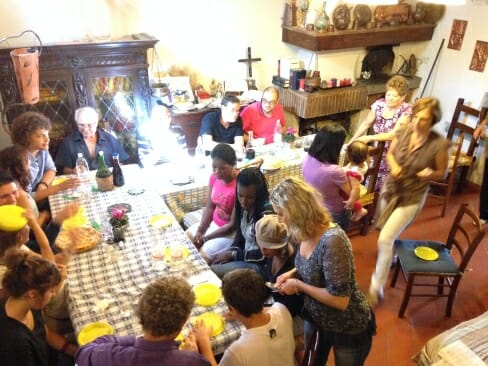
Apr 10, 2015 | Focolare Worldwide
https://vimeo.com/131567545 Cesar, an 18-year old from Ghana, was saved just when he was about to drown, after he had drunk water and fuel. On that journey, 72 people were saved while 32 died. Maria, a Nigerian and seven months pregnant, had received a phone call from her father while she was out with her husband and little son. He told them not to return home because the church had been burnt and her mother killed. They escaped with the little they had, and arrived in Libya. They had money for the journey to Italy of just one person, and so only she left. Her husband and little son remained on the other side of the Mediterranean, waiting for another embarkment. «These are heartbreaking glimpses of life. They remind us of Jesus’s words: “I was a stranger and you shared your home.” We would like to be the arms and heart for each of these refugees.» This is the story of Carla and David of Florence (Italy), who as a family opened their hearts to the welcoming of migrants. «In summer 2013, we participated with our three kids in the World Youth Day in Brazil. We took the opportunity then to spend some time to do missionary work in Salvador Bahia. It was a strong experience that opened our hearts to the spirit of sharing with those in need. Once we returned home, we decided to dedicate a part of the B&B we run to migrants. In that moment the mission had come to us! Since then, 756 people have passed through, coming from Syria, Pakistan, Nepal, Bangladesh and some countries of Africa. Some stayed only to take refreshments and depart for other European destinations while others remained longer. And in these cases, our relationships became close and very fraternal. 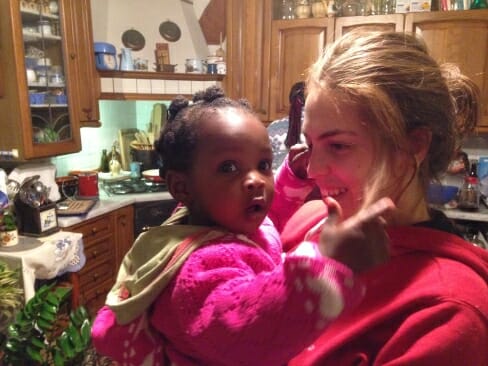 An Eritrean family now on its way to Norway, stayed for two months: he is Muslim while she is Christian, with six children who were left free by their father to choose their religion. When their mother arrived with the youngest son, they were hospitalized for dehydration, after which so also was the father, due to an infection. We remember their joy when we handed them a cell phone so that they could call their relatives to say they were all alive and well. On Sunday we all went to mass together in that tiny Church at the outskirts of Florence where Cardinal Betori was holding a pastoral visit. His whole homily centred on welcoming the homeless. In the end he embraced them and blessed everyone.
An Eritrean family now on its way to Norway, stayed for two months: he is Muslim while she is Christian, with six children who were left free by their father to choose their religion. When their mother arrived with the youngest son, they were hospitalized for dehydration, after which so also was the father, due to an infection. We remember their joy when we handed them a cell phone so that they could call their relatives to say they were all alive and well. On Sunday we all went to mass together in that tiny Church at the outskirts of Florence where Cardinal Betori was holding a pastoral visit. His whole homily centred on welcoming the homeless. In the end he embraced them and blessed everyone.  Three girls, one from Mali and another from Libya, both Muslims, came together with a young girl who escaped from Nigeria after witnessing the massacre of their parents because they were Christians. A sisterly relationship was created between them and with us, as if between parents and daughters. One Sunday while we were taking a walk, Mersi was very sad because that day on TV there was the news of another massacre in Nigeria. Finally, they received a phone call: their younger sister was able to escape to Libya with her father’s friend. The Libyan girl immediately contacted her family and the child – a Christian – was taken in by them who were Muslims. Here’s another picture: of Joy and Lorenz, who had seen their father killed because he was a Christian. I, David, as a social worker can get on the bus when refugees arrive. I do this at the risk of contracting diseases, but I know that the first approach is fundamental since it is then that we are able to identify the groups that, in the meantime, have been created among them. I saw that Joy was pregnant, and so I invited them to our centre. Also when the Prefecture moved them to another place, we continued to visit them, and when the baby was born, we brought them a pram and clothes which the New Families of the Focolare had gathered for them. Joy and Lorenz asked us to be little John’s godparents. This family was then sent to Puglia. The parting was strong but the relationship continues. The call us Mom and Dad. When they obtain their stay permit, they want to come to live close to us.»
Three girls, one from Mali and another from Libya, both Muslims, came together with a young girl who escaped from Nigeria after witnessing the massacre of their parents because they were Christians. A sisterly relationship was created between them and with us, as if between parents and daughters. One Sunday while we were taking a walk, Mersi was very sad because that day on TV there was the news of another massacre in Nigeria. Finally, they received a phone call: their younger sister was able to escape to Libya with her father’s friend. The Libyan girl immediately contacted her family and the child – a Christian – was taken in by them who were Muslims. Here’s another picture: of Joy and Lorenz, who had seen their father killed because he was a Christian. I, David, as a social worker can get on the bus when refugees arrive. I do this at the risk of contracting diseases, but I know that the first approach is fundamental since it is then that we are able to identify the groups that, in the meantime, have been created among them. I saw that Joy was pregnant, and so I invited them to our centre. Also when the Prefecture moved them to another place, we continued to visit them, and when the baby was born, we brought them a pram and clothes which the New Families of the Focolare had gathered for them. Joy and Lorenz asked us to be little John’s godparents. This family was then sent to Puglia. The parting was strong but the relationship continues. The call us Mom and Dad. When they obtain their stay permit, they want to come to live close to us.»
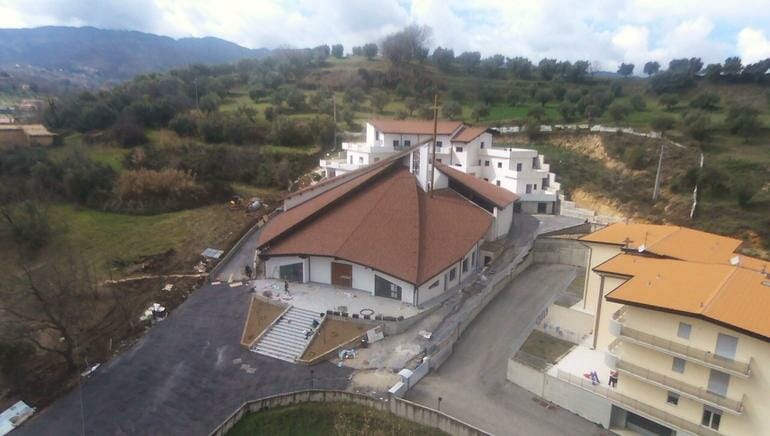
Apr 9, 2015 | Focolare Worldwide
 On 20 March the new parish church, dedicated to Christ the Saviour, was inaugurated in Mendicino, in Cosenza, Italy. The event was celebrated on the anniversary of Msgr. Nunnari and it fulfilled the dream of the entire parish community, composed of 10,000 inhabitants, which now enjoys a place of worship of an extremely unique structure. It comprises about 15 rooms for catechism lessons, a meeting hall and presbytery. The project, carried out by means of technical support by local experts, was designed by The Ave Arts Centre in Loppiano, which designs are inspired by research done through the years by a team of architects who work in the little town of the Focolare.
On 20 March the new parish church, dedicated to Christ the Saviour, was inaugurated in Mendicino, in Cosenza, Italy. The event was celebrated on the anniversary of Msgr. Nunnari and it fulfilled the dream of the entire parish community, composed of 10,000 inhabitants, which now enjoys a place of worship of an extremely unique structure. It comprises about 15 rooms for catechism lessons, a meeting hall and presbytery. The project, carried out by means of technical support by local experts, was designed by The Ave Arts Centre in Loppiano, which designs are inspired by research done through the years by a team of architects who work in the little town of the Focolare.
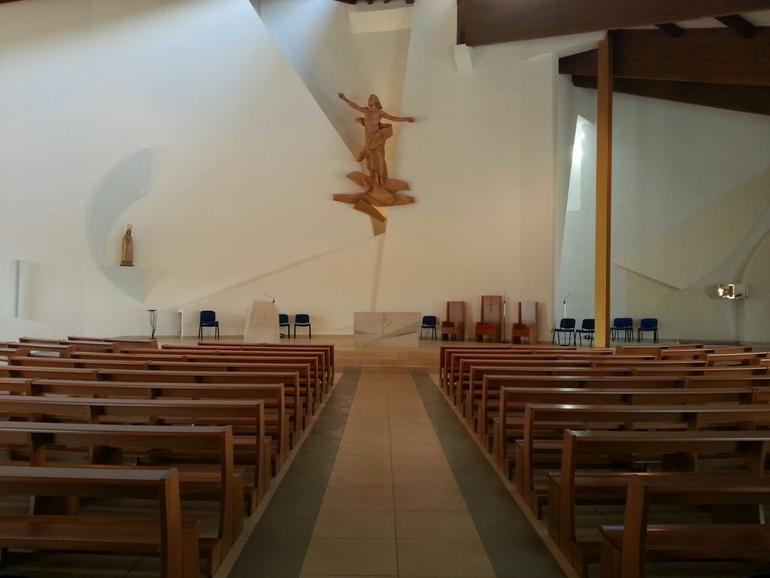 Apart from its constant internal reflection, this group aims at building a relationship of synergy also with architects in other parts of the world. Last December, for example, they participated at an international conference organised in Barcelona, Spain, by the Association of Catalonian Architects, on the theme of sacred patrimony. The team of architects took part not only as representatives of the Arts Centre in Loppiano, but also as part of the “Dialogue in Architecture” inundation of the Focolare Movement, which is composed of scholars and professionals whose main focus and interest revolves around the theme of architecture.
Apart from its constant internal reflection, this group aims at building a relationship of synergy also with architects in other parts of the world. Last December, for example, they participated at an international conference organised in Barcelona, Spain, by the Association of Catalonian Architects, on the theme of sacred patrimony. The team of architects took part not only as representatives of the Arts Centre in Loppiano, but also as part of the “Dialogue in Architecture” inundation of the Focolare Movement, which is composed of scholars and professionals whose main focus and interest revolves around the theme of architecture.
During this conference in Spain, three of the architects, Mario Mario Tancredi and Iole Parisi from Italy, and Tobias Klodwig from Germany, were asked to do a presentation entitled: “Flexible Christianity – Community Life and Sacred Spaces”. The approach that was presented greatly interested the 150 architects from Spain and other European countries who attended the conference.

The three speakers started off by explaining how forms and spaces in the field of architecture change according to the experience of different Christian communities. This generated a discussion and a reflection on the fact that architecture is always enriched by elements that are “intangible”, by what the very concept of “sacred” can assume in various cultural contexts: the strong social values perceived in Latin America; the prophetic ancestral signs found in Africa; the value of symbolic expressions contained in European cathedrals and churches in globalized metropolises. They pointed out a few concrete examples to illustrate this: the Church in Loppiano called Maria Théotokos, which is an expression of a contemporary charism, the Church of St Claire in Fontem, Africa, which communicates the values of the local culture, and some projects where disused churches in Germany had undergone a transformation.
With regards to the cultural research that “Dialogue in Architecture” aims to develop, it’s in continual evolution, driven by the need to bring together – precisely because it has to do with the Absolute One – continuity and innovation,and this is achieved by means of a dialogue which is evermore constructive both with the clientele and the academic world.
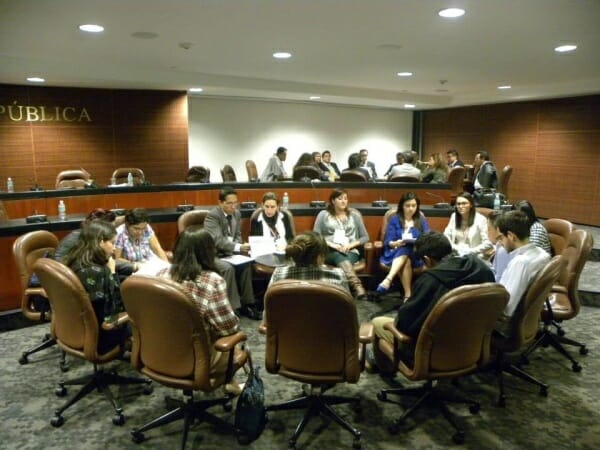
Apr 8, 2015 | Focolare Worldwide
 “Hi, my name’s Abraham, and I come from Mexico: a population of noble and deeply religious people, with their arms spread out to the world.” These were his opening words to an audience of 300 young people in a hall of the Italian Parliament, who gathered to pay homage to Chiara Lubich and her prophetic vision of politics. Abraham has brought along his background in a country torn apart by narcotrafficking and the lords of death. He himself had lived the experience of having a gun pointed at his head by the police who mistook him for a drug pusher while the real one was standing beside him, forced by poverty to take that path. “In 2006,” he continued, “the battle against narcotraffic was a war that in eight years had left on the field more war victims than in Vietnam, among which were many innocent people who struggle every day to maintain their civil commitment: journalists, activists, etc. Often the people protested against the Government which has been losing its credibility amid a strong social and economic crisis”
“Hi, my name’s Abraham, and I come from Mexico: a population of noble and deeply religious people, with their arms spread out to the world.” These were his opening words to an audience of 300 young people in a hall of the Italian Parliament, who gathered to pay homage to Chiara Lubich and her prophetic vision of politics. Abraham has brought along his background in a country torn apart by narcotrafficking and the lords of death. He himself had lived the experience of having a gun pointed at his head by the police who mistook him for a drug pusher while the real one was standing beside him, forced by poverty to take that path. “In 2006,” he continued, “the battle against narcotraffic was a war that in eight years had left on the field more war victims than in Vietnam, among which were many innocent people who struggle every day to maintain their civil commitment: journalists, activists, etc. Often the people protested against the Government which has been losing its credibility amid a strong social and economic crisis”
“I live in Mexico City where every day, we are faced with a new challenge; despite this I believe in a united world and in the ideal of a united world and universal brotherhood. But I know that change has to start from myself, without expecting it from the others and not even from the authorities.”
“If I were you, who are so concerned for the common good in Mexico,” affirmed Luigino Bruni addressing the youth – I would try to look at the causes of this disease, among which is financial capitalism that increases the inequalities. These are types of wealth that are no longer inclusive.» «The first step to take when one wishes to change a country is to love it,» the economist underlined again, spurred by the testimonial of Abraham. «Every country has its vocation to beauty, its own genius, and identity, though ambivalent.» And then an advice: study more, learn a profession! «Are you a minority? It does not matter. Just a handful would suffice, few but really very motivated. It is the prophetic minority that changes the world. And do not stop believing that a different world is possible. The first battle to fight when we are young is to not lose faith in the ideal. We have to believe in the impossible in order to have a good possibility.“
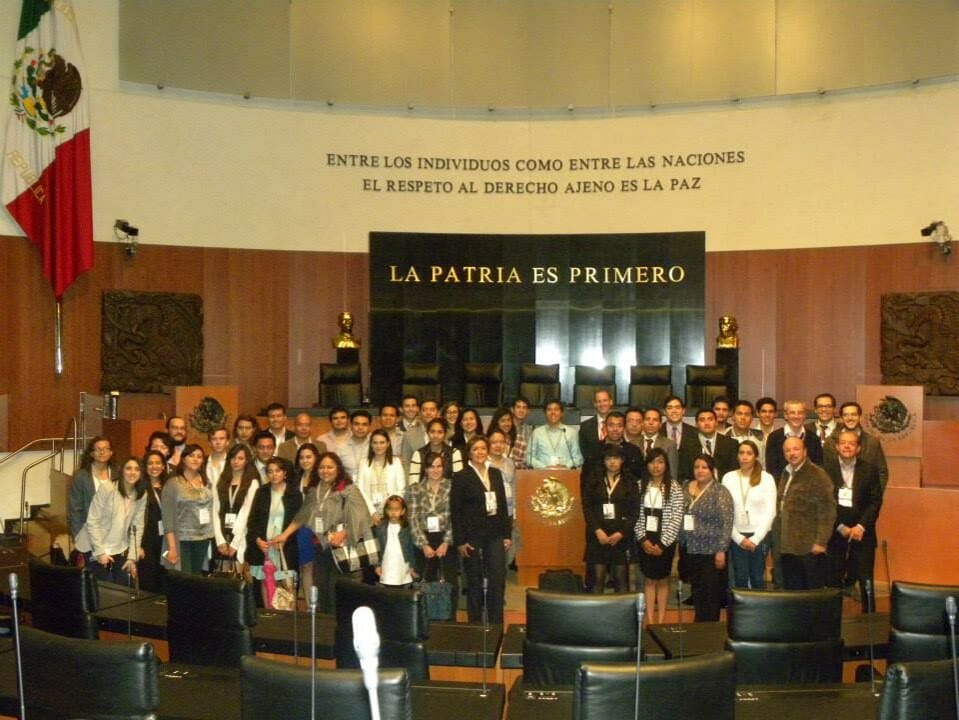
At the Mexican Senate
“Some offered me drugs many times, others robbed me,” continued Abraham, “Some time ago while going home after school, a boy approached me asking for a cigarette. At the same time the police arrived to arrest us. He had drugs in his pocket while I only had books in my backpack. They started to beat him up while the other policeman held a gun at my head, asking me where the drugs were. When the police left, I helped this boy to his feet and gave him the little money I had. He embraced me and said: “You know, I feed my family with these few coins?” I realised how a small act of love really releases great strength and we never know how far it will go. Despite my feeling so helpless, I want to try and see my neighbours and the people I meet on the street with new eyes, and with other friends I want to give a concrete contribution.
“In my desire to a greater commitment for the good of my country, despite the many difficulties and discouragement of many, on 20 March the youth of diverse organisations met in the Mexican Senate for a day’s event with politicians on dialogue, which is very important in a world that is awaiting the answers to bigger challenges.”
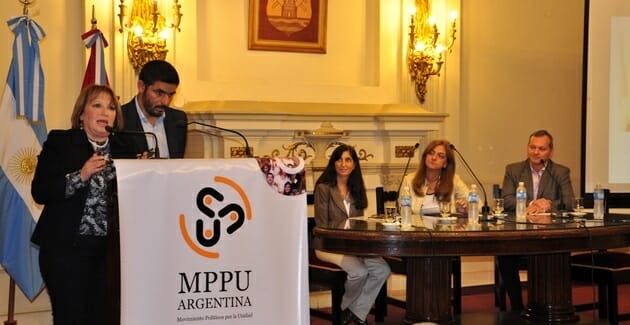
Apr 7, 2015 | Focolare Worldwide
 “Chiara Lubich has brought understanding and gentleness, but basically what she has given to us, through her simplicity, is a great current of love towards the other person. To live in community, to know how to share, to work for the common good and to succeed in building fraternity also through diverse political viewpoints, this in summary is her message.” So stated Alicia Monic Pregno, Vice-Governor for the Province of Cordoba (Argentina), in the context of this international acknowledgement of the inheritance transmitted through the thought and life of Chiara Lubich. During its session on 25 March 2015, the House of Representatives in the Province, approved the posthumous decree in recognition of the Work of Focolare Movement founder.
“Chiara Lubich has brought understanding and gentleness, but basically what she has given to us, through her simplicity, is a great current of love towards the other person. To live in community, to know how to share, to work for the common good and to succeed in building fraternity also through diverse political viewpoints, this in summary is her message.” So stated Alicia Monic Pregno, Vice-Governor for the Province of Cordoba (Argentina), in the context of this international acknowledgement of the inheritance transmitted through the thought and life of Chiara Lubich. During its session on 25 March 2015, the House of Representatives in the Province, approved the posthumous decree in recognition of the Work of Focolare Movement founder.
The ceremony was held in the same parliamentary hall in the presence of a huge crowd which included members of parliament of different political parties, representatives of Comipaz (Interreligious Committee for Peace), young political students of the Movement of Politics & Policies for Unity, university professors, members of social organisation, and others.
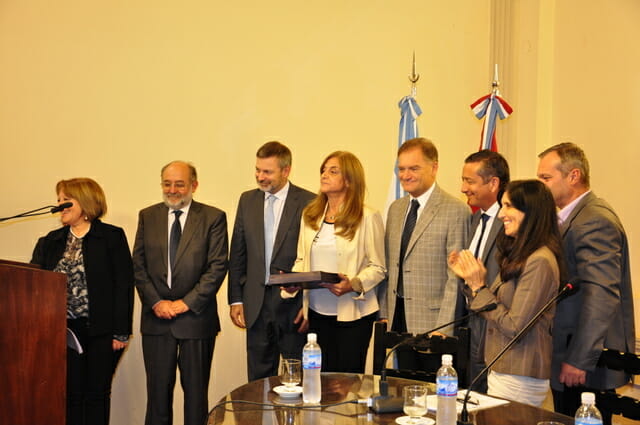 The delegates of the Focolare Movement in Cordoba presented the figure of Chiara Lubich and immediately afterwards the Vice-Governor invited politicians from different political parties to carry out the symbolic gesture of consigning to them, all together, the decree and the commemorative plaque.
The delegates of the Focolare Movement in Cordoba presented the figure of Chiara Lubich and immediately afterwards the Vice-Governor invited politicians from different political parties to carry out the symbolic gesture of consigning to them, all together, the decree and the commemorative plaque.
Alicia Monica Pregno then went on to explain the motivations for the award: the contribution towards the building up of a community which promotes the “spirituality of unity”, adding that “Lubich’s message raises many questions which lead us to reflect on the reason behind all the conflicts, on why we are not always able to think things out together.” She said, “I believe that the world is called to journey towards a better destiny, and this is achievable in the measure that we lay aside our personal interests and are open to resolve issues through a shared outlook. This is a great challenge in these times characterised by much individualism.”
Pastor Raffa, representing Comipaz, then spoke. He emphasised the contribution of the charism of Chiara Lubich to the “birth of this commission right from the beginning”; and Soher El Sucaría, political activist, shared how through an experience lived within the Interreligious Committee for Peace, the value of this service became more and more evident.
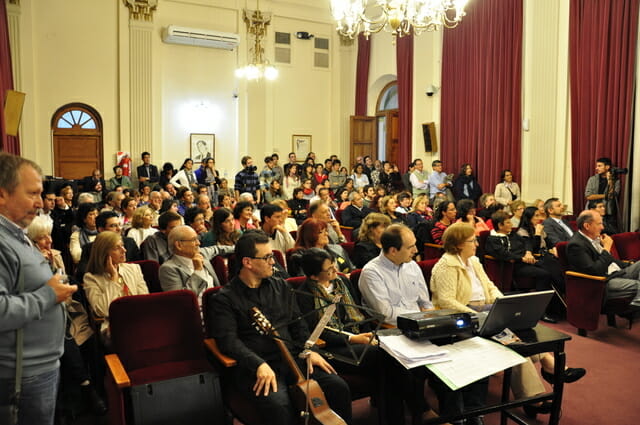 Several testimonies by individual citizens then followed. They told stories of personal transformation and their commitment to local politics: from joining forces with neighbours in order to resolve the problems of their neighbourhoods, to assuming political commitment on a regional and national level. This part of the program was conducted through two round tables. The first, entitled “Fraternity, Seed of Social Transformation”, included the participation of Estela Daima (Director of a Caritas Department in Rio III which conducts a break-making activity involving 40 women), Paola Chávez, Secretary of Fazenda de la Esperanza association (who presented the testimony of Agustina, a reformed juvenile criminal), and Ricardo Galli, economist and entrepreneur of an Economy of Communion project.
Several testimonies by individual citizens then followed. They told stories of personal transformation and their commitment to local politics: from joining forces with neighbours in order to resolve the problems of their neighbourhoods, to assuming political commitment on a regional and national level. This part of the program was conducted through two round tables. The first, entitled “Fraternity, Seed of Social Transformation”, included the participation of Estela Daima (Director of a Caritas Department in Rio III which conducts a break-making activity involving 40 women), Paola Chávez, Secretary of Fazenda de la Esperanza association (who presented the testimony of Agustina, a reformed juvenile criminal), and Ricardo Galli, economist and entrepreneur of an Economy of Communion project.
In the round table entitled “The Contribution of Fraternity to Politics: Experiences and Challenges”, Laura Blanco, a socialist, presented the Schools of Politics organised in Parliament House, as well as her commitment to live fraternity in the political arena. Other speakers included Julio Bañuelos, Mayor of Mina Clavero, and Guillermo Castillo, member of the Christian Democratic Party and public administrator.
In all those present there was the certainty that when fraternity is lived as a political goal, it provides answers to the challenges of today which call for a society that is more just and all-embracing.
In conclusion, the Vice-Governor expressed her appreciation that the Parliament of Cordoba is the centre for the Schools of Politics for young people and underlined the efforts which are being made in living the concept of fraternity within Parliament itself.
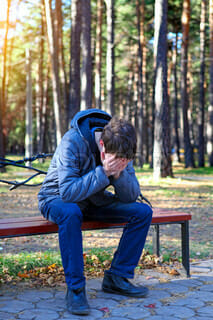
Apr 6, 2015 | Non categorizzato
 Like the Prodigal Son
Like the Prodigal Son
“Our eldest 17 year-old son didn’t come back home one night. What were we to think? He had never caused us worry before. All we could do was pray. The next morning, through the parents of two of his friends, we found out that the three of them had gone to Florence. Somebody wanted to call the police, another insisted he would have nothing more to do with his son. My wife and I, instead, tried to remain calm; we had put everything in God’s hands. Every so often, we would receive some news of them.
While it was a big suffering, we felt very united as a family. There was one thing we all agreed on: we would have welcomed him back with joy, just like in the parable of the prodigal son, without laying on the guilt for his childish behaviour. A week later, the three of them came back home. Our son, having felt our love, was truly sorry for what he had done and assured us he would never do anything like that again. When he found out that his mates had been treated somewhat differently, he was all the more grateful for having a family where everyone tries to live the Gospel.” F.A. – Rome
A Shared Suffering
“The father and sister of my daughter’s friend died in an accident. I had lost my father in similar circumstances. Even though I only knew her mother by sight, when I heard what had happened, I felt compelled to visit her. But I didn’t want it to be just a simple visit. Knowing that she was in financial difficulties, I took her various food items and I tried to console her. I visited her quite often. I even gave her some money I had set aside for us. As time went by, she felt much stronger, more reassured and grateful for the friendship which had blossomed among us, thanks to the suffering that we shared.” B.G. – Bolivia
The beanie
“It was winter time and my friends and I were playing in the school yard. It was very cold. At one stage, a little girl started crying. Her woollen hat didn’t quite cover her ears and they were so cold they hurt her. I wanted to love Jesus in her so I gave her my own beanie which kept her warm.” J. – Belgium
Morning tea
“I was having a snack in the playground. I saw a friend of mine pull another girl’s hair. I left my snack on the wall and I went up to her to say not to do that because Jesus said that we had to love all the time. But then, since both of them started crying, I went to get my snack and I shared it with both of them. It’s true that I was quite hungry, but I was happy because I was able to love.” Valentina – Italia.
Source: “The Daily Gospel” April 2015, Città Nuova publishing house
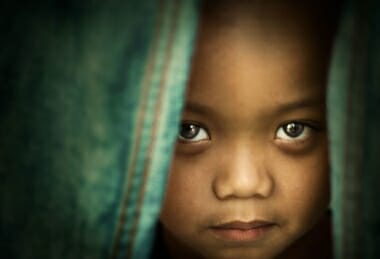
Apr 4, 2015 | Non categorizzato

“I wish that we could all have Easter eyes
Capable of looking
into death, until we see life
into the hurts, until we see forgiveness,
into separation, until we see unity,
into the wounds, until we see glory,
into the human person, until we see God,
into God, until we see the human person,
into Myself until I see You.
And in addition to this, to see the power of Easter!”
(Easter 1993)
Klaus Hemmerle, “La luce dentro le cose”, Città Nuova, Rome 1998, p. 110.

Apr 3, 2015 | Focolare Worldwide
 “Oh, there’s a light with nails on it!
“Oh, there’s a light with nails on it!
So exclaims a child in front of the Paschal candle.
We can feel the nails.
But can we see the Light?
And what about us … do we give out light?
We are nailed
to ourselves and to others;
to our time and our responsibilities.
The Holy One has allowed himself to be nailed to our cross.
And it was from there that he come down.
He was nailed right up until he died.
In this way he became light for everyone;
that light which penetrates closed doors.
He is risen
and shows the signs of the nails.
Light which was nailed.
We feel the nails.
But can we see the Light? And what about us … do we give light?
(From a pastoral letter on the occasion of Easter 1984)
Klaus Hemmerle, “La luce dentro le cose”, Città Nuova, Rome 1998, p. 109.
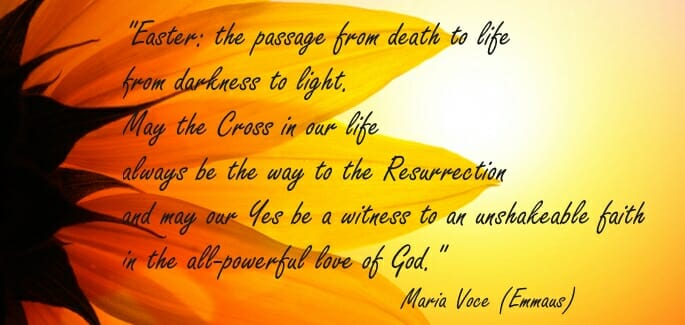
Apr 2, 2015 | Non categorizzato


Apr 1, 2015 | Non categorizzato
 “In the Easter Liturgy we thank God for having made Christ shine in all His splendour after He saved humankind through the Paschal Mystery. He fills the Church with the Holy Spirit and admirably enriches it with heavenly gifts. Among these is the royal priesthood, which is conferred on the faithful in baptism. Hence, the Church is holy, filled with the Holy Spirit. It is the Body of Christ who is total holiness. Christ instituted the Church to continue the Redemption with her. He made her the means of liberation from evil and of the attraction to what is good. She is the Gospel fulfilled, humankind recuperated, life with God in perennial unity, uninterrupted sharing of grace: this is the Church.
“In the Easter Liturgy we thank God for having made Christ shine in all His splendour after He saved humankind through the Paschal Mystery. He fills the Church with the Holy Spirit and admirably enriches it with heavenly gifts. Among these is the royal priesthood, which is conferred on the faithful in baptism. Hence, the Church is holy, filled with the Holy Spirit. It is the Body of Christ who is total holiness. Christ instituted the Church to continue the Redemption with her. He made her the means of liberation from evil and of the attraction to what is good. She is the Gospel fulfilled, humankind recuperated, life with God in perennial unity, uninterrupted sharing of grace: this is the Church.
And we are the Church, joined together by the Sacraments and the Doctrine with the pope and bishops. We form a social body whose arteries carry the Blood of Christ whose soul is the Holy Spirit, the Source of holiness. So the Church is the worthy dwelling of the Divine Trinity on earth. Manzoni calls her: ‘Mother of the saints, an image of the Eternal City’. Our sanctification is her task. The Paschal Mystery summarises the reason for our existence on this planet and the reason for which the very Son of God came down to earth and was crucified.”
Giordani goes on to underscore humankind’s longing for holiness and truth, which rejects a dull existence without warmth, but desires to thrive. This is why we go wrong when we offer a languid, uncertain Christianity, deceiving ourselves into thinking that this is how we will draw people in.
“This ‘saying without saying’ generates a desert region, a no man’s land. It is of no service to the Lord whose word was always quite explicit. It doesn’t serve God and provokes the disgust of the very ones who think they are rendering the idea of religion more appetising.
Those who have attenuated the truth, who have camouflaged the Cross and used it as a wall decoration have extracted from the people the beauty, truth and power of the Divine command that invites us to give body, soul and all that we are to God. We are meant to stand on the side of Christ to the point of becoming Him. The Gospel teaches us to say yes when we mean yes, and no when we mean no. This ‘neither this nor that’ approach defaces the truth and nullifies the Church. Sanctify them in the truth; your word is truth! This is what Jesus asked of the Father as he was about to consummate his supreme sacrifice of love. Sanctify them in the truth, not in neutrality, mediocrity, or banality.
If you totally embrace Christ, then anything you do during the day professes the faith. Then life becomes a marvellous undertaking, an uninterrupted liturgy where, rich or poor, ailing or sound, man or woman, young or old – everyone has something to do for the edification of all, edifying an eternal destiny with the material elements of a temporal existence. This is sanctification. It is by no means a desertion from life. It is living life, completely – a healthy life.
Christ asks everyone – even you and me – to follow Him by breaking with the past, with everything that is dead, and to rediscover the joy of our youth. This is freedom.
Then, the Church, through which the Saviour continues to bestow health, appears as a Divine minister of health: a sacrament that alleviates death with resurrection.”
Igino Giordani, Il mistero pasquale, (Rome; Città Nuova, March 25, 1977), pp.24-25.
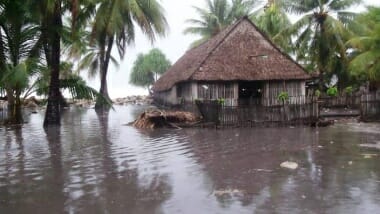
Mar 31, 2015 | Non categorizzato
 The main causeway connecting the capital and the port with the rest of the Island of Tarawa, the largest in the archipelago of Kiribati, situated in Oceania, has been destroyed. Seawalls have broken down and many of the traditional houses close to the water are gone. Cyclone Pam, one of the most violent cyclones registered in the South Pacific region, hit the island nations of Vanuatu, Solomon Islands and Kiribati. Massive waves were whipped up by winds of 250/300 km per hour. The local Red Cross says there is a lack of emergency housing, food and drinking water for most of the 253,000 inhabitants and people living in the most affected areas are being evacuated.
The main causeway connecting the capital and the port with the rest of the Island of Tarawa, the largest in the archipelago of Kiribati, situated in Oceania, has been destroyed. Seawalls have broken down and many of the traditional houses close to the water are gone. Cyclone Pam, one of the most violent cyclones registered in the South Pacific region, hit the island nations of Vanuatu, Solomon Islands and Kiribati. Massive waves were whipped up by winds of 250/300 km per hour. The local Red Cross says there is a lack of emergency housing, food and drinking water for most of the 253,000 inhabitants and people living in the most affected areas are being evacuated.
Mary Cass, coordinator of the AMU project, writes from Perth, Australia: “We have received emails from our Focolare community there. The people are safe and joining in the work to re-build and find food and water for the families of Buota (the village where the project is administered), which is also cut off at this time due to inaccessibility, since the road and bridge connecting them to the rest of Tarawa are down. They have very much in mind the Word of Life for this month which encourages everyone to ‘take up their cross’, and hope to meet together to share experiences and to reinforce their unity during this difficult time.”
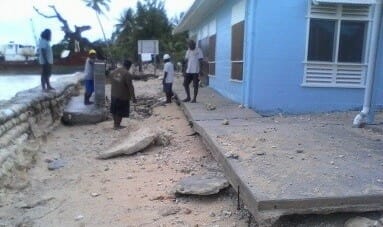 “The weather is getting back to normal,” a member of the local community writes. “The waves are smiling again. We are thankful that everyone is okay.”
“The weather is getting back to normal,” a member of the local community writes. “The waves are smiling again. We are thankful that everyone is okay.”
But while the spirit and the dignity of the inhabitants of Tarawa is admirable, the situation is indeed very serious: contamination of drinking water wells and tank; shortage of food due to the destruction of crops and the hindrance of travel; shortage of diesel fuel; 80% destruction of local native housing…
Furthermore, the Republic of Kiribati has another huge problem. The increased sea levels have had an impact on agriculture with negative effects on nourishment and employment. Only 10% of the population has regular work. Cited as the first country that will disappear as a result of global warming and increased sea levels, the Kiribati Government have been preparing for mass evacuation of the islands to other countries within a few decades.
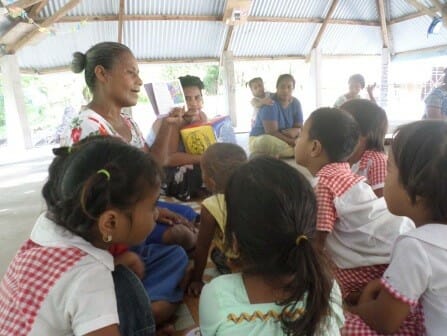 The project administered by AMU (an NGO of the Focolare Movement) aims to improve the education and living standards of the local people of Buota, considered one of the poorest villages on the main Island of Tarawa, through initiatives particularly for woman and children. There is also assistance for the development of craft activities and small business ventures.
The project administered by AMU (an NGO of the Focolare Movement) aims to improve the education and living standards of the local people of Buota, considered one of the poorest villages on the main Island of Tarawa, through initiatives particularly for woman and children. There is also assistance for the development of craft activities and small business ventures.
“One such activity,” continues Mary Cass, “is the production of ice blocks due to the acquisition of a freezer; another is sewing and craft-making where handicrafts are sold at the Tarawa airport twice weekly. The purchase of a sewing machine through AMU funding has made this possible. The bread making activity is also doing well with bread and buns being sold in roadside shops in surrounding areas.
The proceeds from these activities, other than giving work to the women involved, go to the pre-school called ‘Love and Unity’ and provides basic food and nourishment for children and their families.”
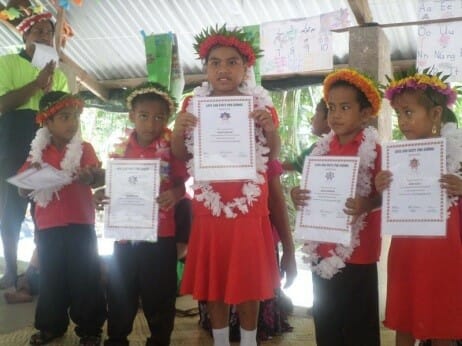 How does one live in a nation which has no future? “The life of the local Focolare community in Buota is forging ahead. “The Word of Life groups,” they write, “unite the people spread across the whole stretch of land. The Bishop of Tarawa, through the help of priests, translates the commentary on the Word of Life in the local Gilbertese language. The families help each other to re-build their homes destroyed by natural calamities and they come together to share their experiences once they manage to put a roof over their heads. The community has named their formation centre (which encompasses a little school) Loppiano Centre of Unity and Love – in reference to the first little town of the Focolare in Italy – with the desire to be a witness of love and unity for everyone.”
How does one live in a nation which has no future? “The life of the local Focolare community in Buota is forging ahead. “The Word of Life groups,” they write, “unite the people spread across the whole stretch of land. The Bishop of Tarawa, through the help of priests, translates the commentary on the Word of Life in the local Gilbertese language. The families help each other to re-build their homes destroyed by natural calamities and they come together to share their experiences once they manage to put a roof over their heads. The community has named their formation centre (which encompasses a little school) Loppiano Centre of Unity and Love – in reference to the first little town of the Focolare in Italy – with the desire to be a witness of love and unity for everyone.”
See also:
AMU Project Description (Italian)
AMU Newsletter n. 1/2015 (Italian)
Video on Facebook
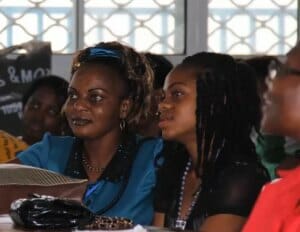
Mar 30, 2015 | Focolare Worldwide
 “Everyone would like to see the Economy of Communion project expand in Africa, out of love for Africa, in order to understand its cultures and practice reciprocity and communion,” said Luigino Bruni, international coordinator of the EoC project, as he looked ahead to the upcoming international gathering in May. That gathering will take place in Kenya, Nairobi, with international representatives from the EoC who will share ideas, innovations and production, but also work, microcredit, inequality and poverty. The African businesses which, from this year, have begun to share their profits with the poor of the world have grown to ten businesses, while twelve businesses are heading in that direction. This is all thanks to a growing spreading of a culture of economy of communion in Africa.
“Everyone would like to see the Economy of Communion project expand in Africa, out of love for Africa, in order to understand its cultures and practice reciprocity and communion,” said Luigino Bruni, international coordinator of the EoC project, as he looked ahead to the upcoming international gathering in May. That gathering will take place in Kenya, Nairobi, with international representatives from the EoC who will share ideas, innovations and production, but also work, microcredit, inequality and poverty. The African businesses which, from this year, have begun to share their profits with the poor of the world have grown to ten businesses, while twelve businesses are heading in that direction. This is all thanks to a growing spreading of a culture of economy of communion in Africa.
This was demonstrated with the recent international conference (February 9-13), which was hosted by Cameroon University, the Catholic University of Buea (CUIB) at the request of the university’s Rector, Fr.. George Kkeze, and by the Bishop, Emmanuel Bushu.
Speakers included Benedetto Gui, currently a professor at Sophia University Institute (Florence, Italy) and Brice Kemguem, National Director for Central Africa in the international ngo named AHA (African Humanitarian Agency). They were accompanied by Steve William Azeumo, from the EoC Commission of the Central African area, Winnifred Nwafor, from the EoC Commission of Fontem, Cameroon, Isabel Awungnjia Atem and Mabih Nji, both graduates of the Sophia University Institute in the role of local facilitators at CUIB.
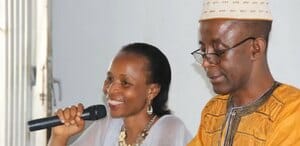 The topics included in the programme have ranged from contemporary economic issues that are dear to the Social Doctrine of the Church and that we find in the values and principles of the EoC, to the great economic and social problems of our time and the shortage of drinking water, epidemics and armed conflicts with weapons of mass destruction.
The topics included in the programme have ranged from contemporary economic issues that are dear to the Social Doctrine of the Church and that we find in the values and principles of the EoC, to the great economic and social problems of our time and the shortage of drinking water, epidemics and armed conflicts with weapons of mass destruction.
Thanks to the video conference connection, it was possible to get to know experiences from around the world. A connection made with the Sophia University Institute facilitated an exchange between the students of the two institutions. After that, two EoC entrepreneurs shared their experiences: Alberto Ferrucci, managing director of a company that produces software for refineries emphasized various aspects of an economy of sharing, a new proposal to solve the economic problems of our age. Teresa Ganzon (manager of the Philippine Rural Bank Bangko Kabayan) reminded participants of the principles of good corporate management that led her to resume her studies in adulthood in order to acquire the necessary knowledge and skills to manage the bank, helping the increase of activity of rural microfinance (micro-credit to farmers and small traders) in the area.
Some Cameroonian experiences were also shared, such as that of chief Fobella Morfaw and his wife, who founded a school in the town of Dschang in 2003 which today consists of a kindergarten, primary and secondary schools; or that of the Civil Engineering Studio at BSE (Bridge Structure Engineering Consulting) that thanks to the great experience of a ‘senior’ partner has now got to the point of getting by and managing well in the midst of a very fierce competition. The studio benefited from the financial and moral support of the Gimou couple; in the days immediately preceding the school Mrs. Marie Madeleine Gimou left this earth and this has deeply moved the participants of the conference. Her husband M. Victor Gimou who has been an engineer for over 23 years continues to support the young studio and to offer access to his library collected throughout his more than 30 years of work.
A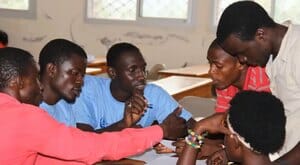 n important part of the program was composed of the workshops in the afternoon, aimed to discuss cases of companies and to prepare projects of micro-enterprises: these had a high attendance and caused amazement because of the quality of the papers presented in the plenary sessions; the best EoC business plan was awarded in the concluding session.
n important part of the program was composed of the workshops in the afternoon, aimed to discuss cases of companies and to prepare projects of micro-enterprises: these had a high attendance and caused amazement because of the quality of the papers presented in the plenary sessions; the best EoC business plan was awarded in the concluding session.
If we want to make a small balance: we were treated to a very fruitful week, thanks to the preparatory work done by the University and the very positive attitude of the young people who volunteered to participate, also encouraged by a recognition of university credits in exchange. There was a very sympathetic register and a cheerful atmosphere throughout the conference: the intervals were often filled with fun activities, a little dance or music. The evening of celebration was simply breathtaking, with songs and dances organized by the young people, with that “little extra atmosphere” that was created by the light of the phones, because there was a sudden blackout.
Participants had very positive impressions: many of them admitted that, in addition to proposing a style of enterprise management, the EoC is also a “proposal of life” that you can put into practice immediately, and many declared they wanted to follow it. In short: a lot of positive vibes and desire to do and work for a better world.
Edc online
Video of the Conference:
https://www.youtube.com/watch?v=RxwKXsEvmn0
![PRESET Eco-sustainability Project in Argentina]()
Mar 29, 2015 | Non categorizzato, Word of
 Audio of the Word of Life
Audio of the Word of Life
Paul offers us a superb way of being truly love for one another, by ‘making ourselves one’ with them.
In his first letter to the community in Corinth, from which the Word of Life for this month comes, Paul has to defend himself against the scant regard some Christians show for him. They called into question or denied that he was an apostle. After demonstrating fully his qualifications as an apostle because he had ‘seen Jesus Christ’ (see 9:1), Paul explained why he acted with humility and deference to the point of even giving up any payment for his work. While he could have asserted his authority and his rights as an apostle, he preferred to make himself ‘the servant of all’. This is his evangelical strategy.
He enters into solidarity with every kind of person, to the point of becoming one of them, with the aim of bringing the freshness of the Gospel. Five times he repeats ‘I made myself’ one with the other: with Jews, out of love for them, he puts himself under the Mosaic Law even though he said he was not bound by it; with non-Jews, who did not follow the Law of Moses, he lived as someone not under the Mosaic Law, because he had instead a more demanding law, Jesus himself; with those who came to be called the ‘weak’ (probably scrupulous Christians), who worried about whether they should eat the flesh of animals sacrificed to idols, he too became weak even though he was ‘strong’ and experienced a tremendous liberty. In a word, he made himself ‘all things to all people.’
Every time he repeats that he acts like this to ‘win’ each for Christ, to ‘save’ by any means at least someone. He has no illusions, is without triumphalist expectations, knows well that only a number will respond to his love. All the same he loves everyone and puts himself at the service of all according to the example of the Lord, who ‘came not to be served but to serve, and to give his life as a ransom for many’ (Mt 20:28). Who has made himself one with us more than Jesus? He who was God ‘emptied himself, taking the form of a slave, being born in human likeness’ (Phil 2:7).
‘I have become all things to all people.’
Chiara Lubich made this word one of the key points of her ‘art of loving’, summed up in the expression ‘to make yourself one.’ She saw in it an expression of the ‘diplomacy’ of charity. She wrote, ‘When someone weeps, we must weep too. And if someone laughs, we too rejoice . Thus the cross is divided and borne by many shoulders, and joy is multiplied and shared by many hearts…. Making ourselves one with our neighbour for love of Jesus, with the love of Jesus, so that our neighbour, sweetly wounded by the love of God in us, will want to make himself or herself one with us, in a mutual exchange of help, of ideals, of projects, of affections…. This is the diplomacy of charity, which has many of the expressions and features of ordinary diplomacy; hence it does not say all that it could say, for this would displease others and would be disagreeable to God. It knows how to wait, how to speak, how to reach its goal. It is the divine diplomacy of the Word who becomes flesh to make us divine.’
With the skill of a teacher, Chiara also discerns the daily difficulties we have in ‘making ourselves one’: ‘At times we are distracted, at times we have the unfortunate desire to be hasty in saying what we think, in giving our advice at the wrong moment. On other occasions, we are not really open to making ourselves one with our neighbour because we reckon that they do not understand our love, or we are held back by other kinds of judgements. In some cases we are hampered by a hidden wish to conquer the other person to our cause.’ For this reason ‘it is really necessary to cut with or set aside all that fills our minds and our hearts so that we can make ourselves one with others.’ It is thus a love that is constant and tireless, which carries on through thick and thin and is not on the look-out for anything for itself, and that in turn entrusts itself to the greater and stronger love of God.
These are useful ideas that can help us to live the Word of Life this month, by listening sincerely to the other person, understanding the other from within, identifying with what he or she is living and feeling, sharing his or her worries and joys:
‘I have become all things to all people.’
We cannot interpret this invitation of the Gospel as a request to renounce our convictions, as if we approved uncritically of any kind of behaviour in other people and did not have our own life-choices and our own way of thinking. If we have loved to the point of becoming the other, and if what we have shared has been a gift of love and has created a sincere relationship, we can and we must express our own ideas, even though perhaps they may cause pain, all the while remaining in an attitude of profound love. Making ourselves one is not a sign of weakness, nor of looking for a calm and easy way of living together. Instead, it is the expression of a person who is free who chooses to be at the service of others; it demands courage and determination.
It is important to bear in mind the purpose of making ourselves one.
Paul’s words that we are living this month, as we have already hinted, go on to say ‘by any means save some.’ Paul justifies his making himself one with the desire to bring people salvation. It is a way of entering into the other, to draw out the good and the truth within them, to put an end to any errors there may be and set down a seed of the Gospel. It is a task that for the apostle admits of no limits or excuses, that cannot be ducked because it has been entrusted to him by God himself, and he must do it ‘by all means’, with that creativity which only love can bring.
This is the intention that, in the end, motivates our ‘making ourselves one’. Politics and commerce also wish to come close to people, to enter into their way of thinking, to understand their longings and needs, but they always want some kind of return. Instead, Chiara would say, ‘Divine diplomacy has this greatness and this property, perhaps a property of it alone: it is moved by the good of the other and is therefore devoid of any shadow of selfishness.’
‘Making ourselves one’ therefore, to help everyone grow in love and so contribute to making people universally brothers and sisters, God’s dream for humanity, the reason that Jesus gave his life.
Fabio Ciardi
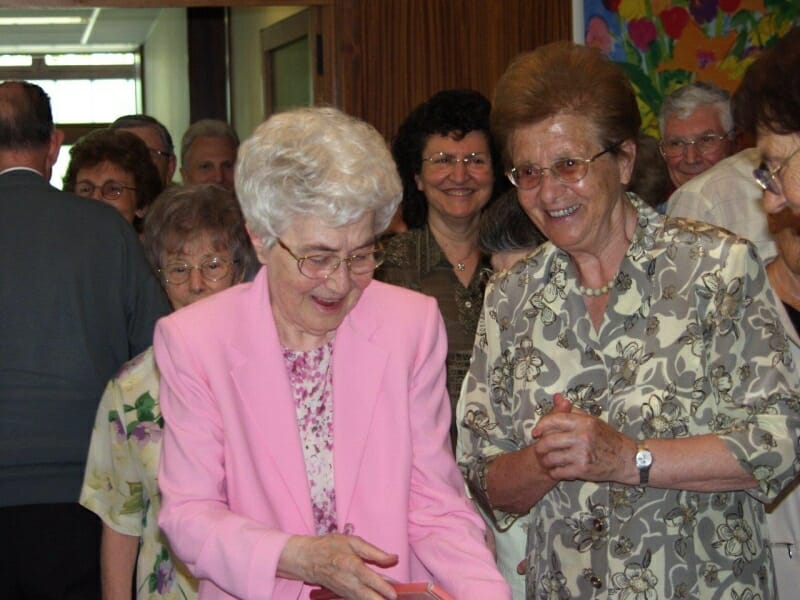
Mar 28, 2015 | Non categorizzato

Palmira with Chiara Lubich

Mar 27, 2015 | Non categorizzato

Istanbul: Patriarch Bartholomew does the honours in the Orthodox church of Aya Strati Taksiarhi, at an event involving more than a hundred representatives from the Orthodox and Catholic world, marking the 7th anniversary of Focolare foundress, Chiara Lubich. Attendees included the Metropolitans Ireneos, Apostolos and Elpidophoros; two Archimendrites, Father Vangeli who translated the books from Greek into Turk; and the Great Archimendrite Vissarion. Also attending: Armenian Catholic Archbishop, Levon Zekiyan and the Catholic Bishop, Louis Palâtre, as well as many others. The books were presented by Maria Caterina Atzori, linguist from the Focolare’s Centre for Studies who translated the books into Greek. The moderator was journalist Nikos Papachristou from Athens.
“During the course of the centuries, the divine epiphany of the Lord has been manifested in many ways, so that the human family could understand the things of God,” the Patriarch exhorted, after he opened the event with a prayer for Chiara, and intoning the hymn to the Holy Spirit. “He has never tired of raising up holy men and holy women who, through their example, with their love founded on divine philanthropy, and with their word inspired by the Holy Spirit, have continually solicited a metanoia, a conversion of heart for the whole of suffering humanity.”
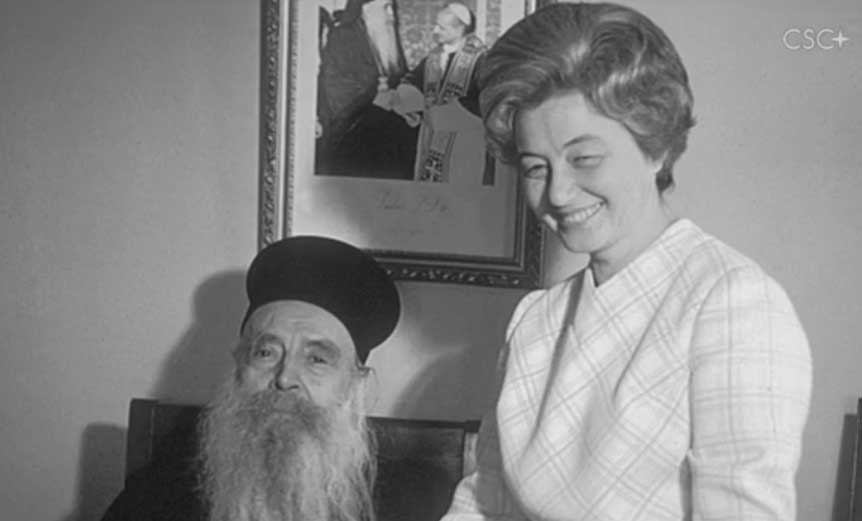
Video “Atenagora, Paolo VI and Chiara Lubich”
In his speech, he described the spiritual figure of Chiara, beginning with his direct testimony as an eye witness of the encounters between Chiara and Patriarch Athenagoras: “How could one not embrace the Wisdom of God in the blessed work that our sister Chiara has offered to our Churches, to our societies and to all people of good will? She whom our beloved Predecessor (. . .) lovingly called Tecla, the disciple of Paul, the woman who is equal to the Apostles.”
Then he outlined the salient points of the path of spirituality that she opened in the Church and beyond: “Gentle Chiara had answered God’s call, being totally conformed to her Master, but especially allowing herself to be made into a vessel that offers salvation, in order to bring all to Christ. Her life was spent in finding paths of encounter and dialogue with everyone, distinguished by a profound respect for every culture in which she knew how to conduct a journey of encounter, mutual understanding and mutual collaboration.”
“Chiara Lubich began her life journey, dedicated to the Lord, in the suffering of war. In this suffering she lived the Jesus Crucified and Forsaken, and understood that there is no Resurrection without passing through the downfall. And the suffering of Christ became her personal suffering, but never despair.”
“Her life was characterised by a zeal for Holy Scripture which, in her, became founding Word, living and exhilarating. She lived the Lord’s commandment to its depths: “As I have loved you, you should also love one another” (Jn 13:34). To the point of infecting countless people with this love, different among themselves, but united in a concrete ideal of communion.
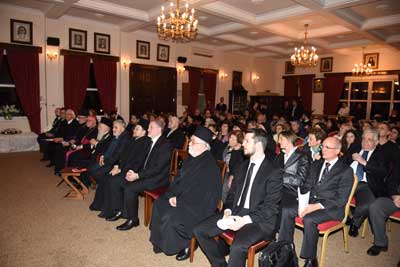 Chiara was ever faithful to her Church. And in this conviction, she felt the drama of the division, of the impossibility to receive from the same Chalice.
Chiara was ever faithful to her Church. And in this conviction, she felt the drama of the division, of the impossibility to receive from the same Chalice.
Perceiving the cry of suffering because of the laceration, she offered herself entirely for the charism of unity, becoming its instrument in the hands of God in meeting the heads of Churches and simple faithful. But she did not stop there: she sought, urged and invited us to find new paths of communion.”
“Chiara had a totally particular love for the Holy and Divine Eucharist of the Lord. In the Eucharist she perceived the gift of love from the One who was offered once for all, to draw man to himself. We can say that in her a Eucharistic conscience of unity was formed.” “There is still another aspect that we can see in the work of Chiara: the Unity of the Trinity, through the Eucharist, passes into the family (. . .) The place where mutual love can shine, which joins its members in a totally natural way (. . .) And in this context, the unity of the human family can be glimpsed in all of its aspects, in the society, in politics, in economy, in respect for the work of God for each one of us singularly and in all of His marvelous creation. The message and work of Chiara, therefore, turn out to be ever timely, especially with regards to the global context in which we are living.”
Hence, “the gift that the Focolare Movement today offers in presenting Chiara Lubich in the Greek language is particularly appreciated. We welcome it as a gift amongst brothers and sisters, which will surely be appreciated also by the Greek public. To the Greek-Orthodox faithful this wondrous message of unity and love!”
In conclusion, he turned directly to Chiara that she might intercede “so that the dawn of a new day for this wounded humanity might soon dawn, and that the sentiments for which she had spent her entire life, would produce abundant fruits, wherever today we do not find anything but darkness and bloody martyrdom.”
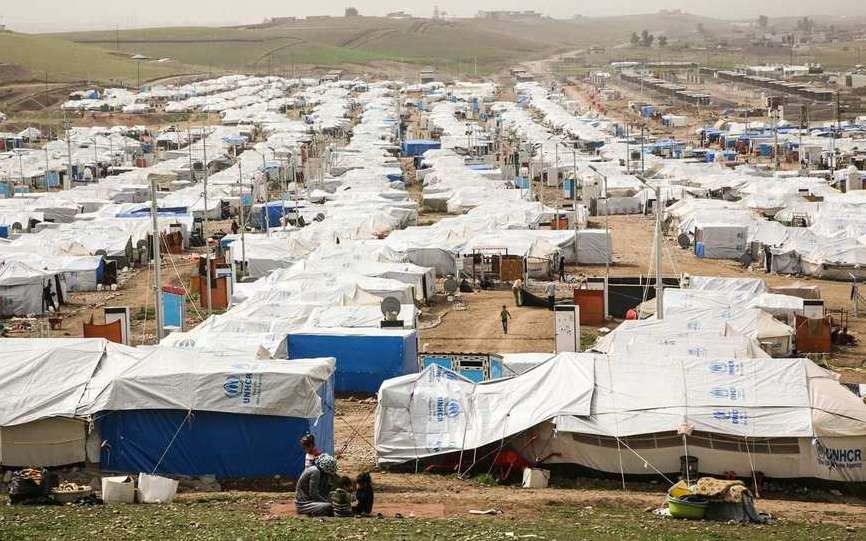
Mar 26, 2015 | Focolare Worldwide

“I live in Erbil, northern Iraq, where I began a school for Kurdish children in 2010,” says Malu Villafane, who born in the Philippines. For the past few years I have been working in a local sanctuary, organising activites and projects. Last August, the shrine was turned into a refugee camp. The cities of Sinjar and Mosul, along with adjacent villages like Qaraqush, Aaramlesh, Bartalla and others, had been invaded by ISIS. The inhabitants fled leaving everything behind, and they took refuge in Kurdistan, with us. There was a very heavy atmosphere in the camp, so much pessimism, children lost and abandoned. Together with the people in charge of the centre, we started up some activities for the teenagers and children, which also involved some of my colleagues from school.”
Over the years, how have Christians, Muslims, Yazidis and other ethnic groups coexisted, such as the Kurds, Turkmen, and so on?
“They respected each other, and did everything together. I work with the Kurds, Turkmen, Arabs and other foreigners. During the crisis many Kurds hosted refugees in their own homes. The Kurdistan people don’t condone this massacre.”
When did the refugee crisis begin in Erbil? Where did they settle? What will they do over the next few months?
“The crisis which caused this forced migration already began in June 2014 and worsened at the beginning of August. The people lost everything: home, work, school. Many of them first took refuge in empty buildings, churches and on the streets. When they could, they stayed with relatives in Erbil. Many non-profit organisations, along with the Church, had to respond to the crisis without any time to prepare. They were in need of everything! Working together we were able to collect a lot of basic necessities. During that period, the temperature rose above 50°C, infernally hot. Now, during the winter it is quite cold. There are not enough tents to house the thousands of families. There are camps without food and water for extended periods of time. Yet, after a few months, the children began to smile and play, to experience something outside the camps, like visiting the swimming pool or public park. The parents see their children’s joy, and rediscover hope. They’ve begun to clean the camp, to cook and give a hand.
After living in this dramatic situation with them, my life was turned upside down. My stay in Iraq took on a very deep meaning: I was living for universal brotherhood.
But does it make sense to work for brotherhood? What pushes you to go on working in the camp?
“If I look at the situation from a human point of view, I become discouraged and feel like escaping. But, if I look at it with the eyes of a hope based on faith, I’m able to go beyond all the suffering I see. I think of the words of the Gospel: “When I was hungry, you gave me something to eat; when I was sad, you comforted me. . .” These words give me strength to face the daily difficulties that I encounter in the camp. It’s not easy to describe all the suffering there is; many of them have lost hope, lost everything. This experience has expanded my heart to welcome everyone as a brother, a sister. It has enabled me to come out of my own comfortable little world and serve others. I want to live for universal brotherhood not because it solves problems, but because, one step at a time, it’s like planting a seed. Peace mostly grows from the small things we do for one another each day.”
What can we do from where we are, to be near to these people?
“I think we need to begin by confronting the topic of “disinformation.” Even though the emergency continues, hardly anyone speaks of it. Spread a culture that welcomes and listens, especially amongst the different races and religions of your cities; promote activities and projects that break down the walls. I thank all of you for your help, and may we continue to believe that Peace is possible.”
Source: Umanità Nuova online
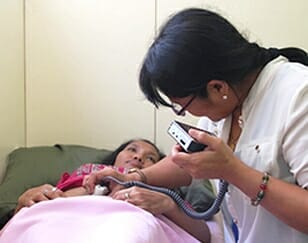
Mar 25, 2015 | Focolare Worldwide
 Working here
Working here
“Being doctors here in the Philippines where there is widespread poverty, my husband and I set up a modest private medical clinic in our small house. It’s certainly was not easy thinking of our colleagues who all have careers in the West. At times we ask if we did well to stay here. But the thought of so many needy people among our own people – children in need of medical care, married couples in need of guidance, the elderly with terminal illnesses. . . The Gospel motivates us to give a personal contribution towards improving society beginning from our own land.” L. R. – Philippines
Moses drawn from the street
“A large family: six children and one on the way, who then died before birth. The mother was saved, but for several days she lingered between life and death. During those days, some military had taken to the hospital in which she was being care for, a newborn that had been abandonend on the street. After some treatment, he recovered but was in need of a family. He immediately found it in that mother who had lost her child. His new parents named him Joseph-Moses, because the hospital is called St. Joseph’s, and Moses because he had been abandoned and found.”H. E. – Congo
I wanted to have my revenge
“I lost my mother just eight days before my marriage. She had been hit by a car, and I decided to have my revenge. I took a bus to the place where the driver lived. On the way, I recalled some words about love of God and neighbour and, little by little, my anger faded. When the other person saw who I was, he turned pale, but I calmed him: I was there only to find out how the accident had happened. After listening to his story, which he shared amidst tears, I tried to put him at peace and the joy promised by the Gospel accompanied me on the return trip.” F.A. – Rome
Source: The Gospel of the Day – March 2015 – Città Nuova editrice
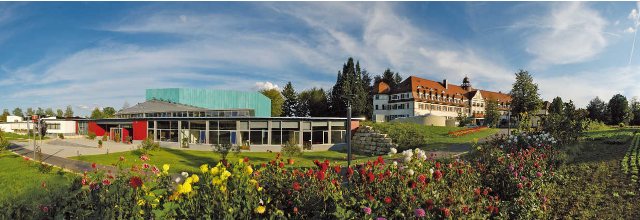
Mar 24, 2015 | Focolare Worldwide

The “Haus Schoenblick” (Schwaebisch Gmuend) Evangelical Training Center
150 heads of evangelical movements and free churches, within the multi-faceted reality of the evangelical world, and with representatives of Catholic movements, posed the query: how to remain faithful to one’s own charism in times of great change?
It is the situation of how various movements that arose over the last century can face the situations today and how they can respond to the various challenges facing Christian ideals, and their searching for new answers, adapted to the times we are living in, though remaining faithful to their roots.
At the “Leaders Convention” Gerhard Pross, moderator and one of the more renowned figures of Together for Europe (network of Christian movements that work together for the benefit of the European continent) and who wanted Focolare President, Chiara Lubich, to be present, as the first successor of Chiara Lubich and as the leader of the Movement.
Maria Voce’s reflection helped to understand the difference between the foundation phases and the “charismatic period,” “full of new, dynamic, luminous surprises,” and the phase of maturity, the “period of creative faithfulness” of a movement, in which, to “grow, develop and multiply” with originality, the inspirational ideas and established by the founder. She went on to recount the Focolare’s commitment to live a widespread leading role of those who live the spirituality and share its aims, and above all, to “go out” more in the “various environments of life and society,” without limiting themselves to living and testifying to unity within the movement, but bringing the spirit and experience of unity to the entire world, “so that all may be one” (John 17.21), the specific aim of the Focolare. “We cannot therefore think of ourselves, Maria Voce affirmed, “we have to “go out” and give of ourselves.” To be able to go beyond ourselves, we need to choose Jesus Forsaken who in his abandonment went beyond himself to unite man once again with God, and unity is one of the main points of the spirituality of unity.
There were members of the evangelical Church, Pentecostal and charismatic movements,
each of which are involved in different way or in social works or on the front of evangelisation, education, political commitment. The “Leaders’ Convention” was created in 1974, well before John Paul II launched in 1998 the communion between movements within the Catholic Church This experience of sharing has therefore continued for some years now. A significant moment which all remembered was in 2000, when with Chiara Lubich at Rothenburg a step forward towards reconciliation was made. In fact the long standing misunderstandings that had developed along the years were cleared up during the “historic moment of mutual forgiveness,” Maria Voce recalled, and which became «a founding experience for communion between movements and communities of different Churches, which later came up with the project “Together for Europe.”
A common step which all look to is the Munich 2016 event, when the “Together for Europe” network will meet for a congress and public manifestation, and will be in turn a step towards the 500th anniversary of Luther’s Reform, offering itself as a prophetic sign of a reconciled and united Europe. On her return from Germany on 4 March, Maria Voce participated in the audience with Pope Francis together with the Bishop-Friends of the Focolare, and conveyed to him the greetings of the 150 representatives of the evangelical movements and their hope in the common commitment for unity. “Very well,” Pope Francis said, when he thanked them. «Your work on the ecumenical front is very important».
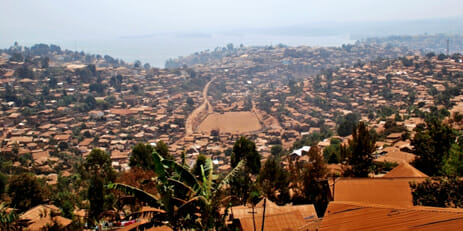
Mar 23, 2015 | Non categorizzato

Bukavu, Democratic Republic of Congo
The Democratic Republic of Congo: a big country with immense natural resources. A population of 72 million with hundreds of ethnic groups. The difficult relationships with the West, the war for the exploitation of minerals, the drama of a forgotten people.
We interviewed the Congolese biologist, Pierre Kabeza, trade union member, a family man who, three years ago, had to leave his city in the Great Lakes region, and who now is at Sophia University Institute.
Why did you have to go on exile, leaving your wife and daughters? Bishop Munxihiwa, bisop of Bukayu who was killed for his battle for justice used to say: «At times there are things we don’t unde stand or see clearly, if not with eyes that have cried.” After his death we were all discouraged but Mons. Kataliko arrived, and decided to follow his footsteps, to speak out in the name of those who have no voice. Kataliko dried the tears of a population which was no longer heeded. On 24 December 1999 he wrote a message denouncing the unjust war, the occupation of Congo by the nearby countries, the exploitation and plunder of mineral resources. This was why they stopped him from doing his pastoral work for 7 months and 20 days. The bells no longer rang. We did sit-in protests every day until he returned to the Diocese. Muslims and Christians of Bukavu, went together to the cathedral where Bishop Kataliko offered mass and forgiveness for those who had made him suffer. He died in Italy a few weeks later.
To continue the work of our bishops – defence of the truth, battle for justice and liberty – a new group, the “Dauphin Munzihirwa Kataliko” (DMK) was formed. The initiatives to fulfil these aims irked their enemies. As head of the DMK, I was involved, together with the group in the field of education, to start with the education of children. The teachers in fact, were not paid by the State but financed by the parents. We took the steps to make the Congolese government assume all its responsibility for the country, and I spoke even to the President of the Republic, reminding him of article 43 of our constitution which recognizes the obligation for children to attend elementary school. He listened but sad to say, up to now nothing has changed. Because of my commitments however, I was threatened, arrested and tortured. My house was attached twice and they destroyed everything. This is why I had to leave to save my life.»
A forgotten war, 6 million dead and 2 million women and children escaping from their villages and cities. What else can you recount?
Yes, also Maria Voce, President of the Focolare said that it seems as if the dead in the “lands far from the Western world” are given less value in terms of humanity and “less political importance, thus weighing less on the conscience of the International community. This is the case of Congo. Our dead are of no interest to the international community because we are at the outskirts of the world. And yet, today, war is a common enemy for all. Mandela taught us that “we were born to be brothers.”
In Europe little is said of the war in Congo, and then without saying the whole truth. It is not only an ethnic war. It’s true that we have many problems in Africa, but I wonder: why is the fire lit only in the rich countries where minerals and oil abound? The situation is always fiery in places where we find coltan, gold and diamonds. And where do all these minerals end up? They are used for smartphones, air bags, navigators and so on. It is estimated that for every kilo of coltan extracted in Congo, two children die. Others are obliged to become “children soldiers.” It would important to let our children know that on using a videogame another child in the peripheries of the world loses his life.»
What does this intellectual and human experience at Sophia signify for you? What are your expectations for yourself and for the wellbeing of your country?
«Sophia was one of the gifts I received in Italy, I think it would have been better if I had made this experience before committing myself as a union member because I now understand the importance of fraternity. I think that the failure of our Congolese society lies in the fact that we have forgotten the principle of humanity, a force that unites us all, and excludes no one. Today I understand that the other is part of me, that his problems are my very own. Political commitment should help us understand that we are responsible for one another. We are equal but different and if mankind exploits this wealth, all would benefit. Sophia has taught me also to discern the path of dialogue. True dialogue which makes room for the other, where there is always a part of the truth.»
Video
![PRESET Eco-sustainability Project in Argentina]()
Mar 22, 2015 | Non categorizzato
 When Pope Francis met the General Assembly of the Focolare Movement last September he spoke of Chiara Lubich as an “extraordinary witness” to unity who “brought the fragrance of Jesus to so many human realities and to so many parts of the world”. Today, seven years after the death of the founder, the Focolare Movement reaffirms its vocation to be a school of communion and a hive of unity for the whole Church as Maria Voce explains in the following interview with our paper.
When Pope Francis met the General Assembly of the Focolare Movement last September he spoke of Chiara Lubich as an “extraordinary witness” to unity who “brought the fragrance of Jesus to so many human realities and to so many parts of the world”. Today, seven years after the death of the founder, the Focolare Movement reaffirms its vocation to be a school of communion and a hive of unity for the whole Church as Maria Voce explains in the following interview with our paper.
Do you believe that Chiara’s charism of unity is destined to be fulfilled?
Do you think that if I did not believe this I would have given my life to the Movement? We believe that unity will be fulfilled because it is the very thing Jesus asked for in his prayer to the Father: may they all be one. And we cannot imagine that the prayer of the Son of God cannot be fulfilled. Of course, we don’t know how it will come about, we don’t know when, but we are giving our lives so that it can be achieved. We want it to happen and each day we take small steps forward so as to hasten the day when it will be completely fulfilled.
What does “being a family” mean according to Chiara’s legacy?
When I was elected the first time I said my hope was that the Focolare would give precedence to relationships. I believe that, at root, this is what we have tried to do, even though there is always the danger of individualism. Building relationships with people who are within the Movement means truly being interested in the others and having a love that can understand, forgive, take on board and help when there is a need: all that happens in a natural family. We want to live as a family, but a genuine family, one founded on true and authentic relationships….
What role do the movements have in the Church today?
It is a twofold role: on the one hand the movements are bearers of charisms, which are gifts of the Holy Spirit for the Church and the world. They have an influence on the whole Church, because they are available to everyone so as to build up the ecclesial body. … Within each movement there is also a drive towards a more radical gospel life.
Their members want to be more committed, to be open to the world around them. These are characteristics that the movements try to live but which really apply to all Christians. … In movements and associations people can help each other: we can discover the value of being alongside one another, so as to give each other a hand, encourage and support each other and also to help get up again if we fall. …
Pope Francis entrusted three words to the recent Assembly: to contemplate, to go out, to study. How are you doing this?
Pope Francis quoted something Chiara Lubich had said: this is the great attraction of modern times, to penetrate to the highest contemplation whilst mingling with everyone, one person alongside others. Chiara always taught us that we must become Jesus. So, to contemplate means being Jesus, becoming Jesus, living the Gospel to the full, managing to discover all that Jesus is doing in history, what he wants to tell us through all the people we meet. …
Regarding going out, this is one of our priorities. We felt it even more strongly when Pope Francis emphasised it and we felt the joy of being in harmony with what the Pope is asking of us today. To study means for us, above all, continually revisiting our charism, not so as to change it in any way but to see how it is responding today to the signs of the times, being able to understand the language, the approaches and the new questions arising in the world today. We take this on board so as to express the one charism in today’s world.
What priorities do you as President have for the future of the Movement?
I am not the one who decides on the priorities. I need to discern them through what is expressed by the Movement all over the world. The important thing which emerged from the recent assembly is to be very open and to go out towards the peripheries, the margins, which are not only geographical peripheries but wherever love is missing and where divisions block the way to achieving the spirit of unity of the charism Chiara left us. … This leads as a result to giving special attention to places where those divisions are most obvious. This means countries where there are huge differences in standards of living, or where religious differences become causes of conflict, war and terrorism. We would like to put resources and skills into these countries in particular so as to do all we can to help. But of course we must not forget Europe which has cut itself off from its spiritual roots. We want to continue to dialogue with post-modern culture, with the ‘dark night’ which seems to envelop people’s lives today.
By Nicola Gor, in the Osservatore Romano of 18th March 2015
The whole interview in Italian is available via the link below
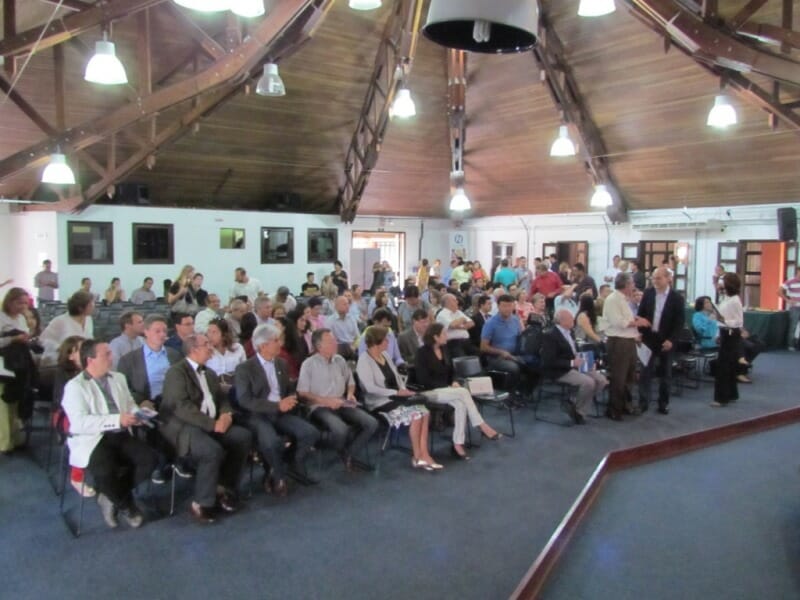
Mar 21, 2015 | Focolare Worldwide
 Saturday 14 March. The “Salão dos Atos” hall immersed in the greens of the Curitiba Barigui Park, was filled with Federal and State Deputies, Mayors, Councillors, Public Officers, youth and academics who came from the Amazon, the Northeast, Brasilia and other cities of Brazil.
Saturday 14 March. The “Salão dos Atos” hall immersed in the greens of the Curitiba Barigui Park, was filled with Federal and State Deputies, Mayors, Councillors, Public Officers, youth and academics who came from the Amazon, the Northeast, Brasilia and other cities of Brazil.
Unusual words echoed in the meeting hall: politics was presented as the “ love of loves” which urges Public Administrators to create projects that respond to the demands of the communities and gives citizens the possibility to achieve their own aspirations.» They all were reminded that «power that enforces but it is love that confers authority.» The word “fraternity” was often repeated, not only as the ethical principle of politics but as “its very substance.” These were the central points of Chiara Lubich’s thought which Maria Voce, President of the Focolare, cited in her message and which were deepened in the various speeches.
This vision of politics that Chiara herself had proposed years ago in the parliaments of the various countries, appeared today like a light in the crisis tunnel Brazil is undergoing. It stirred up new hope, because many testimonials testified to its implementation not only in Brazil, but also in other countries. An innovative panorama, presented in a documentary-video at the start of the event promoted by the Political Movement for Unity (MPPU) of the Focolare, on Chiara’s
The meeting took place simultaneously with two popular manifestations of opposite beliefs and many of the interventions underlined the political, economic and ethical crises, stressing the growing lack of faith in the institutions. «We have come as mediators, called to change this situation through dialogue and fraternity,», said Sergio Previdi, National President of the MPPU.
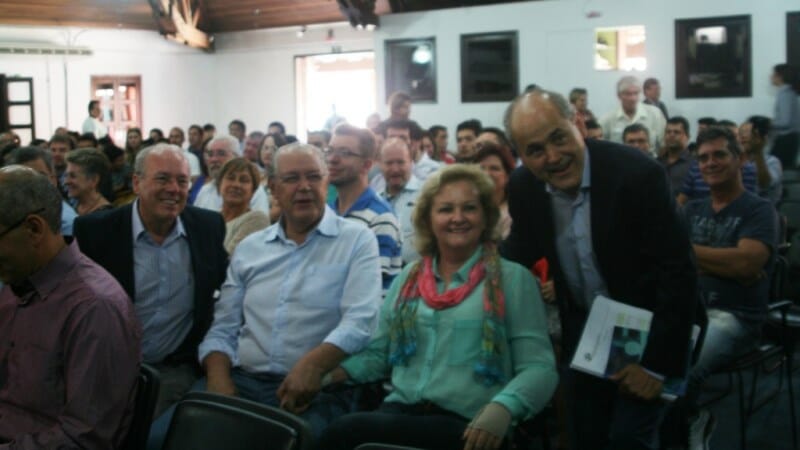 «This is a great challenge. Democracy is not only a technical fact, but needs a soul, We have to re-think politics in order re-humanize it,” affirmed Gustavo Fruet, Mayor of Curitiba. And he cited the innovative political culture of Chiara, which inspired the 2010-2030 programme to make Curitiba “a global innovator city,” already recognised as a model of sustainable planning and as the city of fraternity ».
«This is a great challenge. Democracy is not only a technical fact, but needs a soul, We have to re-think politics in order re-humanize it,” affirmed Gustavo Fruet, Mayor of Curitiba. And he cited the innovative political culture of Chiara, which inspired the 2010-2030 programme to make Curitiba “a global innovator city,” already recognised as a model of sustainable planning and as the city of fraternity ».
Many of the speeches of Councillors and Deputies of various political parties that try, not without effort, to actuate a politics that goes against the current, testified to how they draw from MPPU a “new strength and new commitment.”
«Fraternity means implementing a strategy of unity, seeking dialogue between the majority party and the opposition between institutions and societies, in the mutual effort to achieve common good», affirmed the Mayor of Sorocaba, Antonio Carlo Pannunzio.
Julio Carneiro of MPPU Brazil, mentioned the citadels founded by Chiara Lubich (more than 20as of today), as model-structures of a city, to testify to the impact fraternity has on civil coexistence..
«A new political culture that calls for new men and women», affirmed Prof. Marconi Aurélio Silva, highlighting the urgent need to train the youth in active citizenship, based on fraternity: «given that we are by nature relational beings and not isolated individuals » And he spoke of the many results achieved by the Civitas School in many states of Brazil and the world.
For further information consult: www.mppu.org.br – www.focolares.org.br
Mar 20, 2015 | Focolare Worldwide
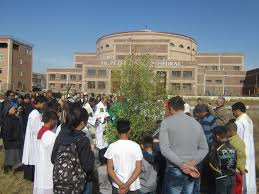
Mar 19, 2015 | Focolare Worldwide
 It is more than ten hours by plane from the Mongolian capital, Ulan Bator, to Daejeon, South Korea, but both cities belong to a single diocese. Outside the capital, the population density of Mongolia is two inhabitants per square kilometre. Christians comprise 2% of the population in a land with a Buddhist tradition of thousands of years (53%) and widespread atheism (29%).
It is more than ten hours by plane from the Mongolian capital, Ulan Bator, to Daejeon, South Korea, but both cities belong to a single diocese. Outside the capital, the population density of Mongolia is two inhabitants per square kilometre. Christians comprise 2% of the population in a land with a Buddhist tradition of thousands of years (53%) and widespread atheism (29%).
As the local church was wondering how it would care for the few Christians, it turned to the New Famlies of the Focolare Movement for help, finding that several Korean families were willing to share the Gospel message along with their witness to the spirituality of unity as it is lived in families. The parish of Ulan Bator has a social centre that welcomes children and teenagers for after-school programmes, a community farm and a free clinic. This is where the Focolare carries out its main mission. Let’s see what that mission is.
Two or three couples from Korea travel regularly to Mongolia, to visit parishes and meet with families. The main topic is families and how they apply the Gospel to their daily lives. This has brought about the transformation of couples and families in that land as well. They also meet with young people.
“Once, we brought medicines,” Cedam recounts. “The joy of the reverend sister was indescribable when we handed her the package: they were exactly the medicines she had been looking for, since her own had run out. Winter lasts for half the year in Mongolia. For months the temperature reaches -40°C, and so it is quite difficult to leave one’s home in search of the necessities. As the day approaches for our visit to Mongolia, the other families in the community gather provisions that can be taken along. One time we thought of taking footballs and basketballs so that the boys could play on the wide plains, but we needed to buy them and then there was the problem of geting them on the plane. . . One family had placed a money box in its shop to collect funds for the Mongolian families, and so we were able to buy not only balls, but also the equipment for inflating them.”
“The bishop is our driver,” Andrea continues. “He welcomes us at the bishop’s house, drives us to the parishes and encourages us to give with open hands our experiences as Christian families. We find that this is what families are most waiting to hear. The more we visit them, the more affection they express when we go back again. They also want to share how they have been living the Gospel. During one homily, in the presence of several congregations of sisters, the bishop said that we had been sent by God as misionaries and, calling us each by name, he described us as: my friends. Whenver we leave Mongolia, we feel like we are leaving a piece of our hearts behind. Because every time it’s like an experience of what the first Christian communities must have been like.”
![PRESET Eco-sustainability Project in Argentina]()
Mar 18, 2015 | Non categorizzato
In 1968 a race towards heaven by a young girl who found the secret of happiness. Her cause for beatification is currently underway.  Sixteen years old and always on the move. At breakneck speed. Her destination: heaven. Maria Orsola Bussone (October 2, 1954-July 10, 1970) came from Piedmonte, Italy. She loved the pop music of the 1960’s and was interested in student protests. She played guitar and was taking voice lessons. A teenager like all the others, she was in love with nature, sport and music. She jotted down some of her thoughts in a diary, had many friends and wrote letters to the closest ones. She was the simple daughter of an old world that seemed on the verge of being overthrown by the winds of modernism. But her apparently serene life as the child of a tiny village in the Alps of Piedmonte, was hiding an extraordinary soul. A clear and genuine faith. With the support of their priest, and spirituality that gave her a head start, together with other friends, she brought to fruition the guidlines of the Second Vatican Council. Mariolina went into fourth gear and, in a short time, went through all the stages. In 1968 she was invited by the priest don Vincenzo Chiarle to take part in the first Gen congress, the new generation of the Focolare Movement. There Chiara Lubich presented to the youths of the 60’s another revolutionary model: that of a just man, who allowed himself to be immolated for the liberation of others. He also had his program: “That all be one”. Maria Orsola was fascinated, and this became the light of her life. When she was sixteen years old, her young life came to an abrupt end. But she left a stream of light behind her. She once revealed that she would give up her life, if that would help young people to discover God’s beauty. “And God took her at her word”, said John Paul II, speaking to thousands of her fellow citizens in Turin in 1988: “She accepted to transform her life into a gift, not a selfish possession” . “Hooray for life” was her motto.
Sixteen years old and always on the move. At breakneck speed. Her destination: heaven. Maria Orsola Bussone (October 2, 1954-July 10, 1970) came from Piedmonte, Italy. She loved the pop music of the 1960’s and was interested in student protests. She played guitar and was taking voice lessons. A teenager like all the others, she was in love with nature, sport and music. She jotted down some of her thoughts in a diary, had many friends and wrote letters to the closest ones. She was the simple daughter of an old world that seemed on the verge of being overthrown by the winds of modernism. But her apparently serene life as the child of a tiny village in the Alps of Piedmonte, was hiding an extraordinary soul. A clear and genuine faith. With the support of their priest, and spirituality that gave her a head start, together with other friends, she brought to fruition the guidlines of the Second Vatican Council. Mariolina went into fourth gear and, in a short time, went through all the stages. In 1968 she was invited by the priest don Vincenzo Chiarle to take part in the first Gen congress, the new generation of the Focolare Movement. There Chiara Lubich presented to the youths of the 60’s another revolutionary model: that of a just man, who allowed himself to be immolated for the liberation of others. He also had his program: “That all be one”. Maria Orsola was fascinated, and this became the light of her life. When she was sixteen years old, her young life came to an abrupt end. But she left a stream of light behind her. She once revealed that she would give up her life, if that would help young people to discover God’s beauty. “And God took her at her word”, said John Paul II, speaking to thousands of her fellow citizens in Turin in 1988: “She accepted to transform her life into a gift, not a selfish possession” . “Hooray for life” was her motto.

Since 2 October 2004, Maria Orsola’s remains repose in the Parish Church of Vallo Torinese.
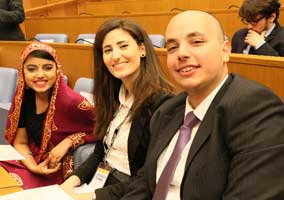
Mar 18, 2015 | Focolare Worldwide, Senza categoria

Lara Abou Moussa and George Zahm
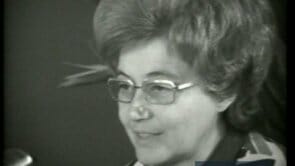
Mar 17, 2015 | Non categorizzato
 “Dearest Gen, I’m sure that what you’re expecting from me is a formula that sums up everything, that illustrates the truth and gives you the recipe to live a meaningful life. It’s actually something I’m meditating on during these days. I’m totally convinced that the only sure way to reach perfection is to follow the path of suffering embraced out of love. This is how the saints, throughout the centuries, perceived it. The fact is that to those who wished to follow him, Jesus spoke clearly: “Those who wish to become my disciples, let them deny themselves, take up their cross and follow me” (Mk 8:34). “…take up their cross.” Each of us, in order to follow Him, the Perfect One, needs to embrace our own cross, our own sufferings. We all have them, there’s no doubt about it. So let’s get up in the morning with a new heart, despite our human desire to put suffering aside and forget about it. Christians are asked to go that little bit further. Because they are followers of Christ, they know that suffering is precious, that it should be accepted as Jesus accepted the cross, and so they try to embrace it wholeheartedly. What will be the outcome? What will be the fruits? We will be rewarded with patience, purity, meekness, poverty, temperance and so forth. And along with all these virtues, we will attain perfection, the real life. Are you willing to give it a try? Every athlete who aims high must be willing to experience fatigue, sacrifices and struggles. Our goal is Jesus. In order to follow Jesus, we need to appreciate suffering. This is my ardent wish for you, that you may experience how to be worthy of Him.”
“Dearest Gen, I’m sure that what you’re expecting from me is a formula that sums up everything, that illustrates the truth and gives you the recipe to live a meaningful life. It’s actually something I’m meditating on during these days. I’m totally convinced that the only sure way to reach perfection is to follow the path of suffering embraced out of love. This is how the saints, throughout the centuries, perceived it. The fact is that to those who wished to follow him, Jesus spoke clearly: “Those who wish to become my disciples, let them deny themselves, take up their cross and follow me” (Mk 8:34). “…take up their cross.” Each of us, in order to follow Him, the Perfect One, needs to embrace our own cross, our own sufferings. We all have them, there’s no doubt about it. So let’s get up in the morning with a new heart, despite our human desire to put suffering aside and forget about it. Christians are asked to go that little bit further. Because they are followers of Christ, they know that suffering is precious, that it should be accepted as Jesus accepted the cross, and so they try to embrace it wholeheartedly. What will be the outcome? What will be the fruits? We will be rewarded with patience, purity, meekness, poverty, temperance and so forth. And along with all these virtues, we will attain perfection, the real life. Are you willing to give it a try? Every athlete who aims high must be willing to experience fatigue, sacrifices and struggles. Our goal is Jesus. In order to follow Jesus, we need to appreciate suffering. This is my ardent wish for you, that you may experience how to be worthy of Him.”
Chiara Lubich
(translation of the Italian text taken from “Gen,” October-November 1979)
Centro ChiaraLubich

Mar 17, 2015 | Focolare Worldwide

6 weeks of preparatory work, 34 actors and an audience of 250 people 36 thousand rupees gathered, equivalent to about €500 which is quite remarkable, considering that the sum will allow 10 adolescents of the city to participate in the 5-day programme to be held in Mumbai.
The Focolare has been in India from 1980. Today there are centres in Mumbai, Bangalore, Goa and New Delhi that promote various activities: Mariapolis, monthly meetings for adults, families and the youth. In various cities –Vasai, Pune, Panjim, Margao, Vasco, Trichy – there are active groups that have adhered to the spirit of the Focolare.
This year, the great goal ahead regards the United World Week (SMU), annual appointment of the Youth for a United World with the objective of diffusing the steps undertaken towards fraternity in various parts of the world.
The SMU 2015 transits through India. As occurred last year in Africa, the event that highlighted the Ubuntu concept, this time the event will focus on the subcontinent, cradle of an enormous variety of ethnic and religious groups that will host the main event of the week in Mumbai, from27 April to1st May, to conclude in Coimbatore, Tamil Nadu (southern India), on 4 May.
Already in 2009 Coimbatore had hosted the “Gen 3 Supercongress”, with adolescents from all over the world, and with the cooperation of the Gandhian movement Shanti Ashram.
As can be imagined there was an enormous load of work for the preparations of all the details- Due to this the entire Focolare Community of the city has decided to roll up their sleeves and support the youth in this initiative.
A first concrete job was to prepare their own musical “The brook in the woods,” staged last 22 February. A story that begins with the message of unity which the Gen4 (the children of the Focolare Movement) sing about. Rehearsals, performed with enthusiasm and commitment by the children, and even with some unexpected problems that came up: the day before musical two of them got sick with high fever and the authors had to change the lyrics!
“My children are so happy!” a mother explained, They made new friends and say that they miss the rehearsals., even more than their schoolmates, because they were so happy to be together.”
“Even if the children are talented in song or dance,” another mother said, “it’s so nice to see these talents used for a beautiful and valuable cause.”
भारत की ओर से आप सभी को बधाई (Bharat ki ora se aap sabhi ko badhai)
Greetings from India!





























 His story is connected to Small Bumbuna, a village in the Diocese of Makeni, 200 miles from Kailahum where the epidemic began. “The illness spread like the fire in dry season, in Sierra Leone. With the first victims we thought of cholera, evil spirits or other superstitions. The response from the medical team was slow: it took weeks to confirm that we were dealing with Ebola. We would have wanted to visit the people from our parish in another village, but the fear was too strong. The district medical team was not able to monitor the situation and send supplies. It was difficult to access roads.” Faced with so many difficulties, Father Peter, followed by his parishioners, made: “a radical decision that brought us face to face with the Ebola,” he recounts. “We found the city deserted when we arrived. The village chief described the terrible situation. The loss of hope was clear on his face, along with impossibility of doing anything.” From there we stepped into non-stop action that involved the highest levels of authority. Father Peter was invited as “guide” to deal with the population, explaining how to stem the spreading and allow themselves to receive medical treatment. “I took on these risks,” Father Peter concluded, “because these people are my community. How could I desert them in such a moment of painful suffering? This question helped me to identify with them, to bring the problem before the authorities, and to offer myself as a guide. I learned that nothing is too small to be offered, nor too heavy to be taken up. Let us continue to pray that the epidemic may be totally eradicated and we can return to normal life.” In the course of two weeks, the danger came under control and people were able to return to their farming activities.
His story is connected to Small Bumbuna, a village in the Diocese of Makeni, 200 miles from Kailahum where the epidemic began. “The illness spread like the fire in dry season, in Sierra Leone. With the first victims we thought of cholera, evil spirits or other superstitions. The response from the medical team was slow: it took weeks to confirm that we were dealing with Ebola. We would have wanted to visit the people from our parish in another village, but the fear was too strong. The district medical team was not able to monitor the situation and send supplies. It was difficult to access roads.” Faced with so many difficulties, Father Peter, followed by his parishioners, made: “a radical decision that brought us face to face with the Ebola,” he recounts. “We found the city deserted when we arrived. The village chief described the terrible situation. The loss of hope was clear on his face, along with impossibility of doing anything.” From there we stepped into non-stop action that involved the highest levels of authority. Father Peter was invited as “guide” to deal with the population, explaining how to stem the spreading and allow themselves to receive medical treatment. “I took on these risks,” Father Peter concluded, “because these people are my community. How could I desert them in such a moment of painful suffering? This question helped me to identify with them, to bring the problem before the authorities, and to offer myself as a guide. I learned that nothing is too small to be offered, nor too heavy to be taken up. Let us continue to pray that the epidemic may be totally eradicated and we can return to normal life.” In the course of two weeks, the danger came under control and people were able to return to their farming activities.


 I went to the morgue where they were taking the bodies of the students for identification, not far from my home in Nairobi. I took my camera along. It was impossible not to hear the sirens. I found the parents of the murdered students fainting on one side. . . and on ther other my colleagues with news cameras. I could certainly have shot a few interviews, but I just couldn’t do it; I found myself weeping with the families. There was strong pressure from all sides, opinions from the public who were anxious for news. But I needed time to digest the painful situation in order to be able to say something that would be constructive. I felt my task was to remain quiet with this pain and resist the pressure.”
I went to the morgue where they were taking the bodies of the students for identification, not far from my home in Nairobi. I took my camera along. It was impossible not to hear the sirens. I found the parents of the murdered students fainting on one side. . . and on ther other my colleagues with news cameras. I could certainly have shot a few interviews, but I just couldn’t do it; I found myself weeping with the families. There was strong pressure from all sides, opinions from the public who were anxious for news. But I needed time to digest the painful situation in order to be able to say something that would be constructive. I felt my task was to remain quiet with this pain and resist the pressure.” 


 “At the end of one conference, one of my scholastic colleagues showed me three photos of some ex-students of the University who had been killed in the conflict in the south of the country. With eyes filled with tears, he told me that every evening after lessons, a group of students gathers in the cafeteria of the university to cook Ukrainian dishes, which are then frozen and delivered to soldiers. Annother woman told me about her six year-old son who draws cartoons and sends them to soldiers, as a sign of thanks for defending his country. Unfortunately, unlike last year, the news is no longer reporting on what is taking place in Ukraine. Yet, there is actually a war underway in East Ukraine.” There seems to be no way out of the situation that is generating suffering and suspense in the hearts of the people. . . “I had living proof of this deep suffering during every moment of my stay in Ukraine. Students and professors asked me what I thought about the situation in the country and, above all, what the rest of Europe was saying. I didn’t have the nerve to express judgements. Faced with their fear and suffering I preferred to listen and stay silent. I was impressed by the strength and dignity of that people, but it also frightened me that the rest of Europe and of the world have abandoned them to their fate, aggravated also by the growing nationalism, another phenomenon that could be hiding large dangers for the future.”
“At the end of one conference, one of my scholastic colleagues showed me three photos of some ex-students of the University who had been killed in the conflict in the south of the country. With eyes filled with tears, he told me that every evening after lessons, a group of students gathers in the cafeteria of the university to cook Ukrainian dishes, which are then frozen and delivered to soldiers. Annother woman told me about her six year-old son who draws cartoons and sends them to soldiers, as a sign of thanks for defending his country. Unfortunately, unlike last year, the news is no longer reporting on what is taking place in Ukraine. Yet, there is actually a war underway in East Ukraine.” There seems to be no way out of the situation that is generating suffering and suspense in the hearts of the people. . . “I had living proof of this deep suffering during every moment of my stay in Ukraine. Students and professors asked me what I thought about the situation in the country and, above all, what the rest of Europe was saying. I didn’t have the nerve to express judgements. Faced with their fear and suffering I preferred to listen and stay silent. I was impressed by the strength and dignity of that people, but it also frightened me that the rest of Europe and of the world have abandoned them to their fate, aggravated also by the growing nationalism, another phenomenon that could be hiding large dangers for the future.” 




























 Chiara was ever faithful to her Church. And in this conviction, she felt the drama of the division, of the impossibility to receive from the same Chalice.
Chiara was ever faithful to her Church. And in this conviction, she felt the drama of the division, of the impossibility to receive from the same Chalice.











